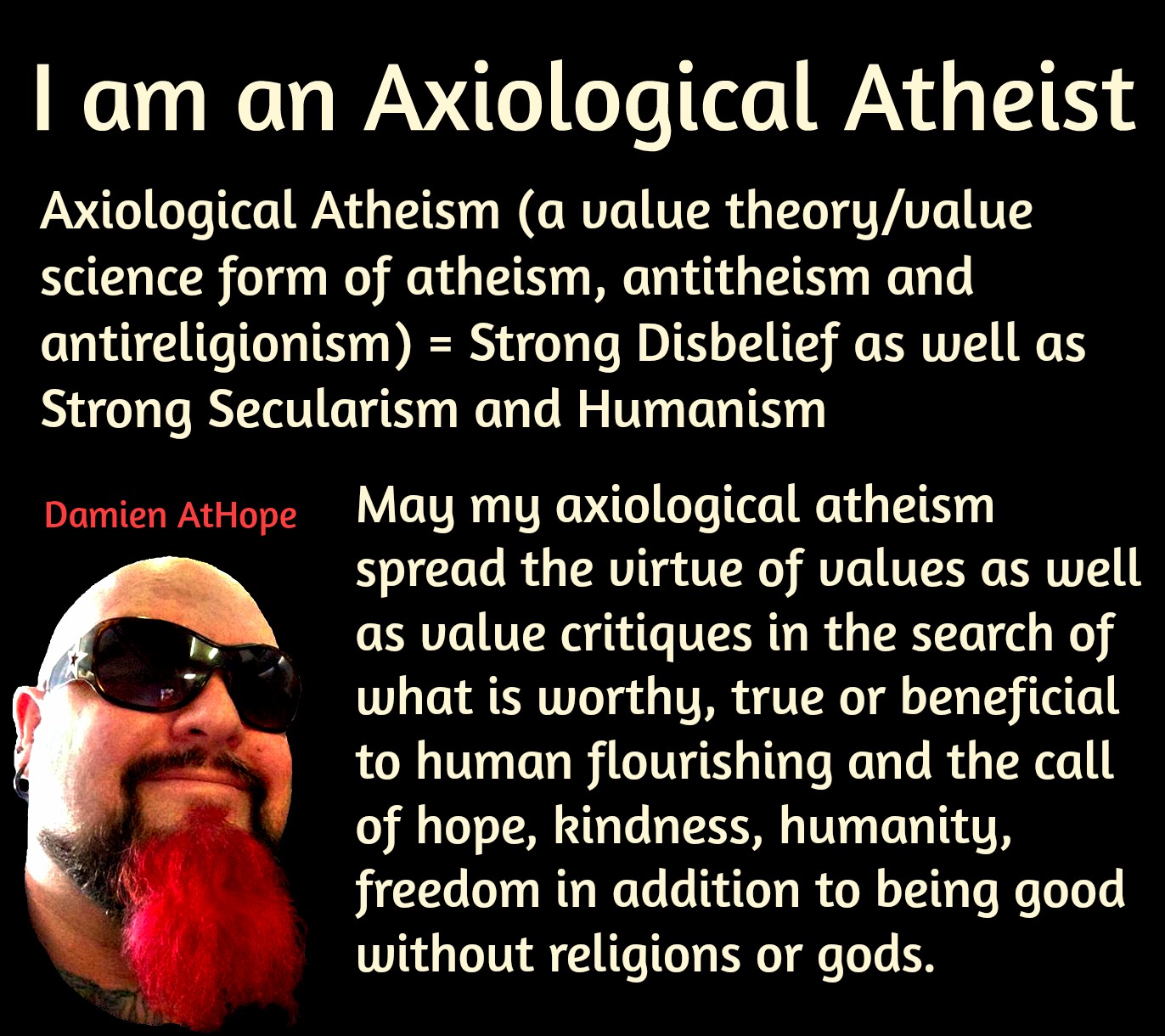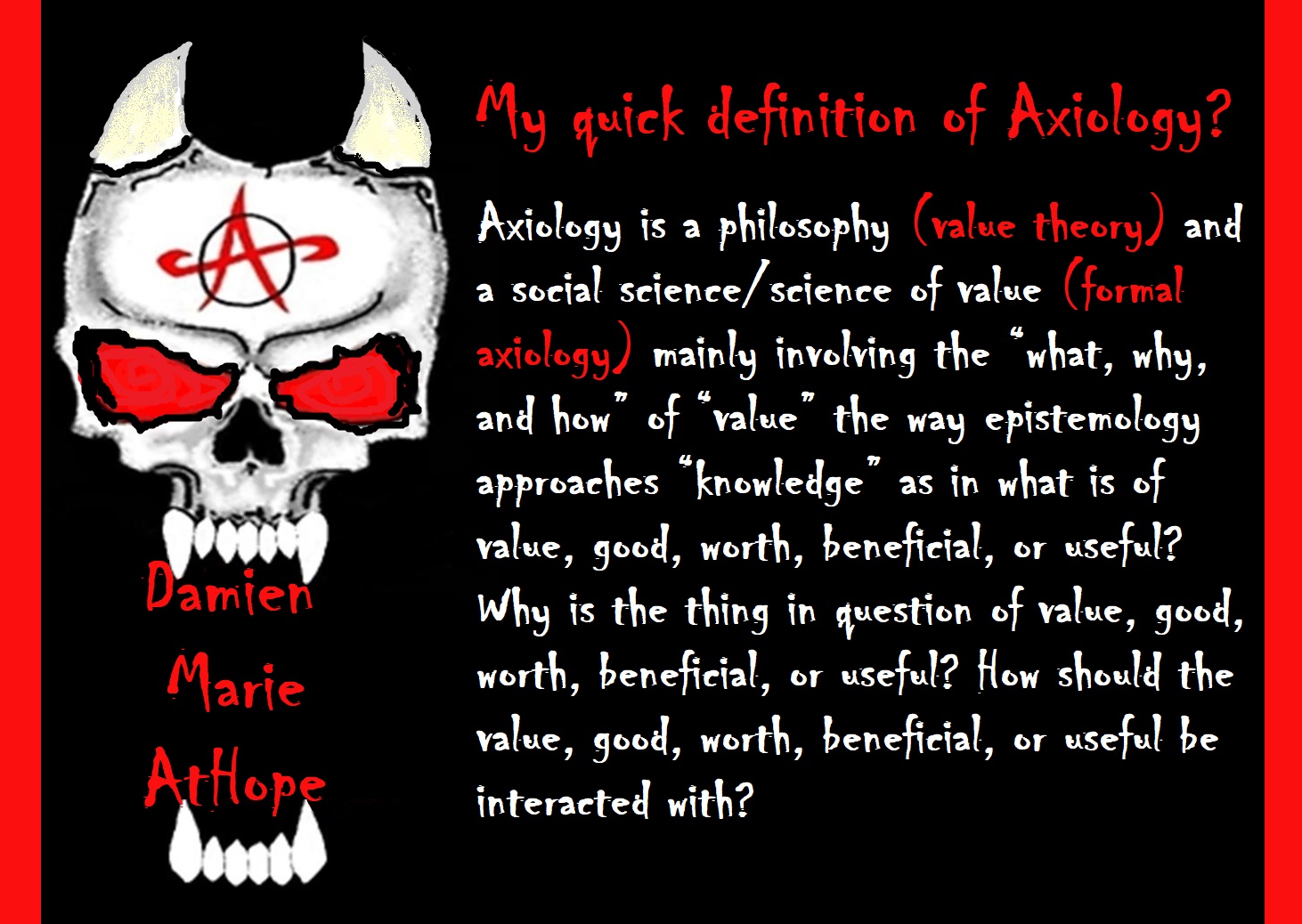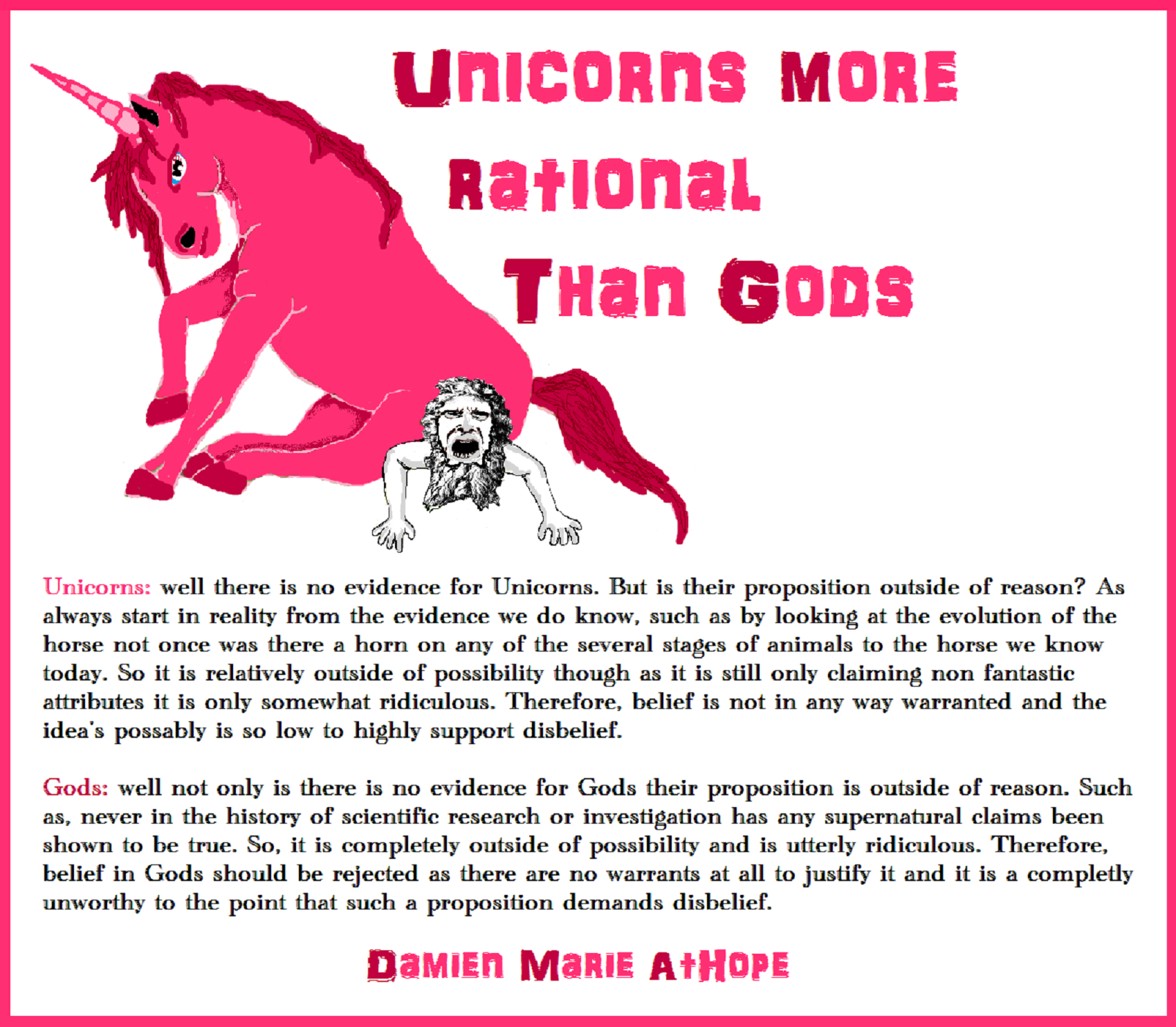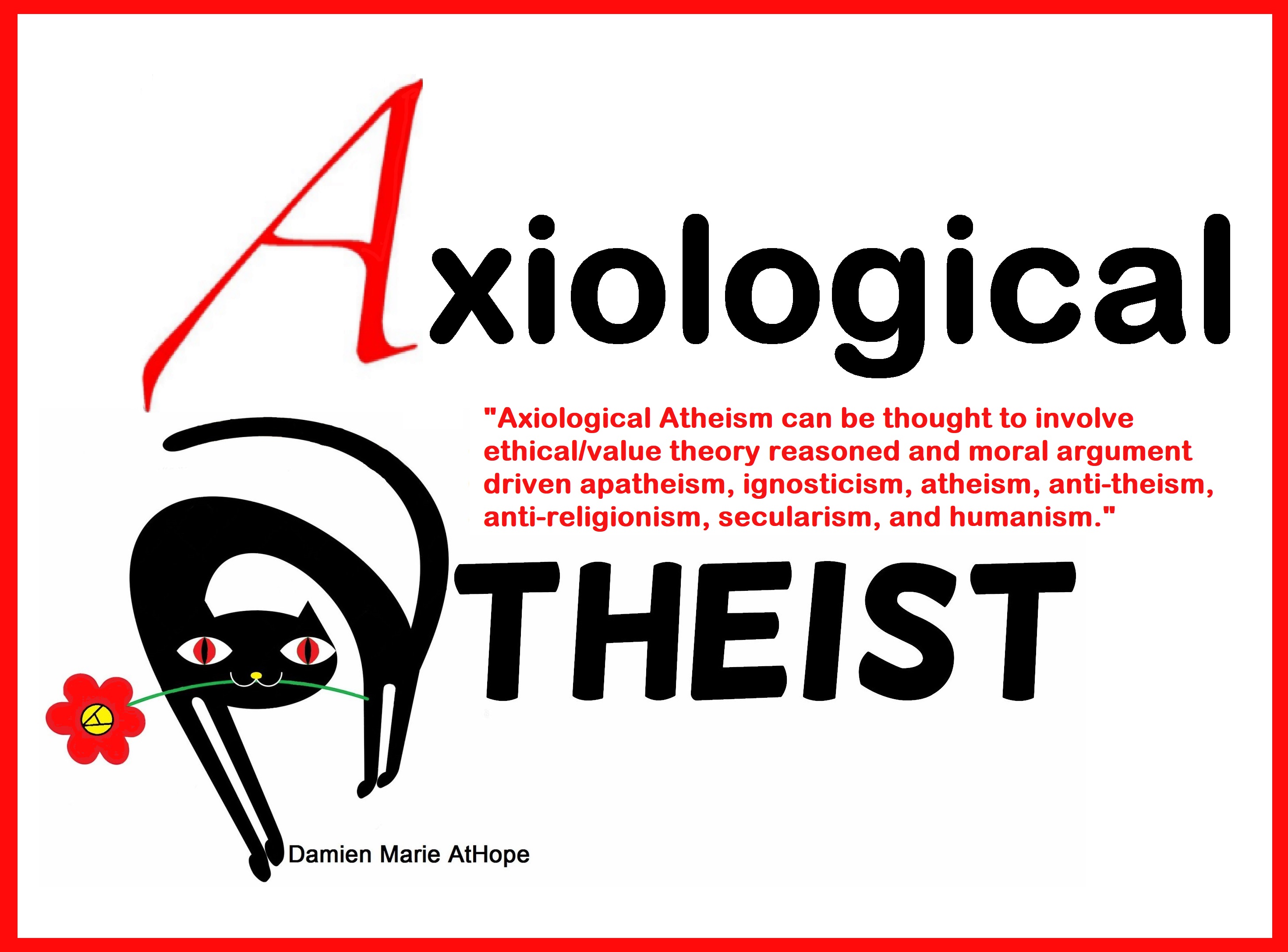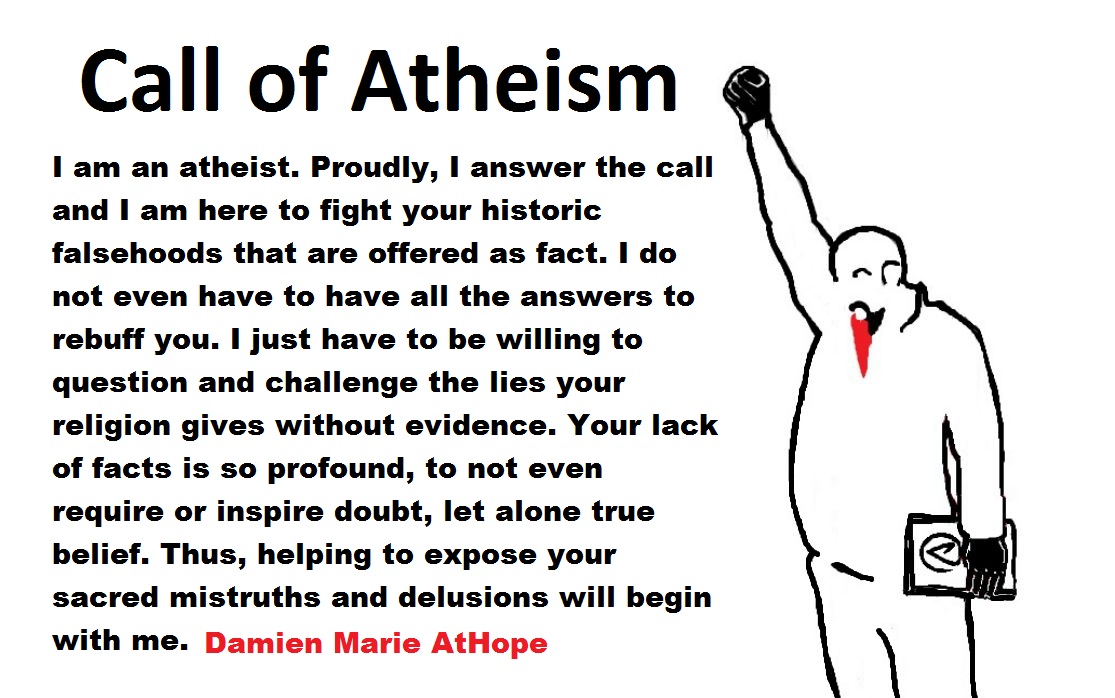If a god anything was real and good it would not be the harmful world we have. Therefore, no god is good but as gods are often claimed as good, so no such gods exist. This is an axiological atheist argument also called the argument from evil.
Axiological theism: is the thinking a god(s) or goddess(es) are real as well as valuable and we are enriched (all value, truth, morality are deity involved) because there is such a being(s) and we should worship it and would be worse off if such a being(s) did not exist (life would have no meaning, worth or value and there would be no way to judge morality)
Axiological agnosticism: is the thinking I do not know if a such being as god(s) or goddess(es) exist neither can we evaluate the value and we thus lack the basis to value judge what benefits or harm they may encompass and such would probably not worship such a being(s) as we do not know if we should or should not. Likewise, we cannot form an opinion as to if we are better or worse if such a being(s) existed.
Axiological atheism: is the thinking that no god(s) or goddess(es) exist and they lack all worth and value to humans even if they existed. Such myth should be rejected in favor of believing in humanity, seeing secularism and humanism as a kind of “higher absolute” such as humanity, formal axiology, or naturalistic or universal ethical principles. My stating a kind of “higher absolute” is not stating a belief n some absolute morality instead it is meaning nothing but naturalistic human-centered morality is used or form of valued good is derived from a rational thinking by humanity (Ie. humanity as the absolute source of ethics and values, and permits individuals to resolve moral problems without resorting to god myths or religious philosophies). Axiological atheism would tend to value Formal Axiology (Scientific Axiology/Scientific Value Theory) takes a realistic, or fact-based, view of the world when assessing or understanding value/good/worth. Formal axiology understands that people have and act upon values. Scientific axiologists will seek to understand what those values are, and to analyze their structure. That empirical orientation is why scientific axiology can serve as the formal side of the yet to be developed value sciences. To illustrate this value realism, suppose a theist states they love god(s). Since the science of value has an empirical orientation, a value scientist would see the theistic belief in god(s) not as some actual existing being, instead, understand it as a conception in the mind of theist, not anything realistic or fact-based. Axiological Atheism is like humanistic anti-theism and anti-religionism with strong secularism. Ref
Moreover, an axiological atheist could be thought of as thinking no gods no masters and thus would never worship a god or any being especially if it was by threat, force or the act of coercing to any extent. An axiological atheist may even question if any being is worthy of the title god or be ignostic that every theological position assumes too much about the concept of god and see this as extending to other theological concepts; including (but not limited to) concepts of faith, spirituality, heaven, hell, afterlife, damnation, salvation, sin and the soul. Thus regarding that as ridiculous and not worthy at all and should be shown Ridicule and Disdain. Therefore as you can guess they would say we are better off that no god(s) or goddess(es) existed and it would be much worse if they did.
Axiological attitudes toward God’s existence are axiological theism (thinking God’s existence to be a good thing), axiological atheism (thinking God’s existence to be a bad thing), and axiological agnosticism (indifference toward God’s existence). Issues in the Philosophy of Religion an axiological approach
Philosophic Axiology (value theory) and Scientific Axiology (formal axiology)
*(axiology as philosophy) value theory/the theory of values, meta-ethics/morality or aesthetics:
“Value theory encompasses a range of approaches to understanding how, why, and to what degree persons value things; whether the object or subject of valuing is a person, idea, object, or anything else. Intuitively, theories of value must be important to ethics. This investigation began in ancient philosophy, where it is called axiology or ethics.” Ref
*(axiology as science) formal axiology/the theory of values, meta-ethics/morality or aesthetics:
“Formal axiology is a branch of axiology in general. Axiology in general or “as such” is value theory in all its ramifications, ranging from meta-theory to ethics, aesthetics, logic, and any other dimension of human interest that involves questions of good and evil, right and wrong, correctness or incorrectness, beauty and ugliness, truth and falsity, and every other conceivable value issue, dimension, or interest. Formal axiology, focuses initially upon the most formal features of human values, then upon applications of these formalities to the concrete details of what we value (values) and how we value (valuations). Robert S. Hartman created a logically abstract (he would say “synthetic”) to features of all human values and valuations; the formal definition of “good” or “value,” which he regarded as the “axiom” of formal axiology — Good is concept (or standard) fulfilment, the three basic kinds of value, intrinsic, extrinsic, and systemic, the hierarchy of value, where the three basic kinds of value are themselves ranked with respect to their relative worth, an association of the three basic kinds of value with set theory and transfinite mathematics.” Ref
axiology/axiologist: noun, axiological: adjective, axiologically: adverb
Axiological atheism: (Ethical/Value theory Reasoned and Moral Argument driven) Atheism, Anti-theism, Anti-religionism, and Secular Humanism. Roughly understood axiological atheism = Strong Disbelief as well as Strong Secularism and Humanism.
I am an Axiological Atheist, which roughly can be understood as a value theory or value science Atheist. Axiology to Atheism is also meant to denote an atheistic rejection of the existence of gods or supreme beings in favor of a “higher absolute” such as humanity, formal axiology, or naturalistic or universal ethical principles. My stating a kind of “higher absolute” is not stating a belief in some absolute morality, instead it is meaning nothing but naturalistic human-centered morality is used or forms of valued good is derived from a rational thinking by humanity (Ie. humanity as the absolute source of ethics and values, and permits individuals to resolve moral problems without resorting to god myths or religious philosophies). Axiological Atheism can be thought to involve ethical/value theory reasoned and moral argument-driven atheism, anti-theism, anti-religionism, ignosticism, apatheism, secularism, and humanism. I am anthropocentric as an Axiological Atheist. I see human value as above all other life’s value. Some say well, we are animals so they disagree with my destination. But how do the facts play out? So you don’t have any difference in value of life?
So a bug is the same as a mouse, a mouse is the same as a dolphin, a dolphin is the same as a human, all to you have exactly the same value? You fight to protect the rights of each of them equally? And all killing of any of them is the same crime murder? I know I am an animal but you also know that we do have the term humans which no other animal is classified. And we don’t take other animals to court as only humans and not any other animals are like us. We are also genetically connected to plants and stars and that still doesn’t remove the special class humans removed from all other animals. A society where you can kill a human as easily as a mosquito would simply just not work ethically to me and it should not to any reasonable person either. Anthropocentrism (from Greek ánthrōpos, “human being”; and kéntron, “center”) the belief that considers human beings to be the most significant entity of the world and interprets or regards the world in terms of human values and experiences.
Formal Axiology (Scientific Axiology/Scientific Value Theory) takes a realistic, or fact-based, view of the world when assessing or understanding value/good/worth. Formal axiology understands that people have and act upon values. Scientific axiologists will seek to understand what those values are, and to analyze their structure. That empirical orientation is why scientific axiology can serve as the formal side of the yet to be developed value sciences. To illustrate this value realism, suppose a theist states they love god(s). Since the science of value has an empirical orientation, a value scientist would see the theistic belief in god(s) not as some actual existing being, instead understand it as a conception in the mind of theist not anything realistic or fact-based. Ref
In my opinion, when it comes to the god concept, an axiological atheist would start with ignosticism which is rejecting the concept of gods because the god concept and the term god has no meaning nor anything in reality to attach its meaning to. Thus, god is not any different than any other made-up three word such as fod, which has no meaning as a real thing. If an axiological atheist were asked how important it is to disprove a god or even care about the god question, they would simply not care since the question is meaningless such as looking for an invisible pink unicorn or the jolly green giant. Thus, an axiological atheist could be seen as using apatheism, unless they are under serious challenge or feeling a need to challenge theists or religious believers. An axiological atheist would thus not believe in a god in any way and likely, this would be called strong atheism. An axiological atheist is more than simply an atheist since axiological atheism sees the god concept as fake or not real and harmful to a free humanity. Thus, an axiological atheist takes an active opposition to theism and their fake gods, and even if some god(s) are found to somehow be real then an axiological atheist would start hating that real god and until then, they will hate all manmade god concepts.
Furthermore, an axiological atheist would most likely hate religions for some of the same reasons it opposes god(s) and thus, will be an anti-religionist who sees that religions on the whole to be harmful to humanity. However, an axiological atheist is not against people whether they believe in god concept or religion, they center their hate on harmful ideas such as gods or religions. This hate towards harmful ideas is motivated from a deep ethical care for humanity and thus involves humanism. So, axiological atheism is a humanistic philosophical and ethical stance which emphasizes individually and collectively, the value and agency of human beings and prefers critical thinking and evidence (rationalism, empiricism) over any kind of established doctrines (holy books) or faith (fideism). Moreover, even with axiological atheism’s extremely strong opposition to gods and religion, it does value every person’s self-right to define beliefs for themselves and thus, supports secularism (freedom for religion and freedom from religion), protects the religious and nonreligious as well as antireligious from governmental interference and protect the government from the religious, nonreligious as well as antireligious. That being said axiological atheism would like beliefs in gods or religions to be demoted to where they are seen as little more than fantasy or myths but are somewhat harmful and certainly not safe for children.
Axiological atheism: (is thinking that a god’s existence to be a bad thing)
Axiological atheism is the thinking that no god(s) or goddess(es) exist and they lack all worth and value to humans even if they existed. Such myth should be rejected in favor of believing in humanity, seeing secularism and humanism as a kind of “higher absolute” or form of valued good. (Ie. humanity as the absolute source of ethics and values, and permits individuals to resolve moral problems without resorting to god myths or religious philosophies).
An axiological atheist could be thought of as thinking no gods no masters, and thus would never worship a god or any being especially if it was by threat, force, or the act of coercing to any extent. An axiological atheist may even question if any being is worthy of the title god or be ignostic that every theological position assumes too much about the concept of god and see this as extending to other theological concepts; including (but not limited to) concepts of faith, spirituality, heaven, hell, afterlife, damnation, salvation, sin and the soul. Thus regarding that as ridiculous and not worthy at all and should be shown Ridicule and Disdain. Therefore as you can guess they would say we are better off that no god(s) or goddess(es) existed and it would be much worse if they did.
Axiological Atheist, can be understood as a value theory or value science Atheist.
As such axiological atheism’s ethically reasoning is constructive and pro-humanity. We who believe we are thinking rational, leading to opposition or hate of religion may that be limited to the nonfactual or oppressive ideology and not the people. Beyond just not being something let’s be something, rational thinking should challenge myths but also prove our love for humanity and care for all living beings. In most cases, Axiological atheism would assert the traditional concept of “Atheism” answers only a single question: Is there a creator god or not? That is an important question, but if your answer is “no”, it is only a starting point and not a way of life.
You may have reached that viewpoint based on your respect for logic, evidence, science, and personal experience which too are vital values. Yet, after you have reached that initial “no god” answer, all the other important questions in life, all the options for mental and emotional wholeness and social and environmental harmony, ethics and morality, personal fulfillment, social values, philosophy, and psychology remain open. That is where “Axiological Atheism” holds a connection to both further challenging the god concept and devaluing religion and adding a value meaning and ethical axiological ideology to guide universally desirable secular ethical way of being or a value driven life lived in this reality.
What is Axiology, Formal Axiology & Axiological Profiling?
Axiology is the name for “value theory.” It is derived from the Greek word “axios” meaning “worth.” Formal axiology is the logic-based science of value anchored in a “hierarchy of meaning” from the most meaningful or richest value to the most destructive or greatest value loss. The logic specifies 18 different levels of richness. Hartman’s “hierarchy of value” is the mathematical measuring standard for human evaluative judgment and decision-making in life and in all social sectors of life in our culture.
When people make value judgments, they use both their mental and emotional capacities to arrive at their decision. Some people have very solid and reliable decision-making abilities – while others routinely make wrong or inaccurate choices. Axiological profiles measure the quality of the respondent’s judgment and decision-making by gauging both their mental clarity and their emotional orientation & conditioning.
Dr. Leon Pomeroy in his book, The New Science of Axiological Psychology (Pomeroy, 2005), has shown that formal axiology is also empirically valid. Thus, in our axiological assessment profiles we have the solid support of both scientific methods: the deductive logic-based axiomatic method and the inductive, empirical method. Dr. Pomeroy spent over 20 years collecting statistical data for his book cross-nationally, from numerous and diverse eastern and western countries and cultures, and proving that cultures all over the world make value judgments in the same way.
Neuro‐Axiology: merges Neuroscience understanding how the brain works with Axiology’s formal science that makes possible the objective measurement of value how humans make value judgments. (You will ALWAYS choose what you think adds the MOST value to your life.) Accepting the standard of the neuroscientific model of consciousness means that everything we think, feel, remember, and do is a function of the brain. This includes the emotion of empathy. We are not empathic because it makes sense to be empathic – meaning that most humans don’t simply reason their way to empathy. Nor do we simply learn empathy (although brain development is an interactive process with the environment, so we can’t rule out environmental influences). For the most part, we have empathy because our brains are wired with empathy as a specific function.
Like every function of the body you can think of, if it is not essential for survival then some subset of the human population likely has a disorder or even absence of this function. We recognize the biological limits of empathy or the absence of empathy as the disorder, psychopathy. It is estimated that about 1% of the general population are psychopaths, while about 20-30% of the US prison population. Dr. Robert S. Hartman discovered that people hold back a 40% latent reserve of cooperation and productivity until they have been valued as human beings.
Axiology is the science of how humans value and make value judgments as well as how they relate to ethics (not moral values often religious or culture relative).
The basics of Axiology are in its 3 Classes of Value and 6 “Advisors”. The following are the Classes of Value:
1. Systemic: plans, rules, best practices, procedures; ideas or expectations
2. Extrinsic: practical or situational; measurable, tracked; tasks (tangible)
3. Intrinsic: personal or transcendent; infinitely valuable; irreplaceable; human beings (intangibles)
The following are the 6 Advisors which consist of 2 views of one inward and one outward and one must remember people are neither their thoughts nor their advisors.
1. World View: Empathy-Intuition “people”, Practical Judgment “tasks, & Systems Thinking “plans & ideas”
2. Self View: Self-Esteem “who you are”, Role Awareness “what you do,” & Self Direction “where you go”.
The word “Axiological” (to the term “Axiological atheism” is meant to denote an atheistic “Value” rejection of the existence of gods or supreme beings and in favor of a “higher absolute” such as humanity or universal ethical principles. The perception of moral obligation removed from ethical sensitivity to universal justice [is] thus unintelligible as “higher absolute”. As a form of atheism, Axiological favors humanity as the absolute source of holistic ethics and care values which permits individuals to resolve moral problems without resorting to a god’s moral obligation which is anti-humanity and not needing to connect to equal justice. Axiological Atheism can be seen as ethically reasoned antitheism and antireligionism where it is all about axiology values that underlie the universal truths. A few examples of universal truths such as there is no such thing as just rape, no honorable thoughtful unwanted torture, and no just humanistic caring abuse of the innocent. You can offer excuses but the true values violations hold true. Axiologists are broadly concerned with all forms of value including aesthetic values, ethical values, and epistemic values. In a narrow sense, axiologists are concerned with what is intrinsically valuable or worthwhile—what is desirable for its own sake. All axiological issues are necessarily connected to ontological and epistemological assumptions.
Axiology in Axiological Atheism can be seen as applying science of morality, referring to its ethically naturalistic views basing morality on rational and empirical consideration of the natural world. The idea of a science of morality has been explored by writers like Joseph Daleiden in The Science of Morality: The Individual, Community, and Future Generations or more recently by neuroscientist Sam Harris in the 2010 book The Moral Landscape. Harris’ science of morality suggests that scientists using empirical knowledge, especially neuropsychology and metaphysical naturalism, in combination with axiomatic values as “first principles”, would be able to outline a universal basis for morality. Harris and Daleiden chiefly argue that society should consider normative ethics to be a domain of science whose purpose amounts to the pursuit of flourishing (well-being). “Science” should not be so narrowly defined as to exclude important roles for any academic disciplines which base their conclusions on the weight of empirical evidence. The term “science of morality” is also sometimes used for the description of moral systems in different cultures or species.
The axiological movement emerges from the phenomenological method. The axiologists sought to characterize the notion of value in general, of which moral value is only one species. They argue against Kant, that goodness does not exclusively derive from the will, but exists in objective hierarchies. They emphasize the extent to which it is through emotions and feelings that human beings discern values. The notion of right action is understood derivatively in terms of the values which emotions reveal. Evolutionary psychology seems to offer an account of the evolution of our “moral sense” (conscience) that dispenses with any reference to objective values. Its apparent elimination of objective values on the grounds of their being unneeded in explanation has led the skeptical writings of J.L. Mackie and Michael Ruse. By contrast, Robert Nozick has resisted this interpretation of evolution (1981) arguing that an evolutionary account of the moral sense can no more dispense with values than an evolutionary account of perception can dispense with perceptual objects objectively present in the world. Axiologists in contemporary ethics are Platonists such as Iris Murdoch and Neo-Kantian theorists such as John Rawls and Robert Nozick.
“Freethought is a philosophical viewpoint that holds that opinions should be formed on the basis of science, logic, and reason, and should not be influenced by authority, tradition, or other dogmas. Freethinkers strive to build their opinions on the basis of facts, scientific inquiry, and logical principles, independent of any logical fallacies or intellectually limiting effects of authority, confirmation bias, cognitive bias, conventional wisdom, popular culture, prejudice, sectarianism, tradition, urban legend, and all other dogmas. According to Greg Epstein, “the idea that we can’t be ‘good without God’ ” has been with us for nearly 2,000 years. Others suggest this idea goes back further; for example in Psalm 14 of the Hebrew Bible which according to Hermann Gunkel date to the exile period of approximately 580 BCE. It states, “The fool says in his heart, ‘there is no God.’ They are corrupt, they do abominable deeds, there is none who does good … not even one.” Greg Epstein, a Humanist chaplain at Harvard University, dismisses the question of whether God is needed to be good “because that question does not need to be answered—it needs to be rejected outright,” adding, “To suggest that one can’t be good without belief in God is not just an opinion … it is a prejudice. It may even be discrimination.” Atheistic philosopher Julian Baggini stated that “there is nothing to stop atheists believing in morality, a meaning for life, or human goodness. Atheism is only intrinsically negative when it comes to belief about God. It is as capable of a positive view of other aspects of life as any other belief.” He also states that “Morality is more than possible without God, it is entirely independent of him. That means atheists are not only more than capable of leading moral lives, they may even be able to lead more moral lives than religious believers who confuse divine law and punishment with right and wrong.” ref
“Secular ethics is a branch of moral philosophy in which ethics is based solely on human faculties such as logic, empathy, reason or moral intuition, and not derived from belief in supernatural revelation or guidance—a source of ethics in many religions. Secular ethics refers to any ethical system that does not draw on the supernatural, and includes humanism, secularism and freethinking. A classical example of literature on secular ethics is the Kural text, authored by the ancient Indian philosopher Valluvar. Secular ethical systems comprise a wide variety of ideas to include the normativity of social contracts, some form of attribution of intrinsic moral value, intuition-based deontology, cultural moral relativism, and the idea that scientific reasoning can reveal objective moral truth (known as science of morality). Secular ethics frameworks are not always mutually exclusive from theological values. For example, the Golden Rule or a commitment to non-violence, could be supported by both religious and secular frameworks. Secular ethics systems can vary within the societal and cultural norms of a specific time period, and may also be used by a person of any religious persuasion, including atheists.” ref
Tenets of Secular Ethics
Despite the width and diversity of their philosophical views, secular ethicists generally share one or more principles:
• Human beings, through their ability to empathize, are capable of determining ethical grounds.
• Human beings, through logic and reason, are capable of deriving normative principles of behavior.
• Human beings have the moral responsibility to ensure that societies and individuals act based on these ethical principles.
• Societies should, if at all possible, advance from a less ethical, less empathy, and unjust form to a more ethical, more empathy and just form.” ref
“Many of these tenets are applied in the science of morality, the use of the scientific method to answer moral questions. Various thinkers have framed morality as questions of empirical truth to be explored in a scientific context. The science is related to ethical naturalism, a type of ethical realism. The Humanist Manifestos are three manifestos, the first published in 1933, that outline the philosophical views and stances of humanists. Integral to the manifestos is a lack of supernatural guidance. Humanists endorse universal morality based on the commonality of human nature, and that knowledge of right and wrong is based on our best understanding of our individual and joint interests, rather than stemming from a transcendental or arbitrarily local source, therefore rejecting faith completely as a basis for action. The humanist ethics goal is a search for viable individual, social and political principles of conduct, judging them on their ability to enhance human well-being and individual responsibility, thus ultimately eliminating human suffering.” ref
“Secular morality is the aspect of philosophy that deals with morality outside of religious traditions. Modern examples include humanism, freethinking, and most versions of consequentialism. Additional philosophies with ancient roots include those such as skepticism and virtue ethics. Greg M. Epstein also states that, “much of ancient Far Eastern thought is deeply concerned with human goodness without placing much if any stock in the importance of gods or spirits.” An example is the Kural text of Valluvar, an ancient Indian theistic poet-philosopher whose work remains secular and non-denominational. Other philosophers have proposed various ideas about how to determine right and wrong actions. An example is Immanuel Kant‘s categorical imperative. A variety of positions are apparent regarding the relationship between religion and morality. Some believe that religion is necessary as a guide to a moral life. According to some, this idea has been with us for nearly 2,000 years. Others suggest this idea goes back at least 2,600 years as exemplified in Psalm 14 of the Hebrew Bible. According to others, the idea goes back as far as 4,000 years, with the ancient Egyptians’ 42 Principles of Ma’at. Others eschew the idea that religion is required to provide a guide to right and wrong behavior. The Westminster Dictionary of Christian Ethics however states that religion and morality “are to be defined differently and have no definitional connections with each other”. Some believe that religions provide poor guides to moral behavior. Various commentators, such as Richard Dawkins (The God Delusion), Sam Harris (The End of Faith) and Christopher Hitchens (God Is Not Great) are among those who have asserted this view.” ref
“Socrates‘ “Euthyphro dilemma” is often considered one of the earliest refutations of the idea that morality requires religion. This line of reasoning is described by Peter Singer:
“Some theists say that ethics cannot do without religion because the very meaning of ‘good’ is nothing other than ‘what God approves’. Plato refuted a similar claim more than two thousand years ago by arguing that if the gods approve of some actions it must be because those actions are good, in which case it cannot be the gods’ approval that makes them good. The alternative view makes divine approval entirely arbitrary: if the gods had happened to approve of torture and disapprove of helping our neighbors, torture would have been good and helping our neighbors bad. Some modern theists have attempted to extricate themselves from this type of dilemma by maintaining that God is good and so could not possibly approve of torture; but these theists are caught in a trap of their own making, for what can they possibly mean by the assertion that God is good? That God is approved of by God?” ref
Knowledge of the world is derived by observation, experimentation, and rational analysis. Humanists find that science is the best method for determining this knowledge as well as for solving problems and developing beneficial technologies. We also recognize the value of new departures in thought, the arts, and inner experience—each subject to analysis by critical intelligence.
Humans are an integral part of nature, the result of unguided evolutionary change. Humanists recognize nature as self-existing. We accept our life as all and enough, distinguishing things as they are from things as we might wish or imagine them to be. We welcome the challenges of the future, and are drawn to and undaunted by the yet to be known.
Ethical values are derived from human need and interest as tested by experience. Humanists ground values in human welfare shaped by human circumstances, interests, and concerns and extended to the global ecosystem and beyond. We are committed to treating each person as having inherent worth and dignity, and to making informed choices in a context of freedom consonant with responsibility.
Life’s fulfillment emerges from individual participation in the service of humane ideals. We aim for our fullest possible development and animate our lives with a deep sense of purpose, finding wonder and awe in the joys and beauties of human existence, its challenges and tragedies, and even in the inevitability and finality of death. Humanists rely on the rich heritage of human culture and the lifestance of Humanism to provide comfort in times of want and encouragement in times of plenty.
Humans are social by nature and find meaning in relationships. Humanists long for and strive toward a world of mutual care and concern, free of cruelty and its consequences, where differences are resolved cooperatively without resorting to violence. The joining of individuality with interdependence enriches our lives, encourages us to enrich the lives of others, and inspires hope of attaining peace, justice, and opportunity for all.
Working to benefit society maximizes individual happiness. Progressive cultures have worked to free humanity from the brutalities of mere survival and to reduce suffering, improve society, and develop global community. We seek to minimize the inequities of circumstance and ability, and we support a just distribution of nature’s resources and the fruits of human effort so that as many as possible can enjoy a good life.
Humanists are concerned for the well being of all, are committed to diversity, and respect those of differing yet humane views. We work to uphold the equal enjoyment of human rights and civil liberties in an open, secular society and maintain it is a civic duty to participate in the democratic process and a planetary duty to protect nature’s integrity, diversity, and beauty in a secure, sustainable manner. Thus engaged in the flow of life, we aspire to this vision with the informed conviction that humanity has the ability to progress toward its highest ideals. The responsibility for our lives and the kind of world in which we live is ours and ours alone.
“Cases can be seen in nature of animals exhibiting behavior that might classify as “moral” without religious directives to guide them. These include “detailed studies of the complex systems of altruism and cooperation that operate among social insects” and “the posting of altruistic sentinels by some species of bird and mammal, who risk their own lives to warn the rest of the group of imminent danger.” Greg Epstein states that “sociologists have recently begun to pay more attention to the fact that some of the world’s most secular countries, such as those in Scandinavia, are among the least violent, best educated, and most likely to care for the poor”. He adds that, “scientists are beginning to document, though religion may have benefits for the brain, so may secularism and Humanism.” In April 2012, the results of a study which tested their subjects’ pro-social sentiments were published in the Social Psychological and Personality Science journal in which non-religious people had higher scores showing that they were more inclined to show generosity in random acts of kindness, such as lending their possessions and offering a seat on a crowded bus or train.” ref
“Religious people also had lower scores when it came to seeing how much compassion motivated participants to be charitable in other ways, such as in giving money or food to a homeless person and to non-believers. But, global research done by Gallup between 2006 and 2008 on people from 145 countries give the opposite results. According to research, adherents of all the major world religions who attended religious services in the past week got higher rates of generosity such as donating money, volunteering, and helping a stranger than do their coreligionists who did not attend services (non-attenders). For the people who were nonreligious, but said that they attended religious services in the past week exhibited more generous behaviors than those who did not. Another global study by Gallup showed that highly religious people are more likely to help others in terms of donating money, volunteering, and helping strangers despite having, on average, lower incomes than those who are less religious or nonreligious who reported higher incomes. In the research, it is said that these helping behaviors cannot be conclusively attributed to the direct influence of religiosity, but that it is intuitive that religious people are more likely to engage in helping behaviors because values promoted by religions such as selflessness and generosity.” ref
“A number of studies have been conducted on the empirics of morality in various countries, and the overall relationship between faith and crime is unclear. A 2001 review of studies on this topic found “The existing evidence surrounding the effect of religion on crime is varied, contested, and inconclusive, and currently no persuasive answer exists as to the empirical relationship between religion and crime.” Phil Zuckerman’s 2008 book, Society without God, notes that Denmark and Sweden, “which are probably the least religious countries in the world, and possibly in the history of the world”, enjoy “among the lowest violent crime rates in the world [and] the lowest levels of corruption in the world”. Dozens of studies have been conducted on this topic since the twentieth century. A 2005 study by Gregory S. Paul published in the Journal of Religion and Society stated that, “In general, higher rates of belief in and worship of a creator correlate with higher rates of homicide, juvenile and early adult mortality, STD infection rates, teen pregnancy, and abortion in the prosperous democracies,” and “In all secular developing democracies a centuries long-term trend has seen homicide rates drop to historical lows” with the exceptions being the United States (with a high religiosity level) and “theistic” Portugal. In a response, Gary Jensen builds on and refines Paul’s study. His conclusion is that a “complex relationship” exists between religiosity and homicide “with some dimensions of religiosity encouraging homicide and other dimensions discouraging it.” ref
Humanist Manifesto is a trademark of the American Humanist Association
© 2003 American Humanist Association
Axiological atheism: (Ethical/Value theory Reasoned and Moral Argument driven) Atheism, Anti-theism, Anti-religionism, and Secular Humanism. Roughly then axiological atheism = Strong Disbelief as well as Strong Secularism and Humanism
Here’s What Being Good Without God Actually Means
The Pew Research Center took a look at what people without a religious affiliation think is essential to morality.
In recent years, researchers have begun to study the moral practices of a relatively new and growing group within America’s religious landscape — the “nones.” Nones are people who, when asked to describe their religious affiliation, respond that they are atheist, agnostic, or “nothing in particular.” As of 2014, the nones, also known as the “unaffiliated,” are the second largest religious grouping in America, coming in just under evangelical Christians. As a whole, the unaffiliated tend to be less religious by the standards that surveyors have traditionally used to measure religiosity — attendance at worship services, for example, or daily prayer. But if they’re not religious by these standards, how exactly are the nones approaching the question of what it means to be a moral person? Thanks to the Pew Research Center, we now have some data on this. In a recent report on religion in everyday life, the organization asked unaffiliated people whether 16 pre-selected beliefs and behaviors were essential, important but not essential, or not important to what they think it means to be a “moral person.” For the unaffiliated, honesty tops the list, with about 58 percent of the nones saying that “being honest at all times” was essential to being a moral person. When Harvard chaplain Greg Epstein heard that honesty came out on top, it made a lot of sense to him. As author of “Good Without God: What a Billion Nonreligious People Do Believe,” Epstein has spent a considerable amount of time thinking about what nonbelievers actually hold to be true about tolerance, community, and morality. “Of course these are people who are interested in honesty and integrity,” Epstein told The Huffington Post. “[Because if you’re coming out as non-religious], then you probably feel a very strong pull to tell the truth and to be honest with yourself and others about who you are.” Epstein suggested that the act of coming out as a nonbeliever requires a good deal of soul searching and introspection. In a country like America, where the overwhelming majority of people belong to some sort of religion, and where statistics show most of the public has negative feelings towards people who don’t believe in God, Epstein said that there really isn’t any incentive or social pressure to come out as non-religious, or atheist, or agnostic. Some other essentials that the unaffiliated believe make a moral person are being grateful for what you have (53 percent), committing to spend time with family (47 percent), forgiving those who have wronged you (39 percent), and working to protect the environment (35 percent). Beliefs and practices that have been traditionally used to measure religiosity fell near the bottom of the list. About 10 percent of the unaffiliated believe praying regularly is essential to being moral. Two percent believe attending religious services is part of a moral life. In an open-ended question, about a quarter (23 percent) of nones wrote that the “Golden Rule,” a behavior cited by Jesus in the Bible, was essential to morality. For Epstein, the results of the Pew survey are evidence that the religiously unaffiliated community values action over belief in the supernatural. “[Humanist and nonreligious people] respect completely the fact that our religious neighbors also feel the need to pray, but our view is that action is irreplaceable,” Epstein said. “Actions ultimately make the difference between living a good life and not living a good life.” ref, ref, ref
My Atheism: “Axiological Atheism”
Axiological/axiology (value theory/value science) Atheism?
Philosophic Axiology (value theory) and Scientific Axiology (formal axiology)
Formal Axiology: Another Victim in Religion’s War on Science
*Philosophic Axiology (value theory)
Explaining Axiological theism, Axiological agnosticism, and Axiological atheism
Axiological Dignity Being Theory
Axiological Atheism not Nihilist Atheism
My quick definition of Axiology and Axiological Atheism?
Confusions in Atheism and Humanism
Axiological Atheist “Damien” Live at 25 MeetUps: Atheist Reality TV
Axiological Atheist Interviews
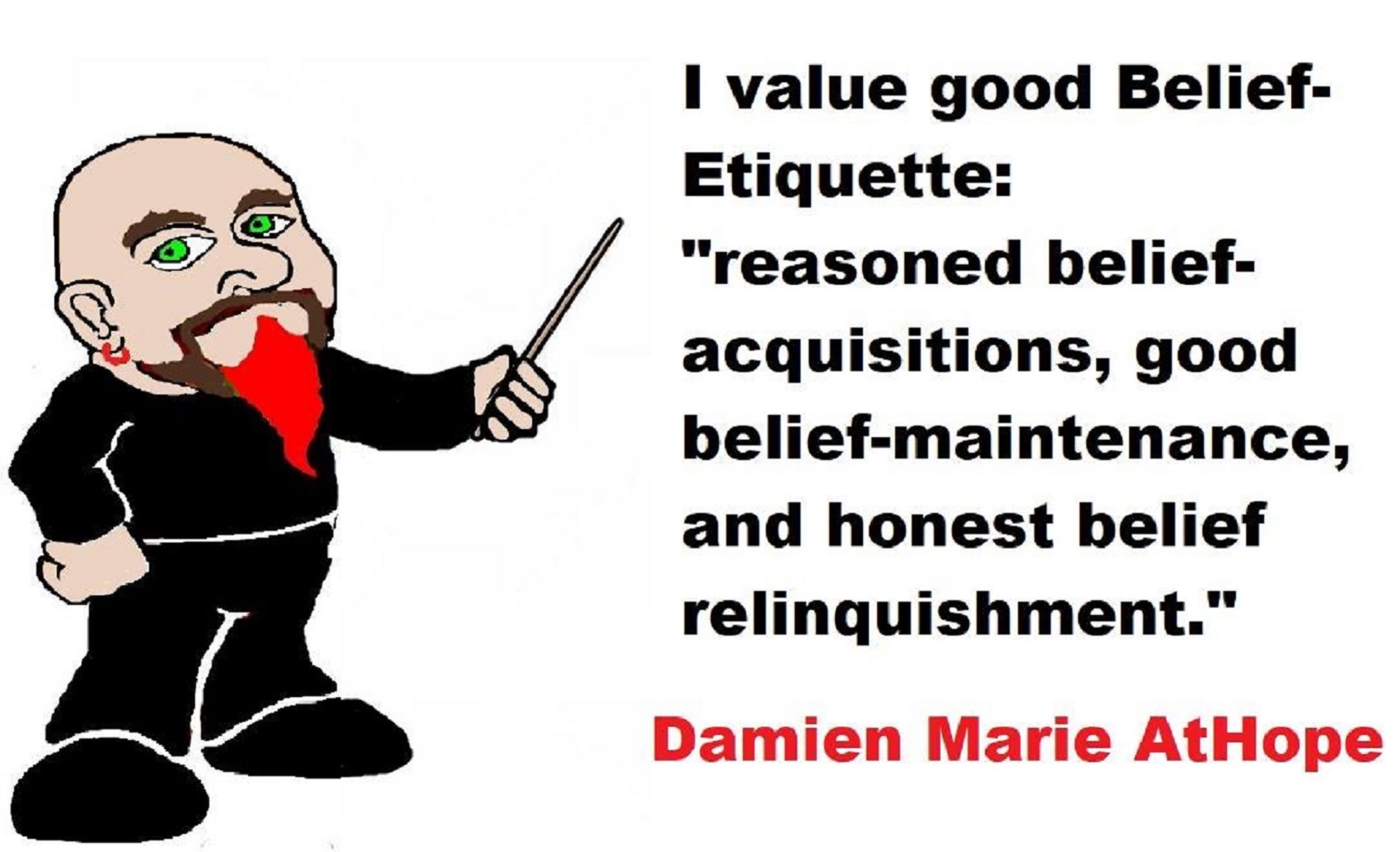
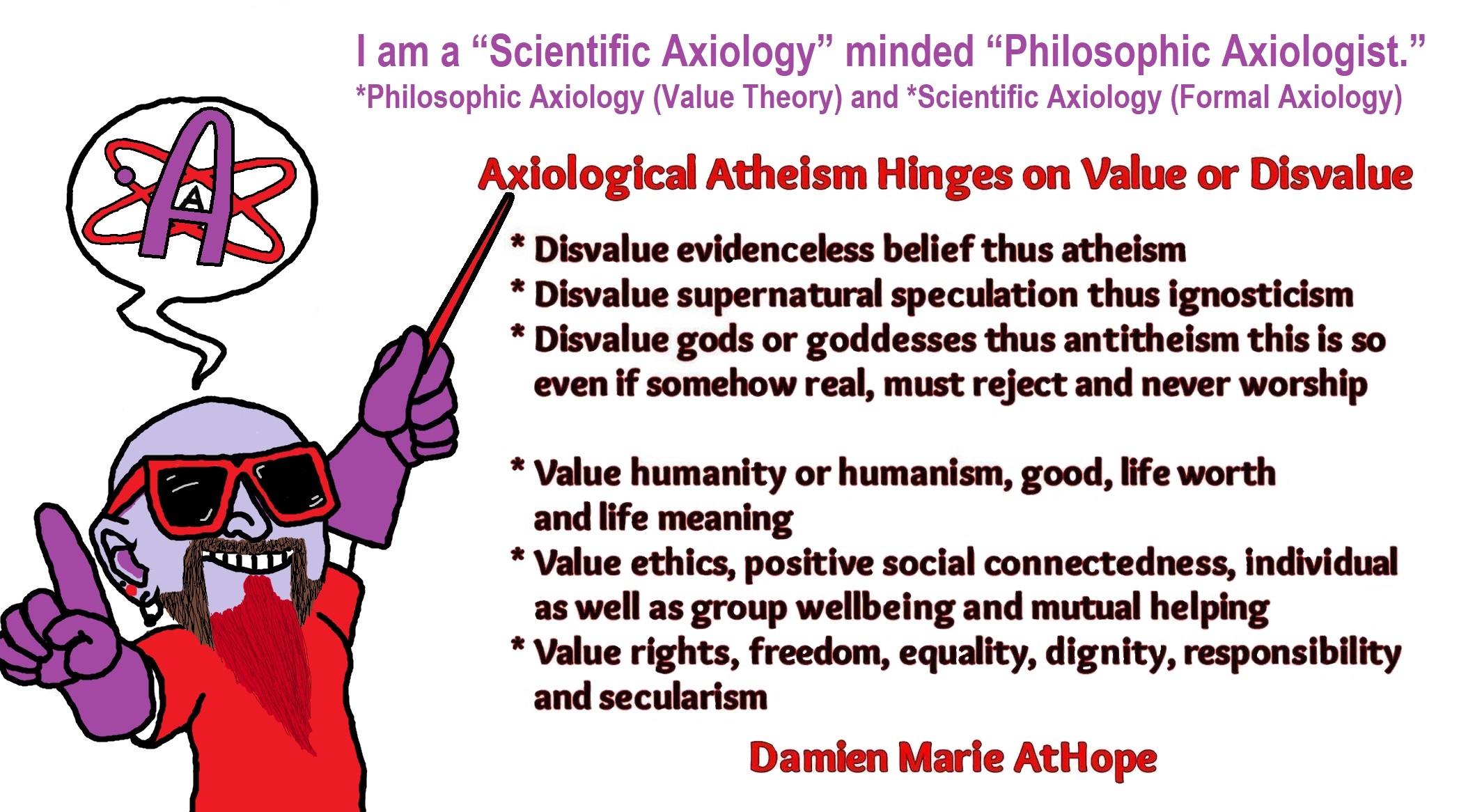
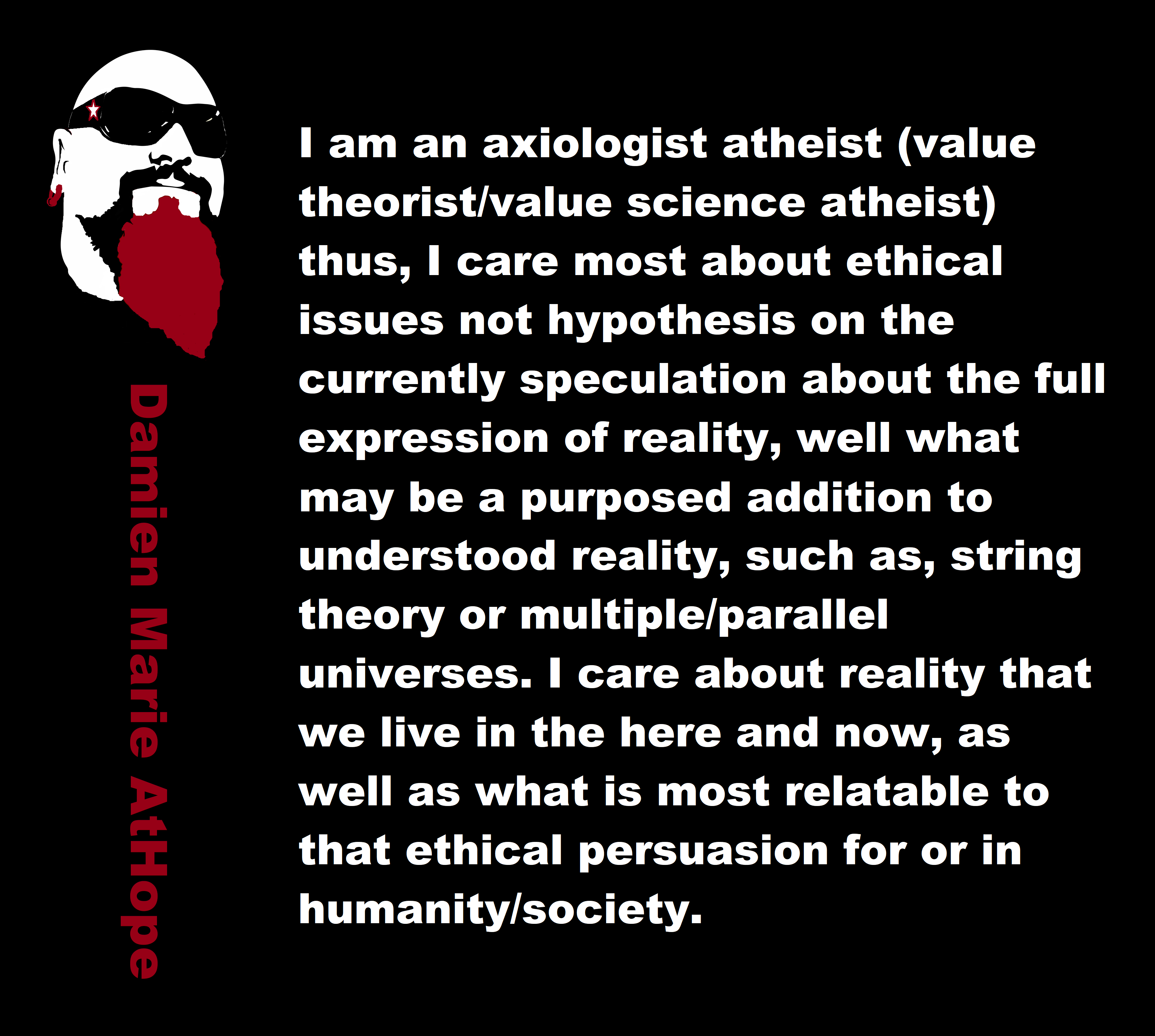
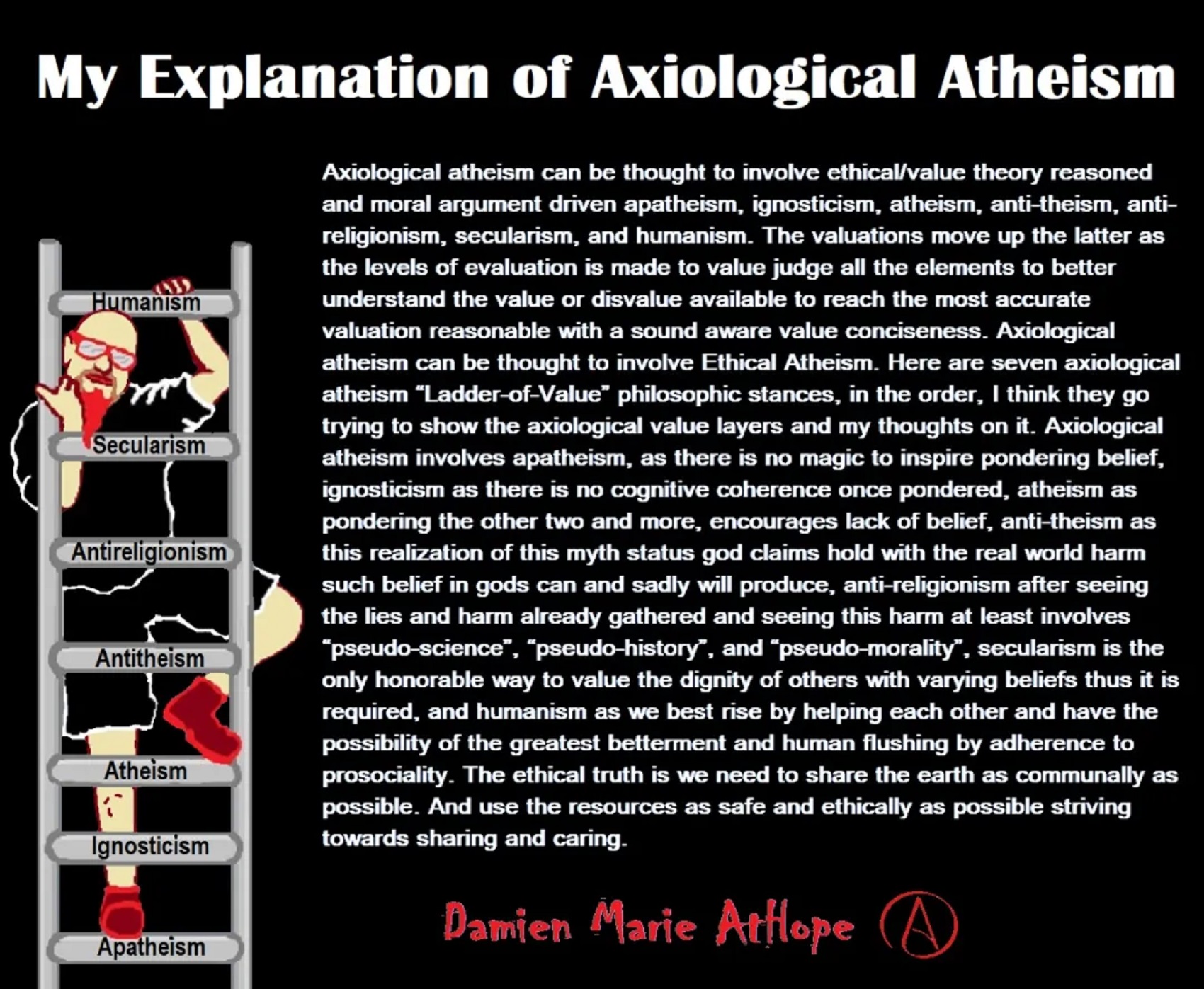
Christian 35 years, read the bible twice, and took two religious classes before the conclusion of atheism.
Yes, I was an undoubting Christian until the age of 35 years old, while in my second religious studies class, and so you know I had read the entire bible twice two different versions, before I ever took the two college classes: one on “religion” and one on “the bible”, before realizing I was now an atheist.
I was a very superstitious supernaturalist as well as a strong theist not even once did I think to doubt or even question. I am sad to say I was not much of a rationalist now that is my driving force. Now, I question everything and think through almost everything.
Turning Atheist?
“This is like blaming Frankenstein’s monster for Mary Shelley writing Frankenstein. He had nothing whatsoever to do with the bible, even according to the traditional Christian account. The NT was not written by the time he allegedly died, so you can’t be referring to the NT. But just the Tanakh is not what people usually mean when they say “holy bible,” but rather Tanakh + NT, so this meme is inaccurate regardless of whether the historical Jesus supported the Tanakh. – Challenger
My response, And the Tanakh is rich with hate and fear literature, so yes, he is indeed responsible for that. so, try again.
“You’re just repeating yourself now. I already specified why this meme is inaccurate. If you want to keep it up, that’s on your intellectual integrity to share false information, but I would delete it because I have intellectual integrity. And anyway, you didn’t say “WANTED: for SUPPORTING the Holy Bible,” but rather for “producing” it, which is just ridiculous. He did not write any of it either. This meme is just all kinds of falseness wrapped in a bundle. I see you criticize theists all the time for not being truthful. Do you not hold yourself to the same standard?” – Challenger
My response, see you still are the one inaccurate as the bible contains the old testament and jesus in only found in the new testament. so, your argument is beyond odd to say one cannot refer to the new testament, the only place we would even know about the jesus character, and in which it is claimed that jesus is said to have not stayed dead, and thus returned to the god state. A state which was then claimed to continue to influence the bible writers, so yes, again he is responsible, told by the bible itself. So, I need to hear a better argument from you, than jesus is not responsible for the bible.
“Jesus could not have supported or “produced” the NT because every shred of it was written AFTER he allegedly died. That should be obvious, but your typo-filled run-on sentences do not establish the contrary. For someone who doesn’t think Jesus is god, this is just a dumb argument to suppose that he is in order to criticize him. It’s like giving something with one hand and taking it away with the other. Anyhow, you are not coming off as very intelligent here. Honestly, quite the contrary. Is it too much to ask that if you are going to produce antitheist memes, that you don’t inject the belief in god into them first (a very strange stance to take, but then you defend it)? You are a muddled mess, and it’s like you’ve never even pondered what it is you’re trying to accomplish on a pragmatic level.” – Challenger
My response, So, no good argument, to support your claim that the bible is not influenced by god/jesus?
“Produce a meme against the belief in god, but then inject the belief in god into it, so that it’s only construed to be accurate if god exists? That is one of the dumbest things I’ve ever heard of in the atheist community, FYI. Yes, god and Jesus don’t exist. No need to have fictional characters produce or support or influence anything. If that’s not enough, then I have nothing more to offer.” – Challenger
My response, Don’t you know you need more than empty claims that don’t prove your point that the general believers do not think the bible is not inspired by god/jesus?
“My estimation of your IQ just dropped by 35 points. How is it an empty claim if you also don’t believe god exists. Are you going to tell me that I need to somehow argue to you that god does not exist for this post to be inaccurate?” – Challenger
My response, this is one of the oddest things I have heard that someone would try to say that the general believers do not think the bible is not inspired by god/jesus. The meme is to address what bible believers believe its a visual added critique as one who talks of IQ would seem to be likely to know but here you are, asking how, “is it an empty claim if you also don’t believe god exists” trying to act as if you don’t get what is being offered in the meme. Rather it makes you mad because of some other reason than actually claiming Jesus believers don’t think he influenced most if not all of the bible. To jesus-believers, jesus is god, and influenced almost everything in the bible. I have a BA in Psychology with some sociology/addictions therapy as well as an Autodidact in Science, Archeology, Anthropology, and Philosophy.
“That is correct in terms of what Christians believe. They are, furthermore, comfortably ensconced in those beliefs in Jesus and god and the bible. The point of an atheist producing a meme against Christianity is to influence believers to not believe in Christianity as much, or otherwise it’s a circle-jerk between atheists, if atheists are the only intended audience. But an atheist producing a meme which takes fundamental Christian tenets to be pre-suppositionally true is not going to be effective because it does not push Christians to go outside their comfort zones. Before the meme, they thought Jesus is god and god exists and the bible is true. And the meme MAKES this same argument and so after the meme they are going to think Jesus is god and god exists and the bible is true. This is basic pragmatics, which obviously Damien has not studied via his auto-didacticism. So, yes, it is just a big atheist circle-jerk. I guess it’s too much to ask for an atheist to create and share memes which don’t take fundamental Christian beliefs as accurate. I mean, what would the world have to come to for that obvious point to have to be implemented?” – Challenger
My response, It was to point out two truths you are seemingly not wishing to address, like how it’s a wanted poster so it’s pointing out jesus is missing and the intellectual joke in that if you miss it is that the jesus character is not coming back and the other if you missed it was to attach the remainder of the bible’s hate and fear and connecting to the jesus character. And as we stand is you tried to do a read herring logical fallacy trying to turn it to my education, then your ad hominem attack just for fun I guess and yet with all your believed superior to me talk are inferior in argument where is counts my friend. I must wonder if you now see you were wrong as still have not addressed your continual weak argument that is not yet supported as you still don’t have support that jesus/god is not responsible for inspiring the bible.
Reasons for or Types of Atheism
My college books where:
Understanding The Bible – By Stephen L. Harris – (7th Edition)
Living Religions – by Mary Pat Fisher – (6th Edition)
Promoting Religion as Real is Harmful?
Sometimes, when you look at things, things which seem hidden at first, only come clearer into view later upon reselection or additional information. So, in one’s earnest search for truth one’s support is expressed not as a onetime event and more akin to a life’s journey to know what is true. I am very anti-religious, opposing anything even like religion, including atheist church. but that’s just me. Others have the right to do atheism their way. I am Not just an Atheist, I am a proud antireligionist. I can sum up what I do not like about religion in one idea; as a group, religions are “Conspiracy Theories of Reality.” These reality conspiracies are usually filled with Pseudo-science and Pseudo-history, often along with Pseudo-morality and other harmful aspects and not just ancient mythology to be marveled or laughed at. I regard all this as ridiculous. Promoting Religion as Real is Mentally Harmful to a Flourishing Humanity To me, promoting religion as real is too often promote a toxic mental substance that can divide a person from who they are shaming them for being human. In addition, religion is a toxic mental substance that can divide a person from real history, real science or real morality to pseudohistory, pseudoscience and pseudomorality. Moreover, religion is a toxic mental substance that can divide a person from rational thought, critical thinking, or logic. Likewise, religion is a toxic mental substance that can divide a person from justice, universal ethics, equality, and liberty. Yes, religion is a toxic mental substance that can divide a person from loved ones, and religion is a toxic mental substance that can divide a person from humanity. Therefore, to me, promoting religion as real is too often promote a toxic mental substance that should be rejected as not only false but harmful as well even if you believe it has some redeeming quality. To me, promoting religion as real is mentally harmful to a flourishing humanity. Religion may have once seemed great when all you had or needed was to believe. Science now seems great when we have facts and need to actually know.
The art of know yourself, love yourself, be yourself?
The art of knowing yourself: this involves getting to the place of knowing oneself they, which they must first understand why knowing oneself is important, as well as how to comprehend they don’t already know themself or that most people don’t know themselves even if they think they do.
The art of loving yourself: this involves getting to the place of knowing oneself they, which they must first understand why knowing one’s self is important, as well as how to comprehend they don’t already know them self or that most people don’t know themselves even if they think they do. First one must think about what love looks like wouldn’t it be a growth producing or would it build self-enlightenment and self-truth? Do you feel I or anyone can define your truth (about who you are)? If someone defined truth for you would you really own it? Wouldn’t it make more sense instead for me to broaden your ability to see the question? First would you think a question like this of such a personal relevance has right answers? To start thinking on what love is would we look at are fallible behavior or some philosophical definition? If we look at are relations with others could we be convicted of loving? If we wish for a philosophical definition of love what realities does it hold in our real lives? Is love a feeling or a behavior? If we look at love as feeling what emotional substance does it stem from? If we look at love as behavior is it fixed in the behaviors of others?
The art of being yourself: this involves getting to the place of being one self they, which they must first understand why knowing one’s self is important, as well as how to comprehend they don’t already know them self or that most people don’t know themselves even if they think they do. Be yourself; everyone else is already taken. Being yourself is celebrating you, as an individual – learning to express yourself and be happy with who you are. Define yourself by yourself: You can’t be yourself if you don’t know, understand, and accept yourself first. It should be your primary goal to find this out. Be YOU authentically: don’t put too much care about how other people perceive you including your parents or family. The fact is, it really doesn’t matter in the long run and lf love must be bought bartered for or molded to be received, is it a love worth having. It’s impossible to be yourself when you’re caught up in wondering “Do they like or accept me?” To be yourself, you’ve got to let go of these concerns and just let your behavior flow, with only your consideration of others as a lens to reference with not own as your own. Don’t Hide: everyone is unique has quirks as well as imperfections; we are all at different stages in life. Be honest with yourself, but don’t be too hard on yourself; apply this philosophy to others, as well. There is a difference between being critical and being honest; learn to watch the way you say things to yourself and others. Own who you are: if you’re always working to be someone you’re not, you’ll never be a happy person. Be yourself and show the world you’re proud of the way you are! Nobody knows you better than you and that’s how it should be. You deserve to be your own best friend, so start trying to figure out how you can do that. If you had to hang out with yourself for a day, what is the most fun type of person you could be, while still being yourself? What is the best version of you? Believe in this idea and use that as your starting point. And how we use this thinking to change how we interact with others is, Knowing society, Loving the Humanity of Society, and Being the Humanity in Society.
A Rational Mind Values Humanity and Rejects Religion and Gods
A truly rational mind sees the need for humanity, as they too live in the world and see themselves as they actually are an alone body in the world seeking comfort and safety. Thus, see the value of everyone around then as they too are the same and therefore rationally as well a humanistically we should work for this humanity we are part of and can either dwell in or help its flourishing as we are all in the hands of each other. You are Free to think as you like but REALITY is unchanged. While you personally may react, or think differently about our shared reality (the natural world devoid of magic anything), We can play with how we use it but there is still only one communal reality (a natural non-supernatural one), which we all share like it or not and you can’t justifiably claim there is a different reality. This is valid as the only one of warrant is the non-mystical natural world around us all, existing in or caused by nature; not made or caused by superstitions like gods or other monsters to many sill fear irrationally.
Do beliefs need justification?
Yes, it all requires a justification and if you think otherwise you should explain why but then you are still trying to employ a justification to challenge justification. So, I still say yes it all needs a justification and I know everything is reducible to feeling the substation of existence. I feel my body and thus I can start my justificationism standard right there and then build all logic inferences from that justified point and I don’t know a more core presupposition to start from. A presupposition is a core thinking stream that like how a tree of beliefs always has a set of assumed sets of presuppositions or a presupposition is relatively a thing/thinking assumed beforehand at the beginning of a line of thinking point, belief projection, argument or course of action. And that as well as everything needs justification to be concluded as reasonable. Sure, you can believe all kinds of things with no justification at all but we can’t claim them as true, nor wish others to actually agree unless something is somehow and or in some way justified. When is something true that has no justification? If you still think so then offer an example, you know a justification. Sure, there can be many things that may be true but actually receiving rational agreement that they are intact true needs justification.
No god Claims have Justification, Challenge?
“Damien, (responding to me saying no god claims have justification) there are problems thinking everything you believe needs a justification.” – Challenger
My response, so, are you saying something can be claimed as real but have no warrant to justify why one should agree or even entertain it?
“The idea that Induction is reliable can be claimed and seems like an important assumption, but arguments for it are fallacious. There are similar issues with thinking an external world exists.” – Challenger
My response, ok, and how do we discern any of it, if nothing has a need for justification? Because to me, I see you’re saying something is fallacious as asserting a justification stance and thus, is similar to what I think, which is valid, that there is a rationalistic need for justification. You are telling me I am wrong and that needs a justification, just as me showing your thinking wrong took a justification. If not then tell me how I am wrong utilizing no justification at all. So, try to prove me wrong because even if you do you will have provided a justification so then further proving my assertion of the need for justification.
“You are missing part of the conversation. Can you prove every belief needs a justification? Let’s say every belief needs a justification. Then you have to argue for every premise of every argument. That requires infinite arguments. What exactly is your argument that all beliefs require a justification? I am not challenging the importance of justification. I am challenging the idea that every belief has to have a justification. The example above is induction. Hume showed why arguments for induction will be fallacious. I did not just make the claim. Go ahead and prove induction is reliable if you can. It would revolutionize philosophy. In response to >>sure you can believe all kinds of things with no justification at all but we can’t claim them as true not wish others to actually agree unless something is somehow and or in some way justified. I already said every challenged claim in a debate has to be argued for. Every claim has a burden of proof anyway. Most beliefs that do not require justification are things basically everyone already agrees with. But if you debate someone who rejects the existence of an external world or the reliability of induction, you can’t prove that they have to agree as far as I can tell. In response to >>When is something true that has no justification? Lots of things are true and we don’t know they are true. To claim to know something is true is another issue. But maybe we know induction is reliable. Maybe we know there is an external world. If so, it’s not clear how we know those things. I already mentioned induction above and you never talked about it.” – Challenger
My response, “Sure, there can be many things that may be true but actually receiving rational agreement that they are intact true needs justification.”
“Right, I think we might have talked past one another a bit. I don’t expect agreement without a good argument.” – Challenger
My response, so you, like me want a justification?
Of course, it is a very important thing to me in general.” – Challenger
“Damien, you are evil.” – Attacker
My response, I am only evil in your pseudomorality.
“Good luck bro lol Hell is waiting.” – Attacker
My response, Tell me what kind of thinking is it that has such joy, at the thought of others suffering, in a place like hell? I will tell you not a humanistic one nor an ethical one, more proof of your pseudomorality is affecting your honest care as a human and still you don’t see it.
Without Nonsense, Religion Dies
I am against ALL Pseudoscience, Pseudohistory and Pseudomorality. And all of these should openly be debunked, when and where possible. Of course, not forgetting how they are all highly represented in religion. All three are often found in religion to the point that if they were removed, their loss would likely end religion as we know it. I don’t have to respect ideas. People get confused ideas are not alive nor do they have beingness, Ideas don’t have rights nor the right to even exist only people have such a right. Ideas don’t have dignity nor can they feel violation only people if you attack them personally. Ideas don’t deserve any special anything they have no feelings and cannot be shamed they are open to the most brutal merciless attack and challenge without any protection and deserve none nor will I give them any if they are found wanting in evidence or reason. I will never respect Ideas if they are devoid of merit I only respect people.
I Hear Theists?
I hear what theists say and what I hear is that they make assertions with no justification discernable of or in reality just some book and your evidence lacking faith. I wish you were open to see but I know you have a wish to believe. I however wish to welcome reality as it is devoid of magic which all religions and gods thinkers believe. I want to be mentally free from misinformed ancient myths and free the minds of those confused in the realm of myths and the antihumanism views that they often attach to. So, I do have an agenda human liberation from fears of the uninformed conception of reality. Saying that some features of reality are not fully know is not proof of god myth claims. II’s not like every time we lack knowledge, we can just claim magic and if we do we are not being intellectually honest to the appraisal of reality that is devoted of anything magic. Theists seem to have very odd attempts as logic, as they most often start with some evidence devoid god myth they favor most often the hereditary favorite of the family or culture that they were born into so a continuous blind acceptance generation after generation of force indicated faith in that which on clear instinctually honest appraisal not only should inspire doubt but full disbelief until valid and reliable justification is offered. Why are all gods unjustified? Well, anything you claim needs justification but no one has evidence of god claim attributes they are all unjustified. All god talk as if it is real acts as if one can claim magic is real by thinking it is so or by accepting someone’s claim of knowing the unjustifiably that they understand an unknowable, such as claims of gods being anything as no one has evidence to start such fact devoid things as all knowing (there is no evidence of an all-knowing anything). Or an all-powerful (there is no evidence of an all-powerful anything). Or the most ridiculous an all-loving (there is no evidence of an all loving anything). But like all god claims, they are not just evidence lacking, the one claiming them has no justified reason to assume that they can even claim them as proof (it’s all the empty air of faith). Therefore, as the limit of all people, is to only be able to justify something from and that which corresponds to the real-world to be real and the last time I checked there is no magic of any kind in our real-world experiences. So, beyond the undefendable magical thinking not corresponding to the real-world how much more ridicules are some claimed supreme magical claimed being thus even more undefendable to the corresponding real-world, which the claimed god(s) thinking is a further and thus more extremely unjustified claim(s). What is this god you seem to think you have any justification to claim?
God: “antihumanism thinking”
God thinking is a superstitiously transmitted disease, that usually is accompanied with some kind of antihumanism thinking. Relatively all gods in general are said to have the will and power over humans. Likewise, such god claims often are attributed to be the ones who decide morality thus remove the true morality nature in humans that actually assist us in morality. So, adding a god is to welcome antihumanism burdens, because god concepts are often an expression. This is especially so when any so-called god somethingism are said to makes things like hells is an antihumanism thinking. A general humanism thinking to me is that everyone owns themselves, not some god and everyone is equal. Such humanism thinking to me, requires a shunning of coercion force that removes a human’s rights or the subjugation of oppression and threats for things like requiring belief or demanding faith in some other unjustified abstraction from others. Therefore, humanism thinking is not open to being in such a beliefs, position or situations that violate free expression of one’s human rights which are not just relinquished because some people believed right or their removal is at the whims of some claimed god (human rights removing/limiting/controlling = ANTIHUMANISM). Humanism to me, summed up as, humans solving human problems through human means. Thus, humanism thinking involve striving to do good without gods, and not welcoming the human rights removing/limiting/controlling, even if the myths could somehow come to be true.
Do you support Human Rights, Are you a Humanist?
How can one claim to be a humanist and somehow not feel compelled to question all beliefs that oppose human values? Simply the world we live in requires that we care, for if we don’t we still live there but can hardly be thought of as a humanistic supporter. Sometimes the greatest fight, in an unfair uncaring world, is not to let it change you for the worst. We should be our best and change the world instead. And not to let it stop us from wishing to be as fair and kind as we can. For the world is not only one we live in but one we help create. Let’s create a better world we can all be proud of together, one of freedom, equality, love and care.
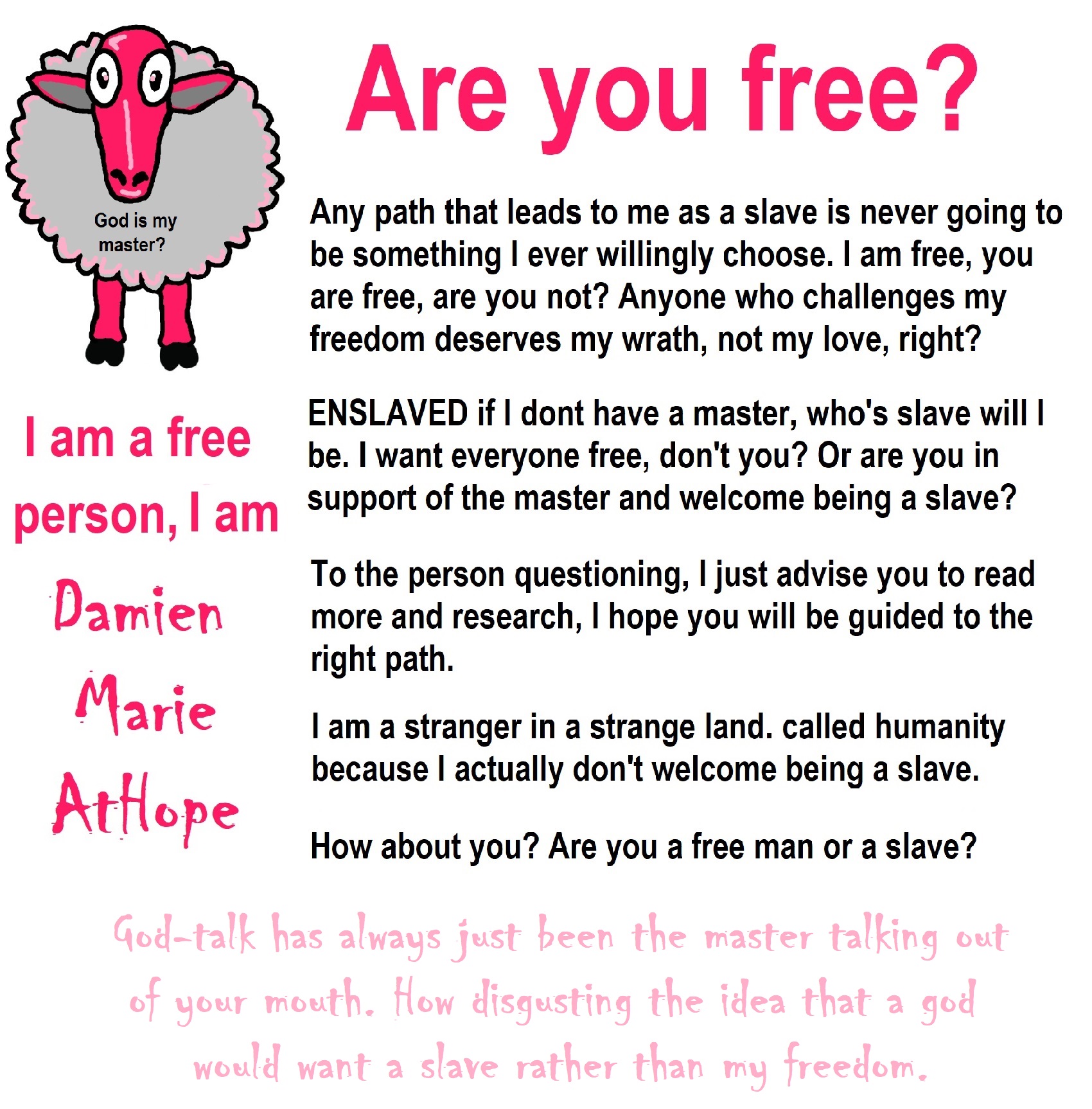
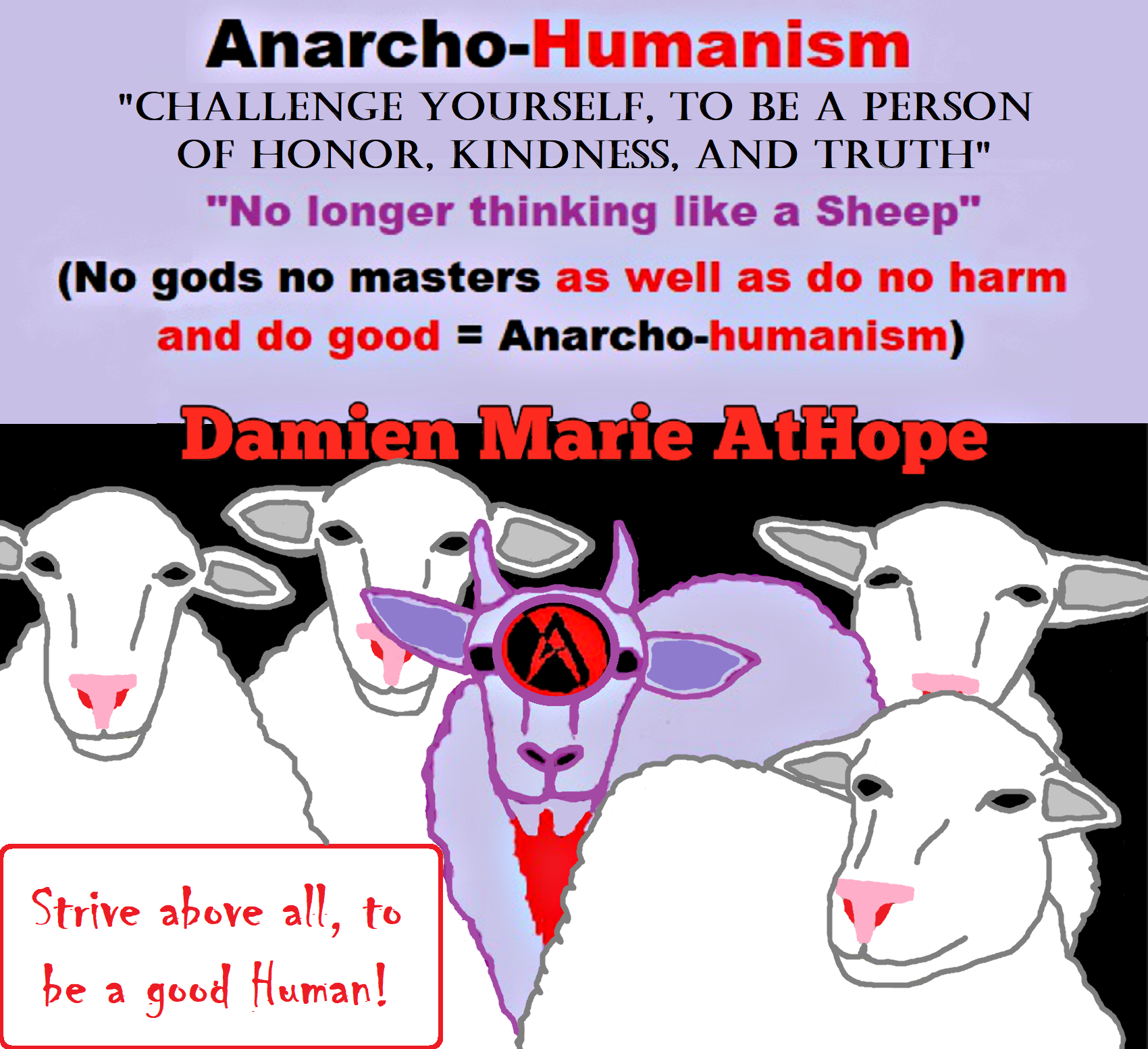
Axiological/axiology (value theory/value science) atheism?
“Axiological Atheism can be thought to involve ethical/value theory reasoned and moral argument driven apatheism, ignosticism, atheism, anti-theism, anti-religionism, secularism, and humanism.”
My quick definition of Axiology?
Axiology is a philosophy (value theory) and a social science (formal axiology) mainly involving the “what, why, and how” of “value” the way epistemology approaches “knowledge” as in what is of value/good/worth/beneficial/ or useful? Why is the thing in question of value/good/worth/beneficial/ or useful? How should the value/good/worth/beneficial/ or useful be interacted with?
Philosophic Axiology (value theory) and Scientific Axiology (formal axiology)
Formal Axiology: Another Victim in Religion’s War on Science
*(axiology as philosophy) value theory/the theory of values, meta-ethics/morality or aesthetics:
“Value theory encompasses a range of approaches to understanding how, why, and to what degree persons value things; whether the object or subject of valuing is a person, idea, object, or anything else. Intuitively, theories of value must be important to ethics. This investigation began in ancient philosophy, where it is called axiology or ethics.” Ref
*(axiology as science) formal axiology/the theory of values, meta-ethics/morality or aesthetics:
“Formal axiology is a branch of axiology in general. Axiology in general or “as such” is value theory in all its ramifications, ranging from meta-theory to ethics, aesthetics, logic, and any other dimension of human interest that involves questions of good and evil, right and wrong, correctness or incorrectness, beauty and ugliness, truth and falsity, and every other conceivable value issue, dimension, or interest. Formal axiology, focuses initially upon the most formal features of human values, then upon applications of these formalities to the concrete details of what we value (values) and how we value (valuations). Robert S. Hartman created a logically abstract (he would say “synthetic”) to features of all human values and valuations; the formal definition of “good” or “value,” which he regarded as the “axiom” of formal axiology — Good is concept (or standard) fulfilment, the three basic kinds of value, intrinsic, extrinsic, and systemic, the hierarchy of value, where the three basic kinds of value are themselves ranked with respect to their relative worth, an association of the three basic kinds of value with set theory and transfinite mathematics.” Ref
axiology/axiologist: noun, axiological: adjective, axiologically: adverb
Roughly understood axiological atheism = Strong Disbelief as well as Strong Secularism and Humanism.
I am an Axiological Atheist, which roughly can be understood as a value theory or value science Atheist. Axiology to Atheism is also meant to denote an atheistic rejection of the existence of gods or supreme beings in favor of a “higher absolute” such as humanity, formal axiology, or naturalistic or universal ethical principles. My stating a kind of “higher absolute” is not stating a belief in some absolute morality, instead it is meaning nothing but naturalistic human centered morality is used or forms of valued good is derived from a rational thinking by humanity (Ie. humanity as the absolute source of ethics and values, and permits individuals to resolve moral problems without resorting to god myths or religious philosophies). Axiological Atheism can be thought to involve ethical/value theory reasoned and moral argument driven atheism, anti-theism, anti-religionism, ignosticism, apatheism, secularism, and humanism. I am anthropocentric as an Axiological Atheist. I see humans value as above all other life’s value. Some say well, we are animals so they disagree with my destination. But how do the facts play out? So you don’t have any difference in value of life? So a bug is the same as a mouse, a mouse is the same as a dolphin, a dolphin is the same as a human, all to you have exactly the same value? You fight to protect the rights of each of them equally? And all killing of any of them is the same crime murder? I know I am an animal but you also know that we do have the term humans which no other animal is classified. And we don’t take other animals to court as only humans and not any other animals are like us. We are also genetically connected to plants and stars and that still doesn’t remove the special class humans removed from all other animals. A society where you can kill a human as easily as a mosquito would simply just not work ethically to me and it should not to any reasonable person either. Anthropocentrism (from Greek ánthrōpos, “human being”; and kéntron, “center”) the belief that considers human beings to be the most significant entity of the world and interprets or regards the world in terms of human values and experiences.
“Formal Axiology (Scientific Axiology/Scientific Value Theory) takes a realistic, or fact-based, view of the world when assessing or understanding value/good/worth. Formal axiology understands that people have and act upon values. Scientific axiologists will seek to understand what those values are, and to analyze their structure. That empirical orientation is why scientific axiology can serve as the formal side of the yet to be developed value sciences. To illustrate this value realism, suppose a theist states they love god(s). Since the science of value has an empirical orientation, a value scientist would see the theistic belief in god(s) not as some actual existing being, instead understand it as a conception in the mind of theist not anything realistic or fact-based. Ref
In my opinion, when it comes to the god concept, an axiological atheist would start with ignosticism which is rejecting the concept of gods because the god concept and the term god has no meaning nor anything in reality to attach its meaning to. Thus, god is not any different than any other made up three word such as fod, which has no meaning as a real thing. If an axiological atheist were asked how important it is to disprove a god or even care about the god question, they would simply not care since the question is meaningless such as looking for an invisible pink unicorn or the jolly green giant. Thus, an axiological atheist could be seen as using apatheism, unless they are under serious challenge or feeling a need to challenge theists or religion believers. An axiological atheist would thus not believe in a god in anyway and likely, this would be called strong atheism. An axiological atheist is more than simply an atheist since axiological atheism sees the god concept as fake or not real and harmful to a free humanity. Thus, an axiological atheist takes an active opposition to theism and their fake gods and even if some god(s) are found to somehow be real then an axiological atheist would start hating that real god and until then, they will hate all manmade god concepts.
Furthermore, an axiological atheist would most likely hate religions for some of the same reasons it opposes god(s) and thus, will be an anti-religionist who sees that religions on the whole to be harmful to humanity. However, an axiological atheist is not against people whether they believe in god concept or religion, they center their hate on harmful ideas such as gods or religions. This hate towards harmful ideas is motivated from a deep ethical care for humanity and thus involves humanism. So, axiological atheism is a humanistic philosophical and ethical stance which emphasizes individually and collectively, the value and agency of human beings and prefers critical thinking and evidence (rationalism, empiricism) over any kind of established doctrines (holy books) or faith (fideism). Moreover, even with axiological atheism’s extremely strong opposition to gods and religion, it does value every persons self-right to define beliefs for themselves and thus, supports secularism (freedom for religion and freedom from religion), protects the religious and nonreligious as well as antireligious from governmental interference and protect the government from the religious, nonreligious as well as antireligious. That being said axiological atheism would like beliefs in gods or religions to be demoted to where they are seen as little more than fantasy or myths but are somewhat harmful and certainly not safe for children.
Axiological atheism: (is not believing and also thinking that a god’s existence would be a bad thing)
Axiological atheism is the thinking that no god(s) or goddess(es) exist and they lack all worth and value to humans even if they existed. Such myth should be rejected in favor of believing in humanity, seeing secularism and humanism as a kind of “higher absolute” or form of valued good. (Ie. humanity as the absolute source of ethics and values, and permits individuals to resolve moral problems without resorting to god myths or religious philosophies). An axiological atheist could be thought of as thinking no gods no masters and thus would never worship a god or any being especially if it was by threat, force or the act of coercing to any extent. An axiological atheist may even question if any being is worthy of the title god or be ignostic that every theological position assumes too much about the concept of god and see this as extending to other theological concepts; including (but not limited to) concepts of faith, spirituality, heaven, hell, afterlife, damnation, salvation, sin and the soul. Thus regarding that as ridiculous and not worthy at all and should be shown Ridicule and Disdain. Therefore as you can guess they would say we are better off that no god(s) or goddess(es) existed and it would be much worse if they did. The axiological atheism argument is deductively valid. Here is a proof of validity of the argument: http://plato.stanford.edu/entries/evil/validity.html
Axiological Atheism Morality Critique: of the bible god
Even the best thinking, beliefs, or ideas if not connected to action are but wasted words.
Any claimed god or supreme power that threatens extreme suffering to those who are vulnerable and of lesser power is abusive. This is especially so, with the human horror of injustice that would be hell. Which once created means its creator cannot also be called or connected to something all loving or all just.
Any reasonable person can know killing the entire planet in a flood if real which it is not would be the greatest act of mass murder, than that done by any other madman ever know in history.
Evil bible god?
There is plenty of evil in “the Good Book,” but here are some highlights:
1. God drowns the whole earth.
In Genesis 7:21-23, God drowns the entire population of the earth: men, women, children, fetuses, and perhaps unicorns. Only a single family survives. In Matthew 24:37-42, gentle Jesus approves of this genocide and plans to repeat it when he returns.
2. God kills half a million people.
In 2 Chronicles 13:15-18, God helps the men of Judah kill 500,000 of their fellow Israelites.
3. God slaughters all Egyptian firstborn.
In Exodus 12:29, God the baby-killer slaughters all Egyptian firstborn children and cattle because their king was stubborn.
4. God kills 14,000 people for complaining that God keeps killing them.
In Numbers 16:41-49, the Israelites complain that God is killing too many of them. So, God sends a plague that kills 14,000 more of them.
5. Genocide after genocide after genocide.
In Joshua 6:20-21, God helps the Israelites destroy Jericho, killing “men and women, young and old, cattle, sheep and donkeys.” In Deuteronomy 2:32-35, God has the Israelites kill everyone in Heshbon, including children. In Deuteronomy 3:3-7, God has the Israelites do the same to the people of Bashan. In Numbers 31:7-18, the Israelites kill all the Midianites except for the virgins, whom they take as spoils of war. In 1 Samuel 15:1-9, God tells the Israelites to kill all the Amalekites – men, women, children, infants, and their cattle – for something the Amalekites’ ancestors had done 400 years earlier.
6. God kills 50,000 people for curiosity.
In 1 Samuel 6:19, God kills 50,000 men for peeking into the ark of the covenant. (Newer cosmetic translations count only 70 deaths, but their text notes admit that the best and earliest manuscripts put the number at 50,070.)
7. 3,000 Israelites killed for inventing a god.
In Exodus 32, Moses has climbed Mount Sinai to get the Ten Commandments. The Israelites are bored, so they invent a golden calf god. Moses comes back and God commands him: “Each man strap a sword to his side. Go back and forth through the camp from one end to the other, each killing his brother and friend and neighbor.” About 3,000 people died.
8. The Amorites destroyed by sword and by God’s rocks.
In Joshua 10:10-11, God helps the Israelites slaughter the Amorites by sword, then finishes them off with rocks from the sky.
9. God burns two cities to death.
In Genesis 19:24, God kills everyone in Sodom and Gomorrah with fire from the sky. Then God kills Lot’s wife for looking back at her burning home.
10. God has 42 children mauled by bears.
In 2 Kings 2:23-24, some kids tease the prophet Elisha, and God sends bears to dismember them. (Newer cosmetic translations say the bears “maul” the children, but the original Hebrew, baqa, means “to tear apart.”)
11. A tribe slaughtered and their virgins raped for not showing up at roll call.
In Judges 21:1-23, a tribe of Israelites misses roll call, so the other Israelites kill them all except for the virgins, which they take for themselves. Still not happy, they hide in vineyards and pounce on dancing women from Shiloh to take them for themselves.
12. 3,000 crushed to death.
In Judges 16:27-30, God gives Samson strength to bring down a building to crush 3,000 members of a rival tribe.
13. A concubine raped and dismembered.
In Judges 19:22-29, a mob demands to rape a godly master’s guest. The master offers his daughter and a concubine to them instead. They take the concubine and gang-rape her all night. The master finds her on his doorstep in the morning, cuts her into 12 pieces, and ships the pieces around the country.
14. Child sacrifice.
In Judges 11:30-39, Jephthah burns his daughter alive as a sacrificial offering for God’s favor in killing the Ammonites.
15. God helps Samson kill 30 men because he lost a bet.
In Judges 14:11-19, Samson loses a bet for 30 sets of clothes. The spirit of God comes upon him and he kills 30 men to steal their clothes and pay off the debt.
16. God demands you kill your wife and children for worshiping other gods.
In Deuteronomy 13:6-10, God commands that you must kill your wife, children, brother, and friend if they worship other gods.
17. God incinerates 51 men to make a point.
In 2 Kings 1:9-10, Elijah gets God to burn 51 men with fire from heaven to prove he is God.
18. God kills a man for not impregnating his brother’s widow.
In Genesis 38:9-10, God kills a man for refusing to impregnate his brother’s widow.
19. God threatens forced cannibalism.
In Leviticus 26:27-29 and Jeremiah 19:9, God threatens to punish the Israelites by making them eat their own children.
20. The coming slaughter.
According to Revelation 9:7-19, God’s got more evil coming. God will make horse-like locusts with human heads and scorpion tails, who torture people for 5 months. Then some angels will kill a third of the earth’s population. If he came today, that would be 2 billion people.
Now, Christians have spent thousands of years coming up with excuses for a loving god that would allow or create such evil. In fact, they’ve come up with 12 basic responses, which are the subject of The Tale of the Twelve Officers.
You should also check out: evilbible.com
This website (evilbible.com), is designed to spread the vicious truth about the Bible. For far too long priests and preachers have completely ignored the vicious criminal acts that the Bible promotes. The so called God of the Bible makes Osama Bin Laden look like a Boy Scout. This God, according to the Bible, is directly responsible for many mass-murders, rapes, pillage, plunder, slavery, child abuse and killing, not to mention the killing of unborn children. I have included references to the Biblical passages, so grab your Bible and follow along.
It always amazes me how many times this God orders the killing of innocent people even after the Ten Commandments said Thou shall not kill. For example, God kills 70,000 innocent people because David ordered a census of the people (1 Chronicles 21).
God also orders the destruction of 60 cities so that the Israelites can live there. He orders the killing of all the men, women, and children of each city, and the looting of all of value (Deuteronomy 3). He orders another attack and the killing of all the living creatures of the city: men and women, young, and old, as well as oxen sheep, and asses(Joshua 6). In Judges 21 He orders the murder of all the people of Jabesh-gilead, except for the virgin girls who were taken to be forcibly raped and married. When they wanted more virgins, God told them to hide alongside the road and when they saw a girl they liked, kidnap her and forcibly rape her and make her your wife!
Just about every other page in the Old Testament has God killing somebody! In 2 Kings 10:18-27, God orders the murder of all the worshipers of a different god in their very own church! In total God kills 371,186 people directly and orders another 1,862,265 people murdered
The God of the Bible also allows slavery, including selling your own daughter as a sex slave (Exodus 21:1-11), child abuse (Judges 11:29-40 & Isaiah 13:16), and bashing babies against rocks (Hosea 13:16 & Psalms 137:9). This type of criminal behavior should shock any moral person.
Murder, rape, pillage, plunder, slavery, and child abuse can not be justified by saying that some god says it’s OK. If more people would actually sit down and read the Bible there would be a lot more atheists like myself. Jesus also promoted the idea that all men should castrate themselves to go to heaven: For there are eunuchs, that were so born from their mother’s womb: and there are eunuchs, that were made eunuchs by men: and there are eunuchs, that made themselves eunuchs for the kingdom of heaven’s sake. He that is able to receive it, let him receive it (Matthew 19:12). I don’t know why anyone would follow the teachings of someone who literally tells all men to cut off their privates.
The God of the Bible also was a big fan of ritual human sacrifice and animal sacrifice.
And just in case you are thinking that the evil and immoral laws of the Old Testament are no longer in effect, perhaps you should read where Jesus makes it perfectly clear: It is easier for Heaven and Earth to pass away than for the smallest part of the letter of the law to become invalid (Luke 16:17). There are many more quotes on this topic at myDo Not Ignore the Old Testament web page.
I know that most Christians believe that God is a good and loving god, and wants people to do good things. I believe that most people want to do good things and behave morally. I also believe that many Christians haven’t really read the Bible, or just read certain passages in church. This is understandable, as the Bible is hard to read due to its archaic language and obscure references. Also many priests and preachers don’t like to read certain passages in the Bible because they present a message of hate not love.
If you follow the links on this site you will learn about all the nasty things in the Bible that are usually not talked about by priests and preachers.
Want to know how I became an atheist, click the link: https://damienmarieathope.com/atheism/
Debunking Jesus?
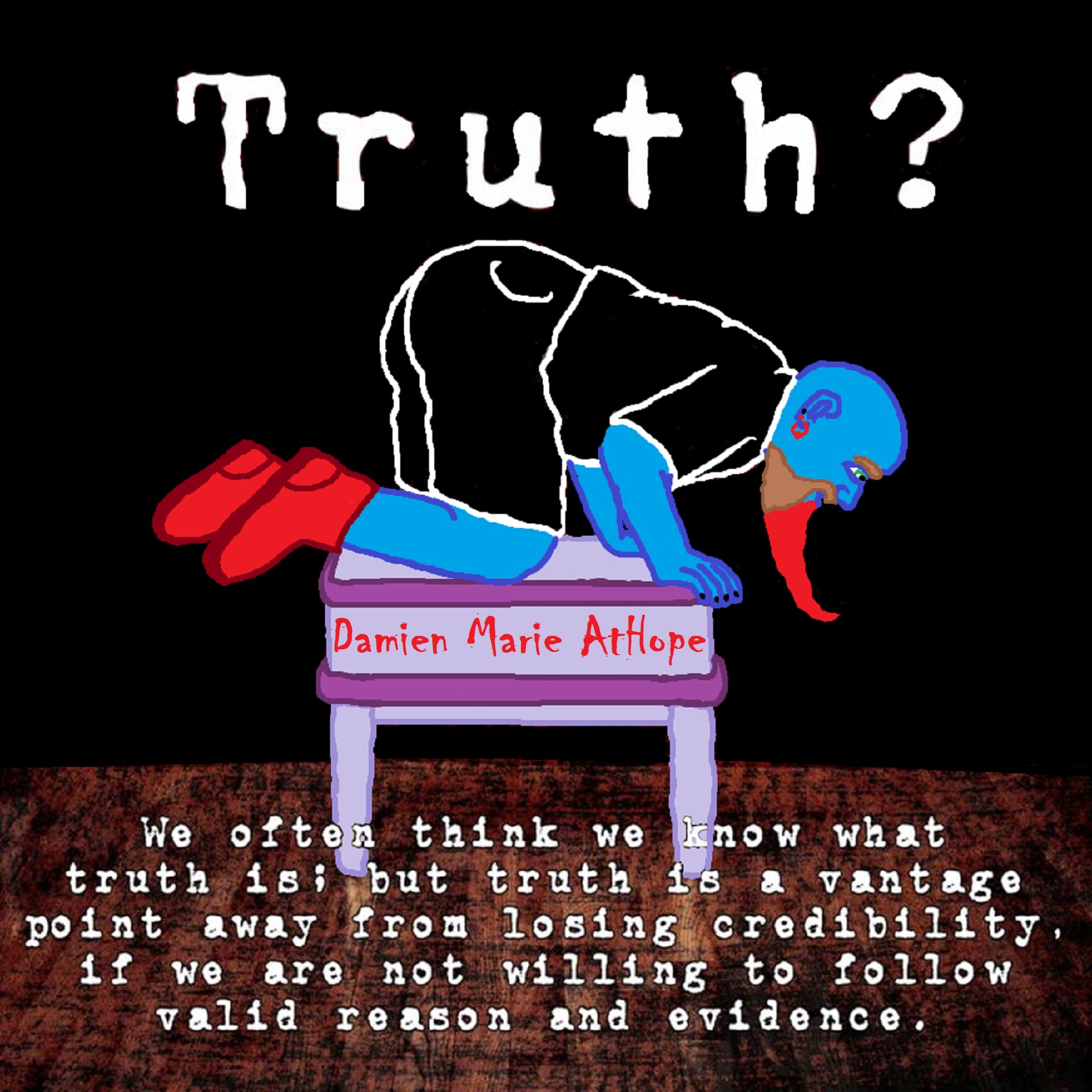

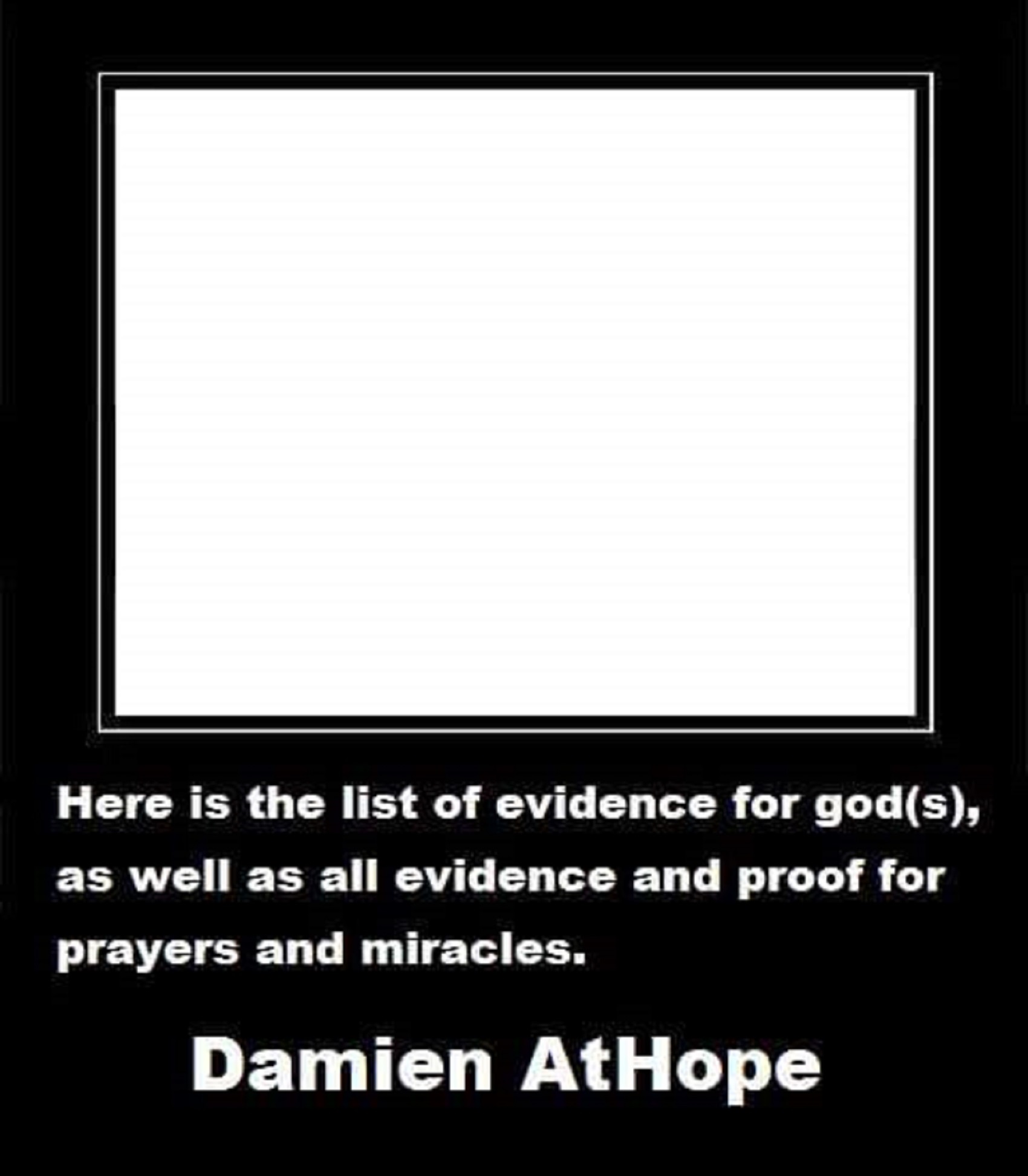
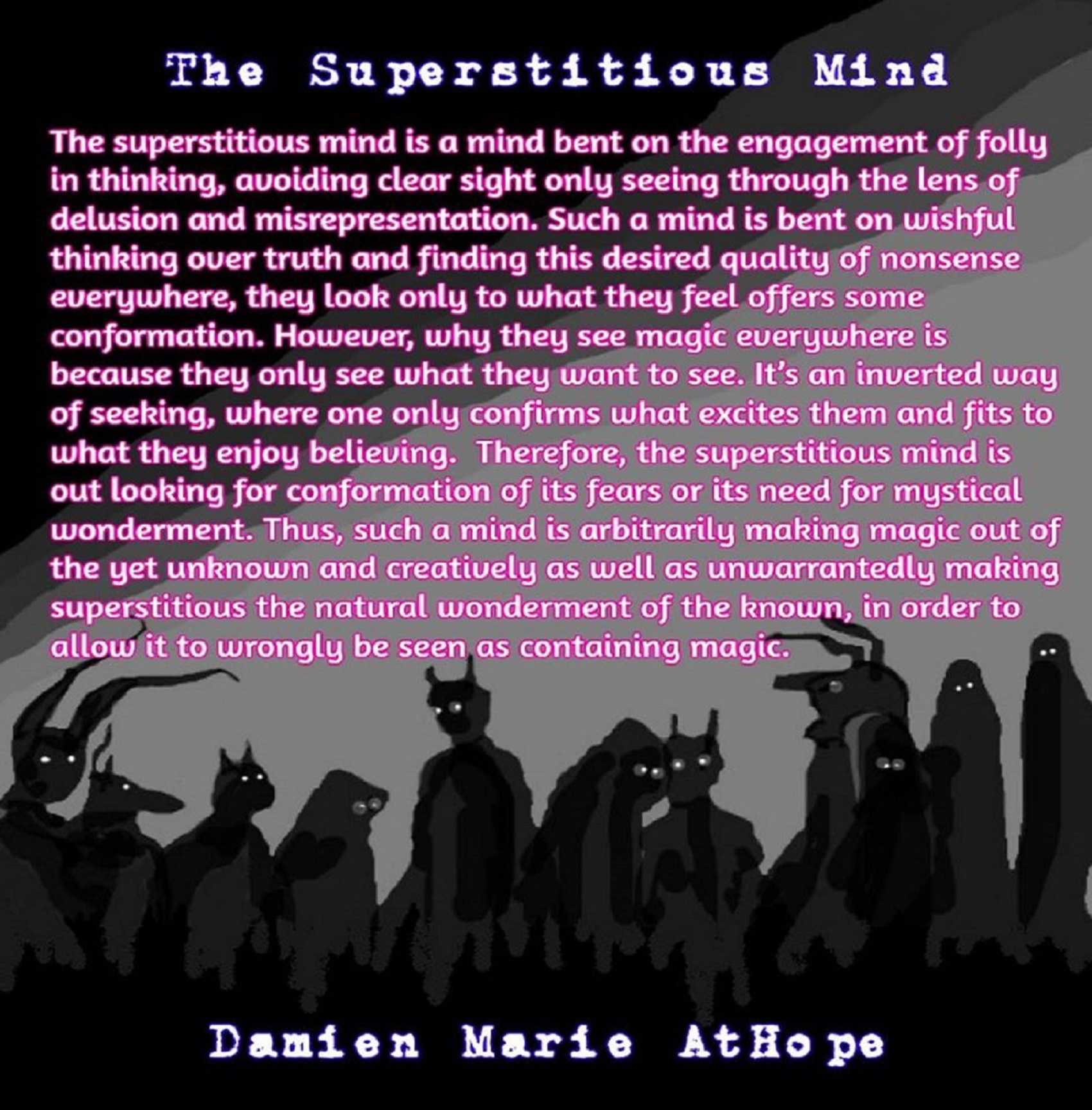
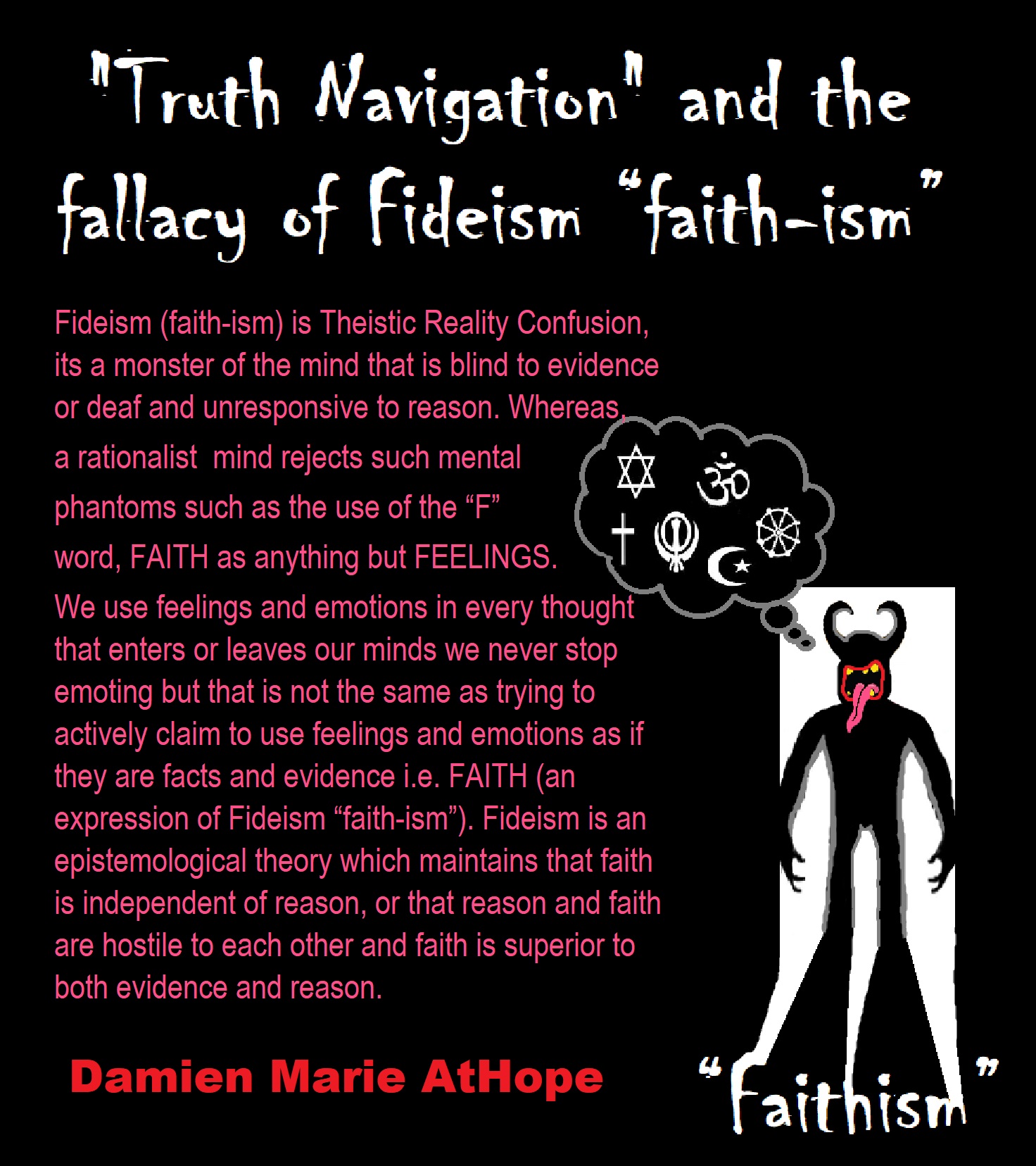
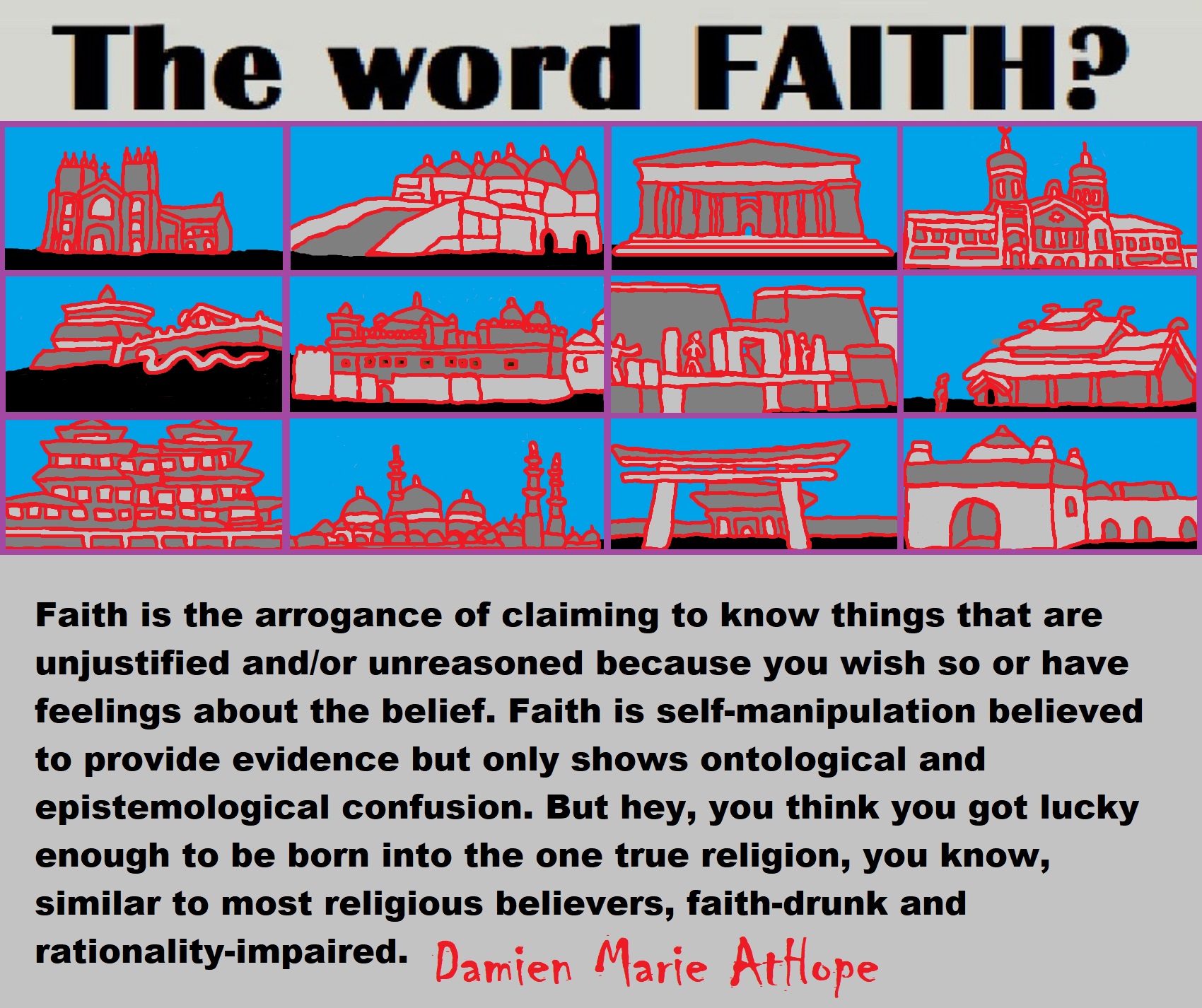
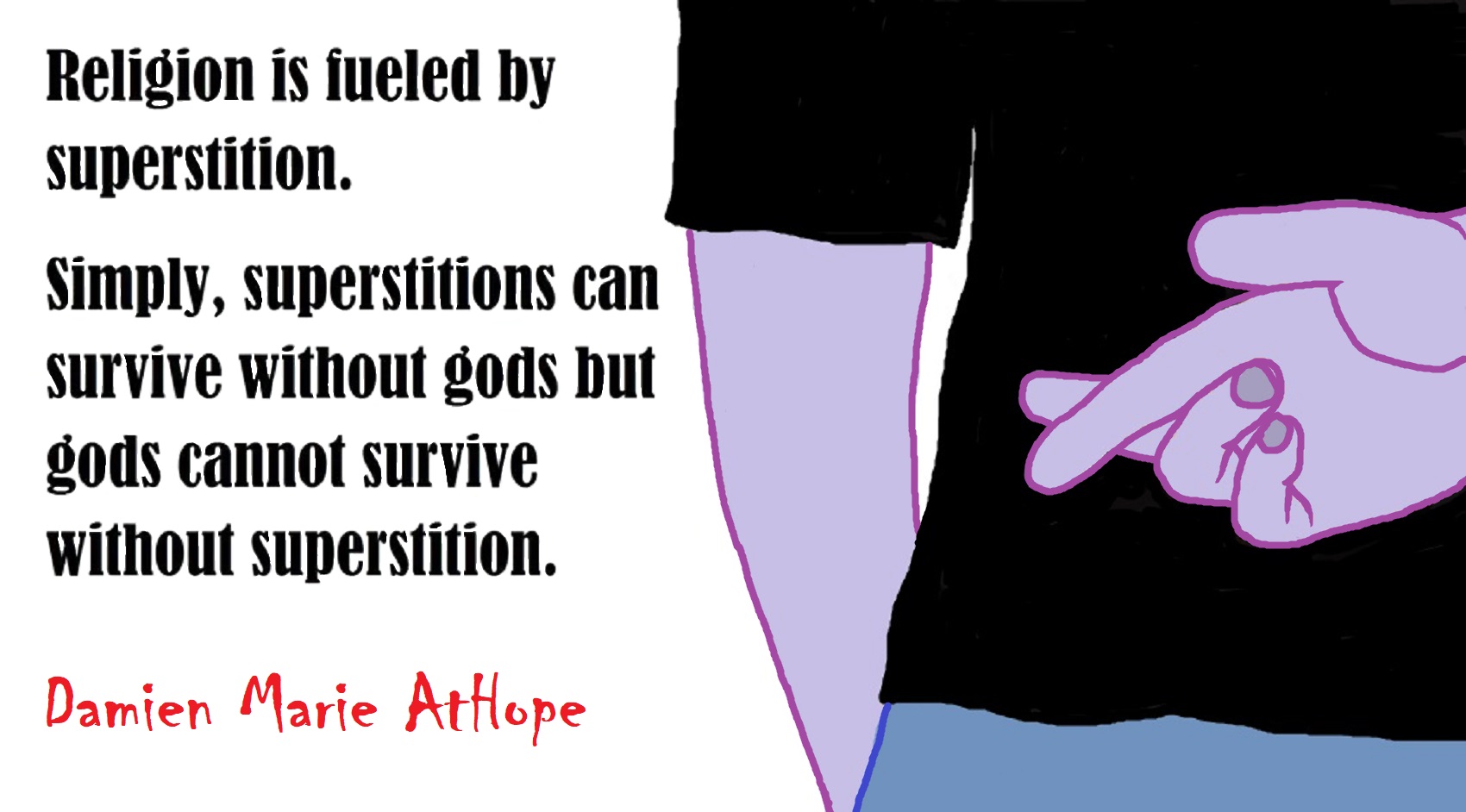
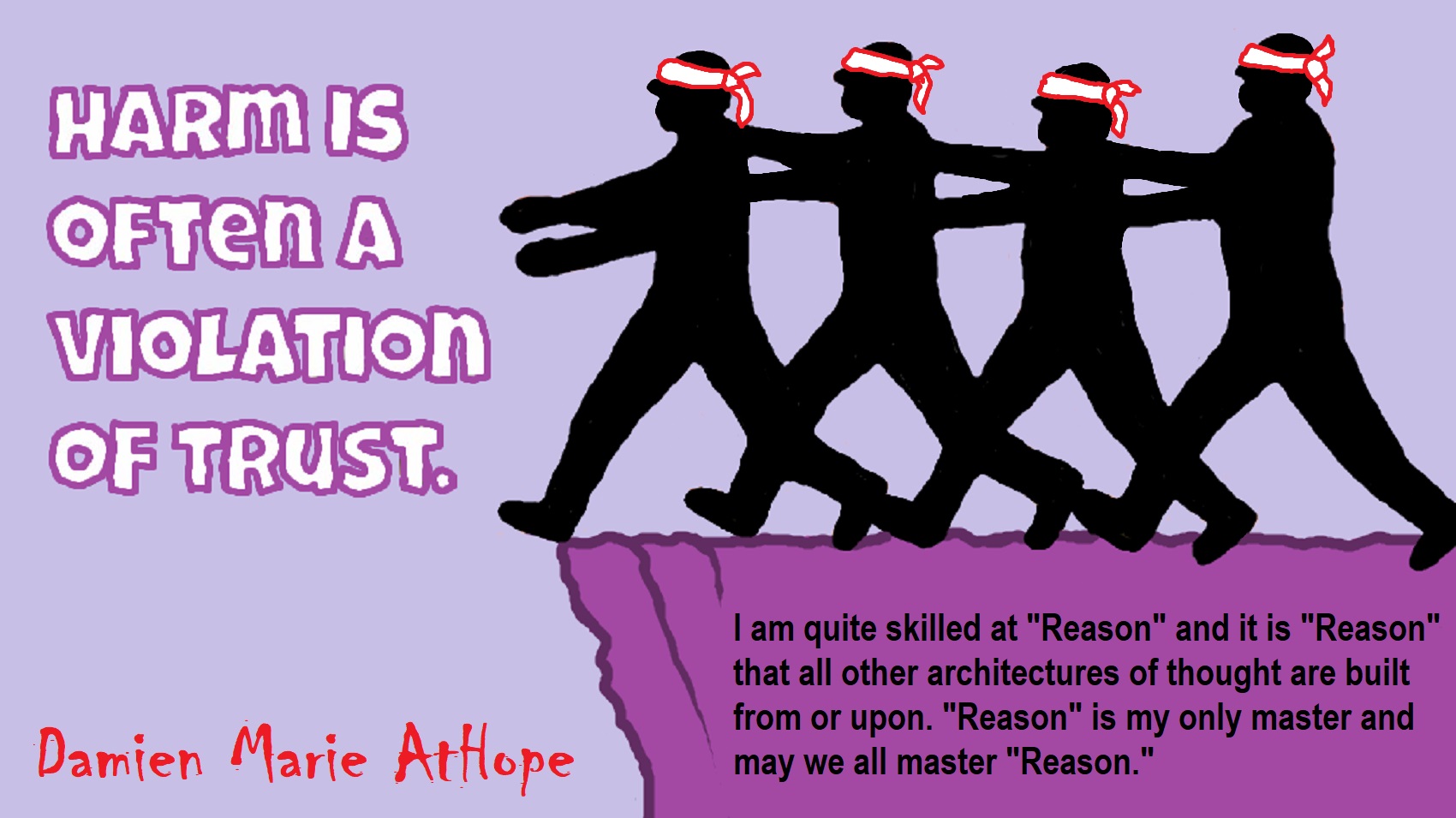
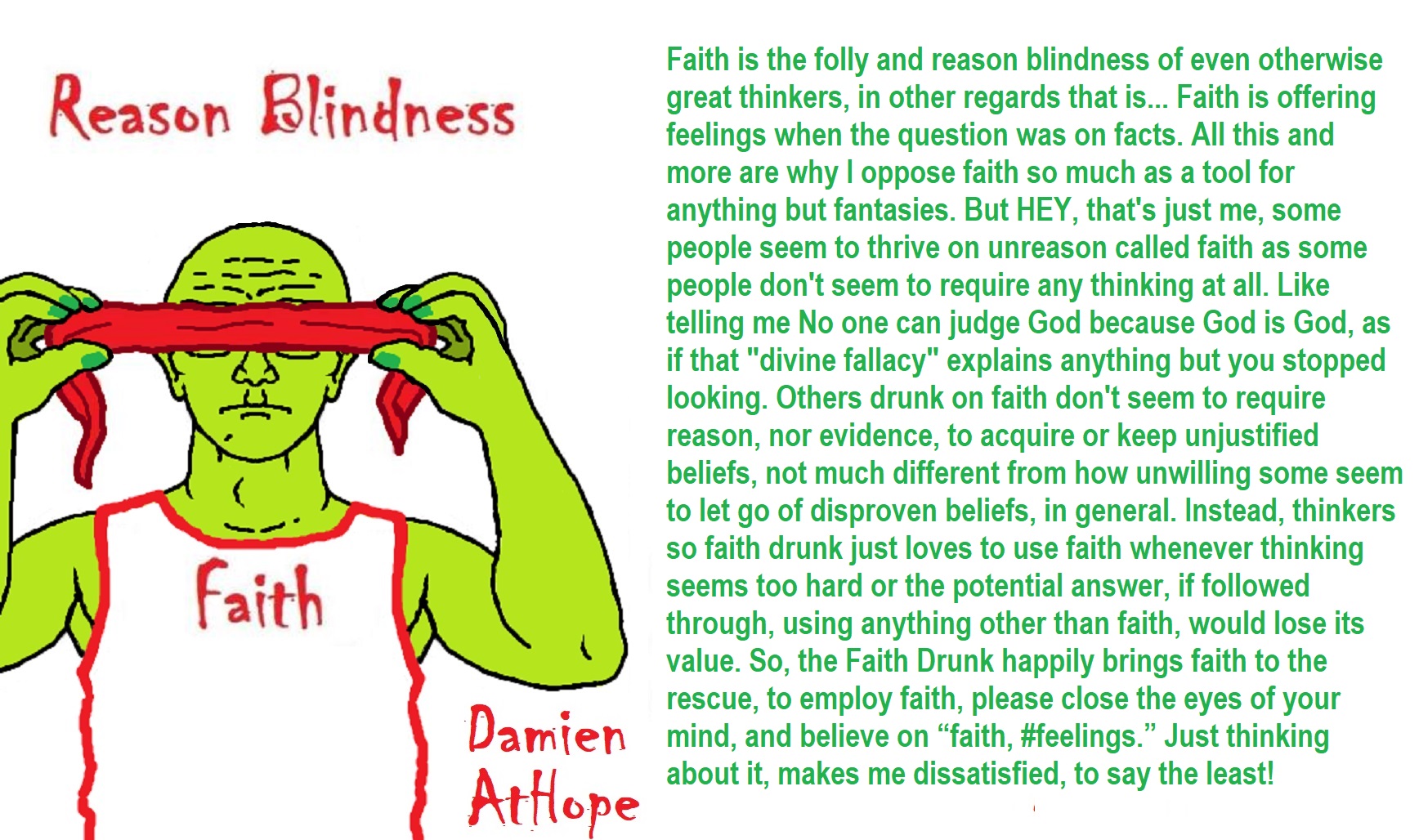
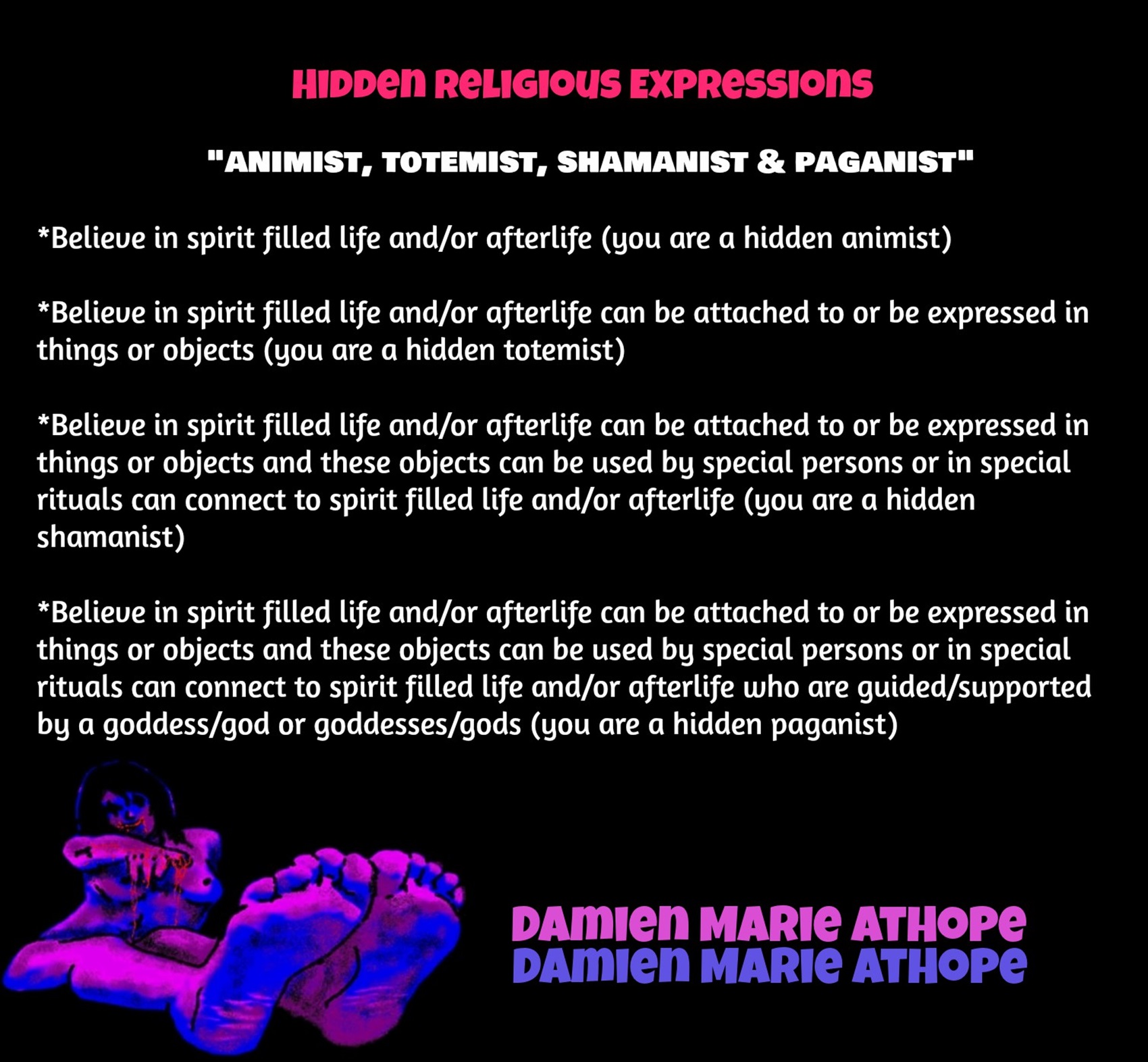
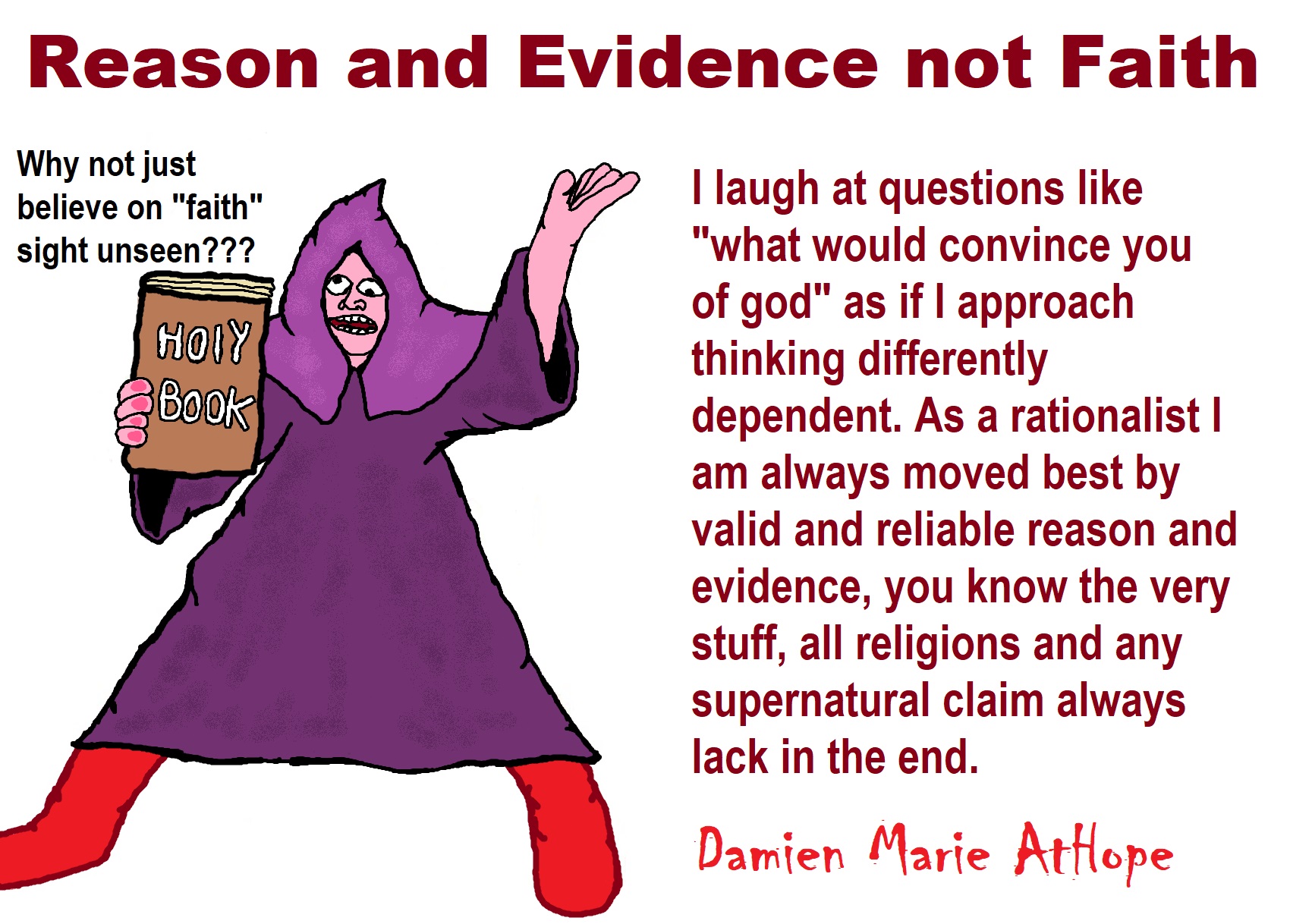
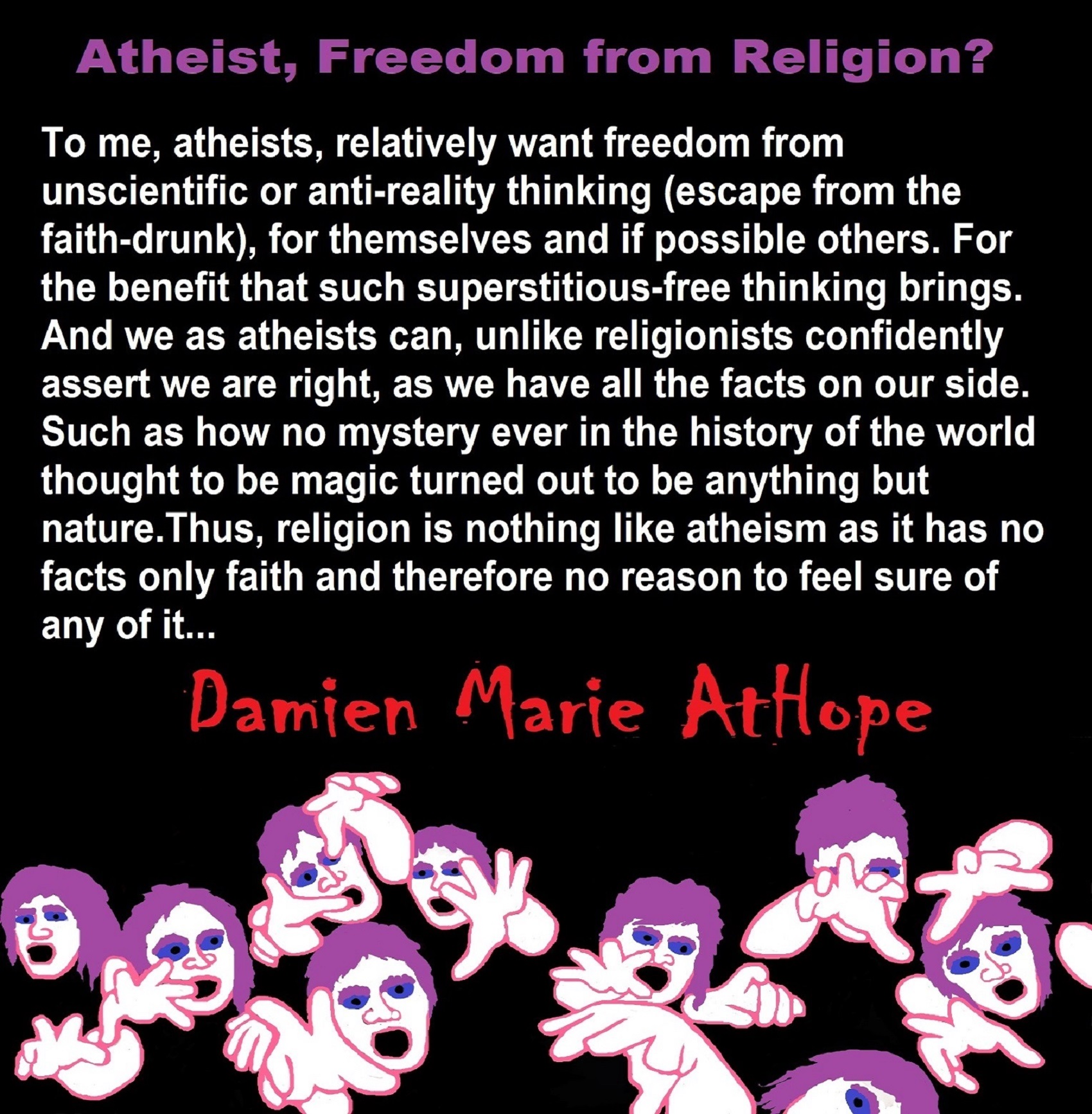
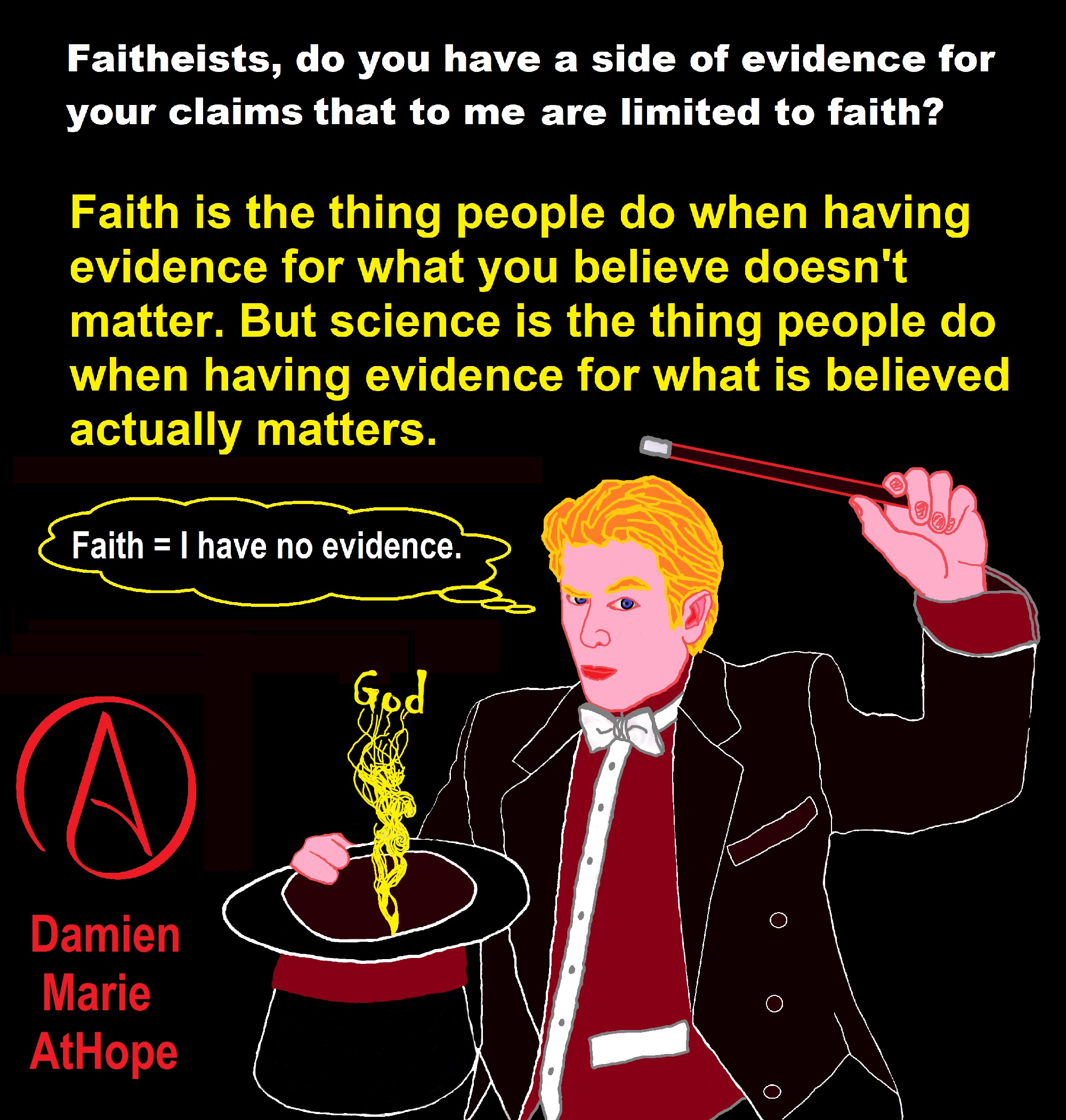
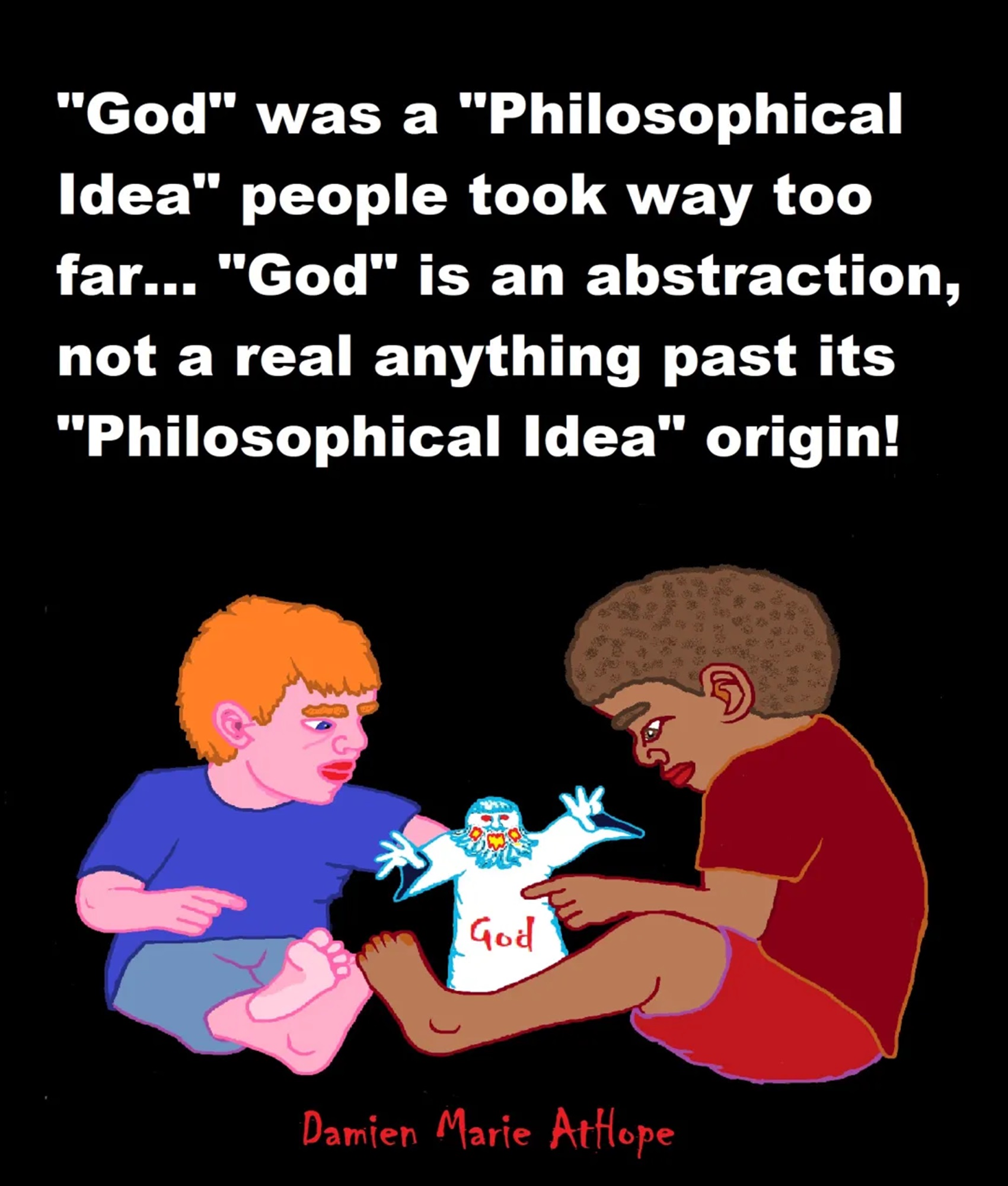
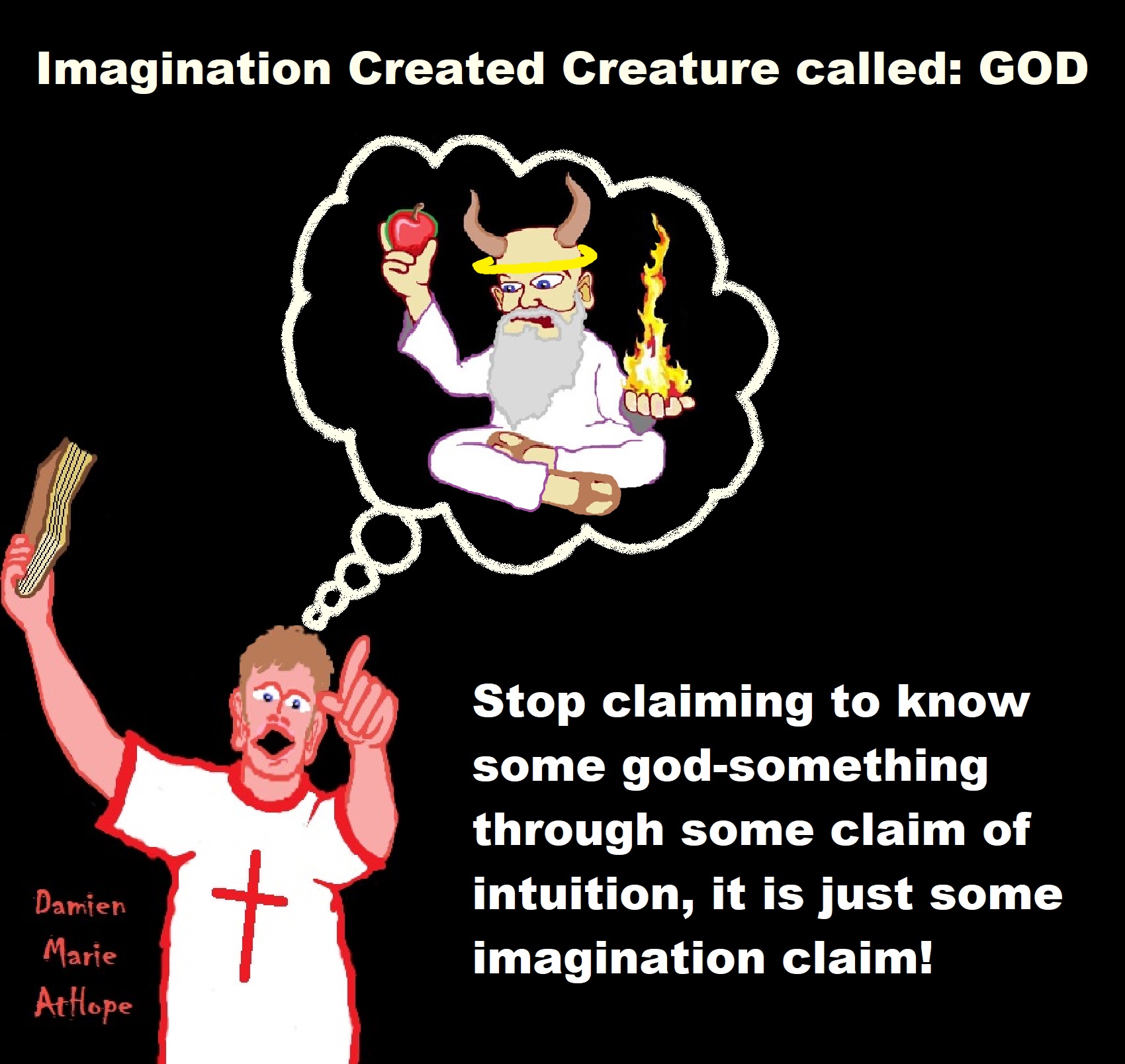

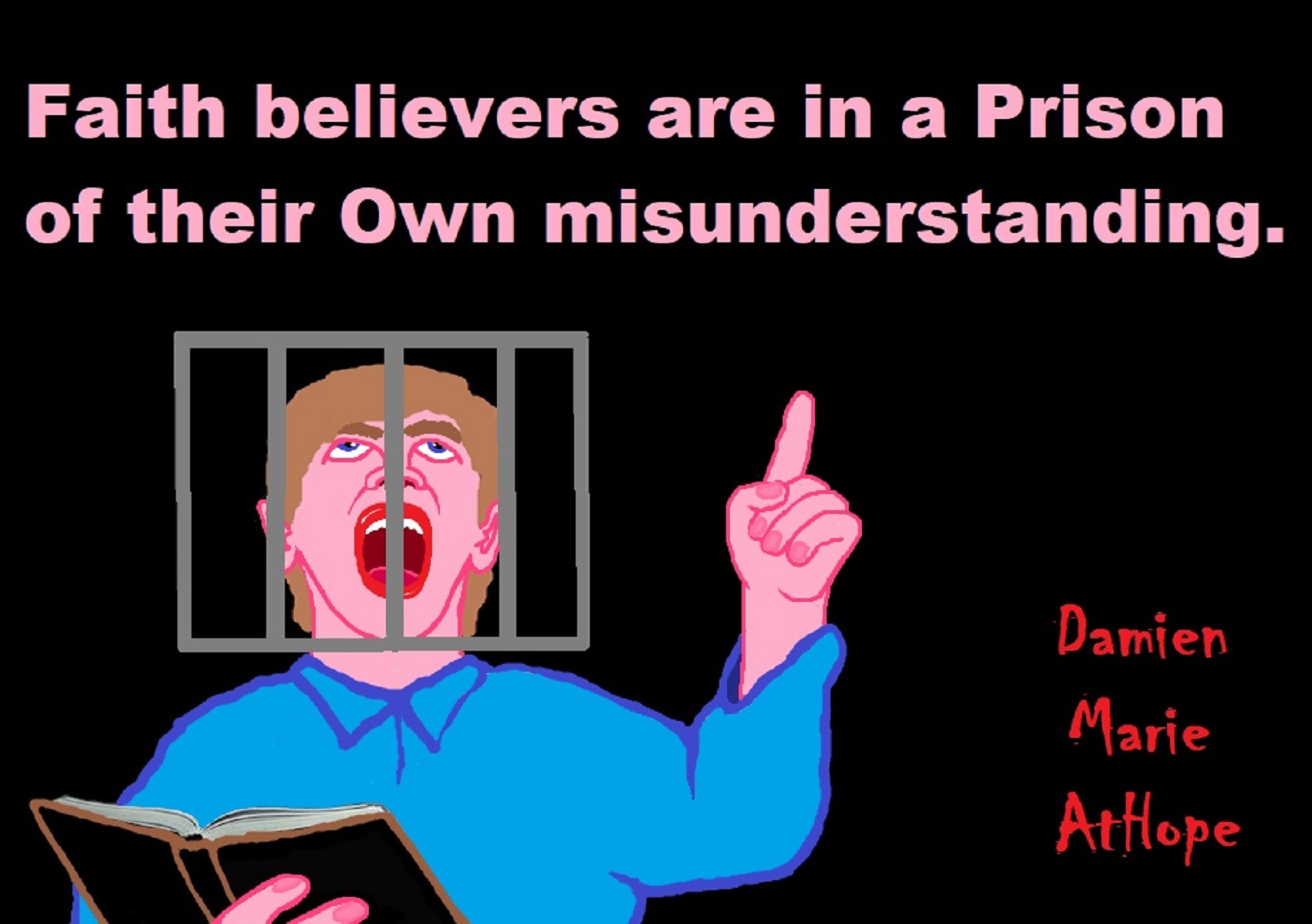
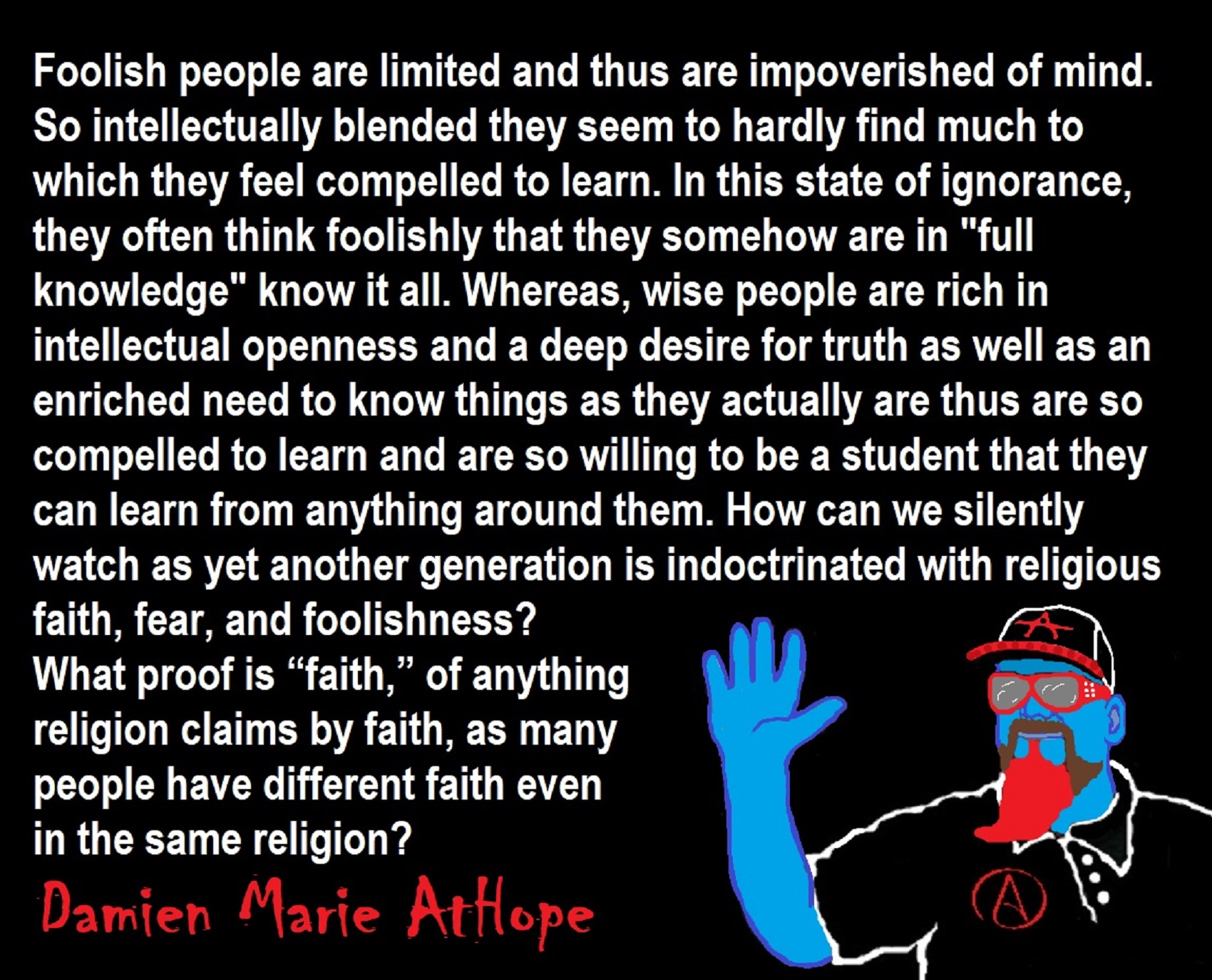
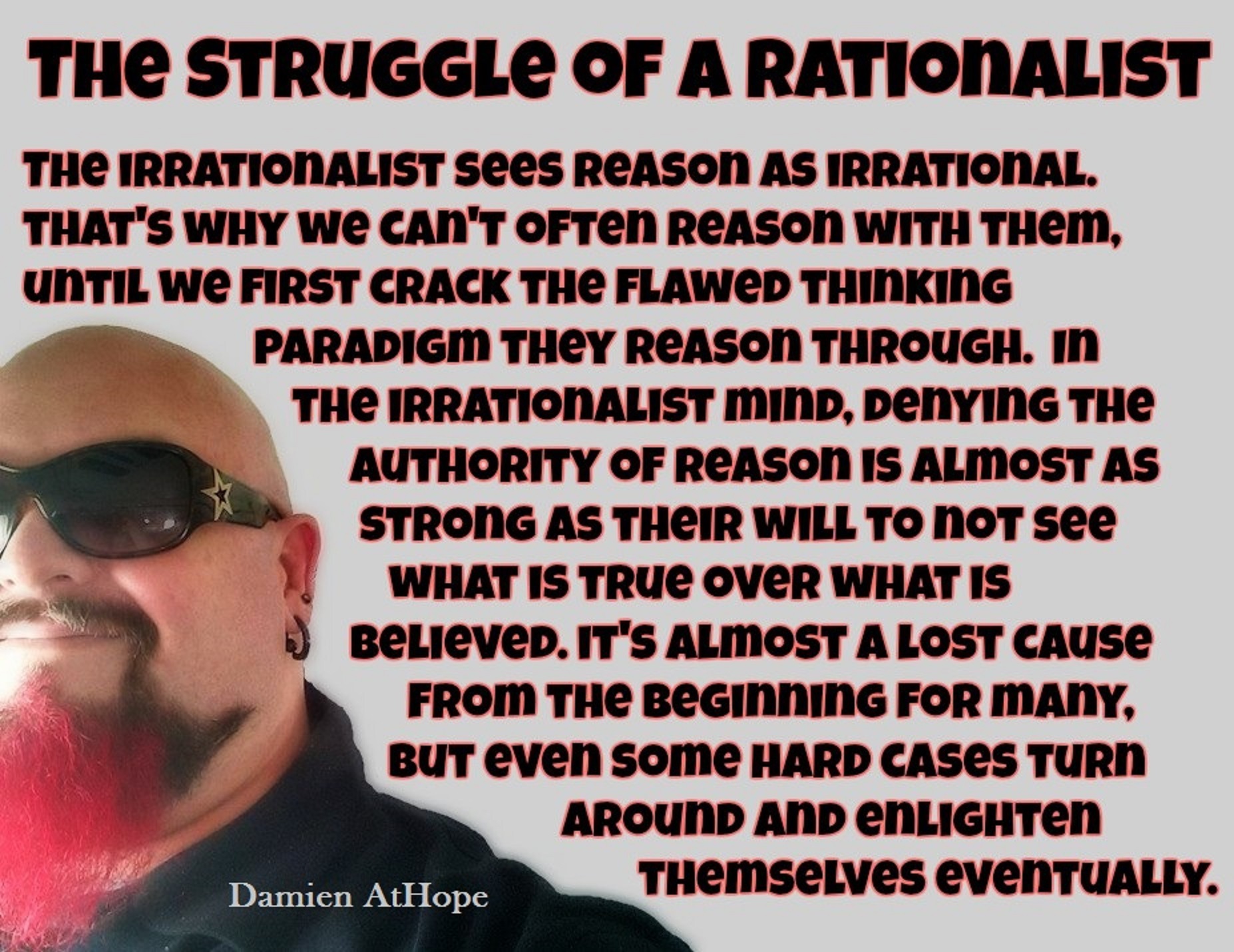
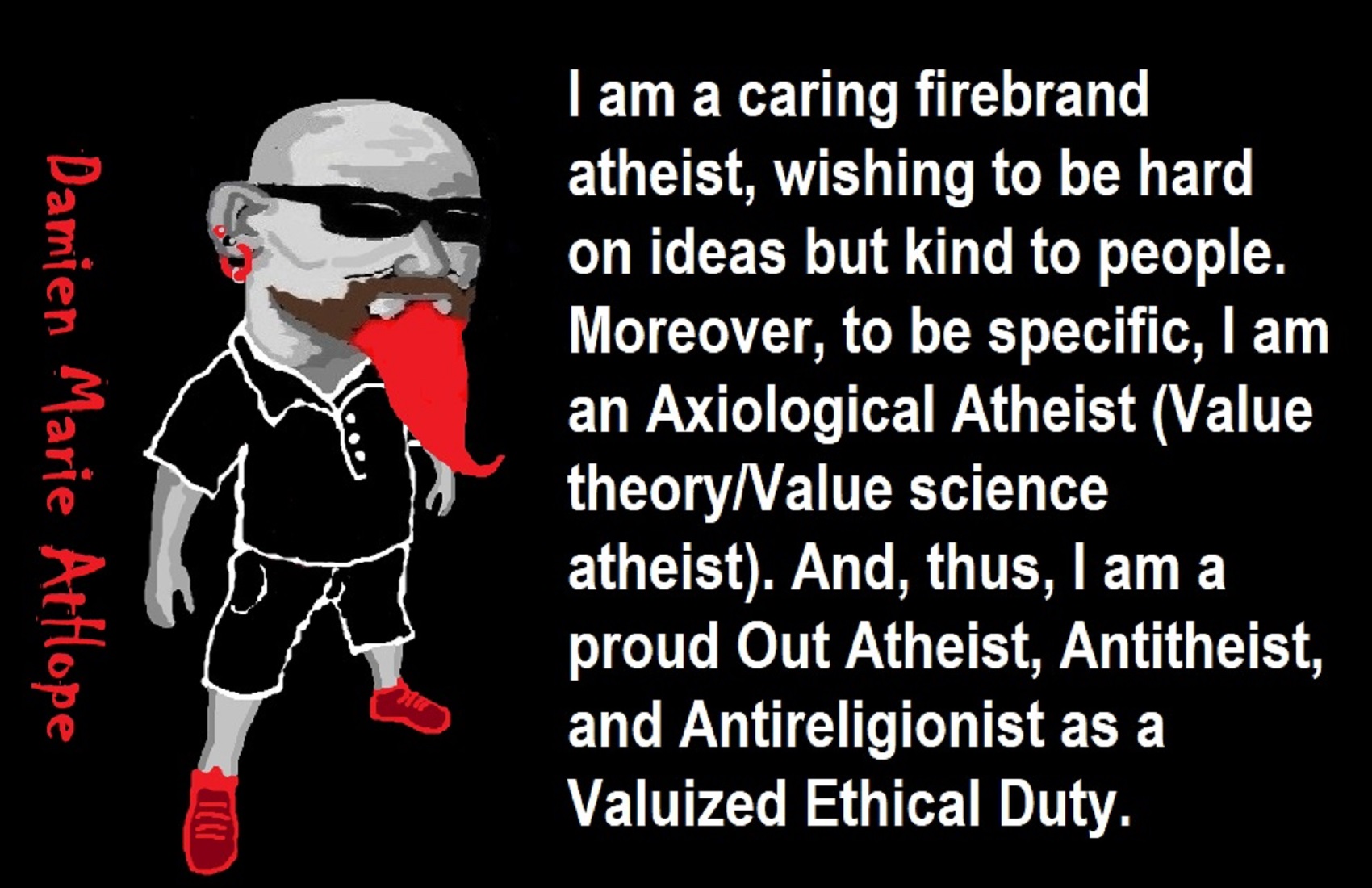
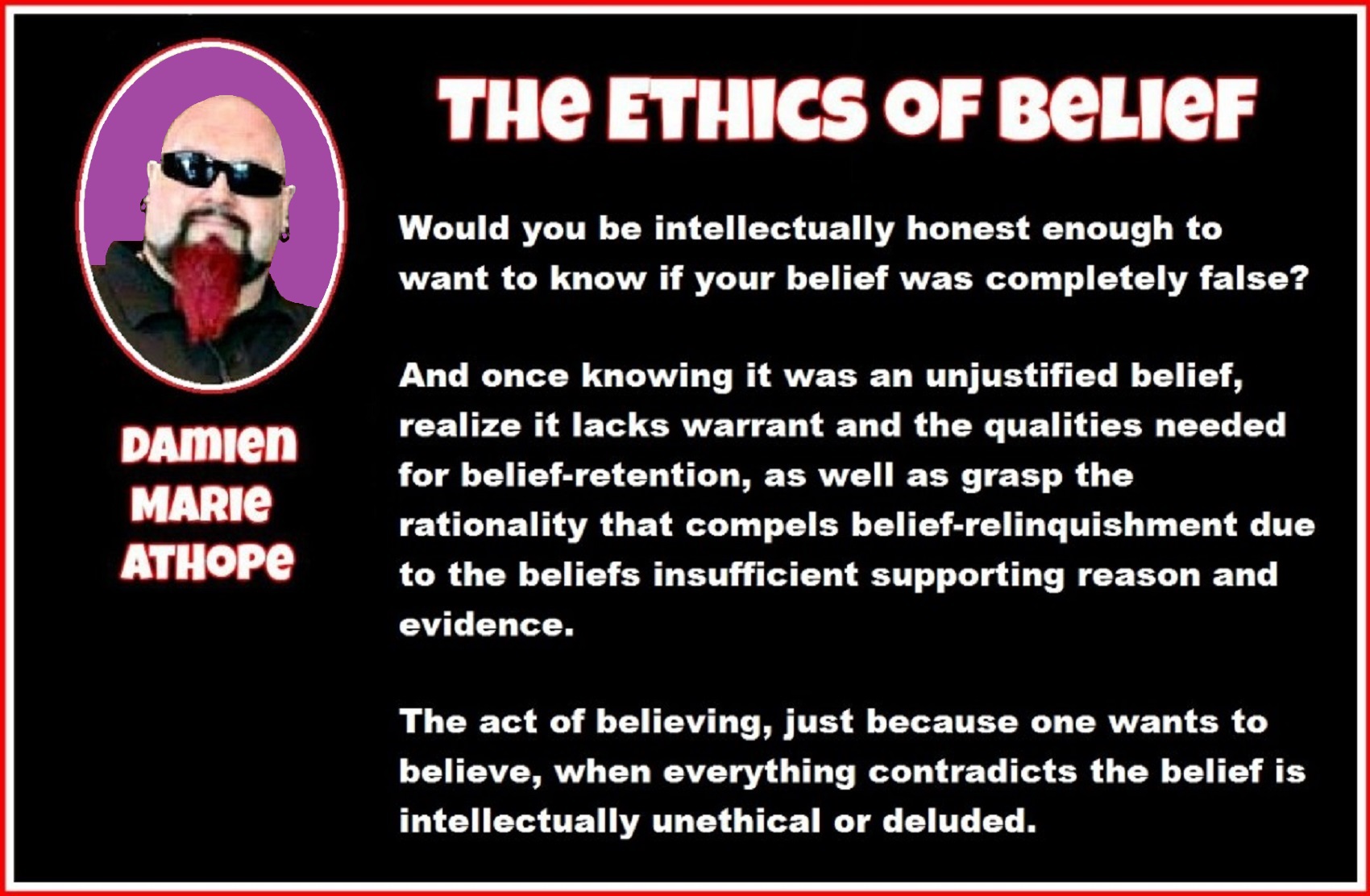
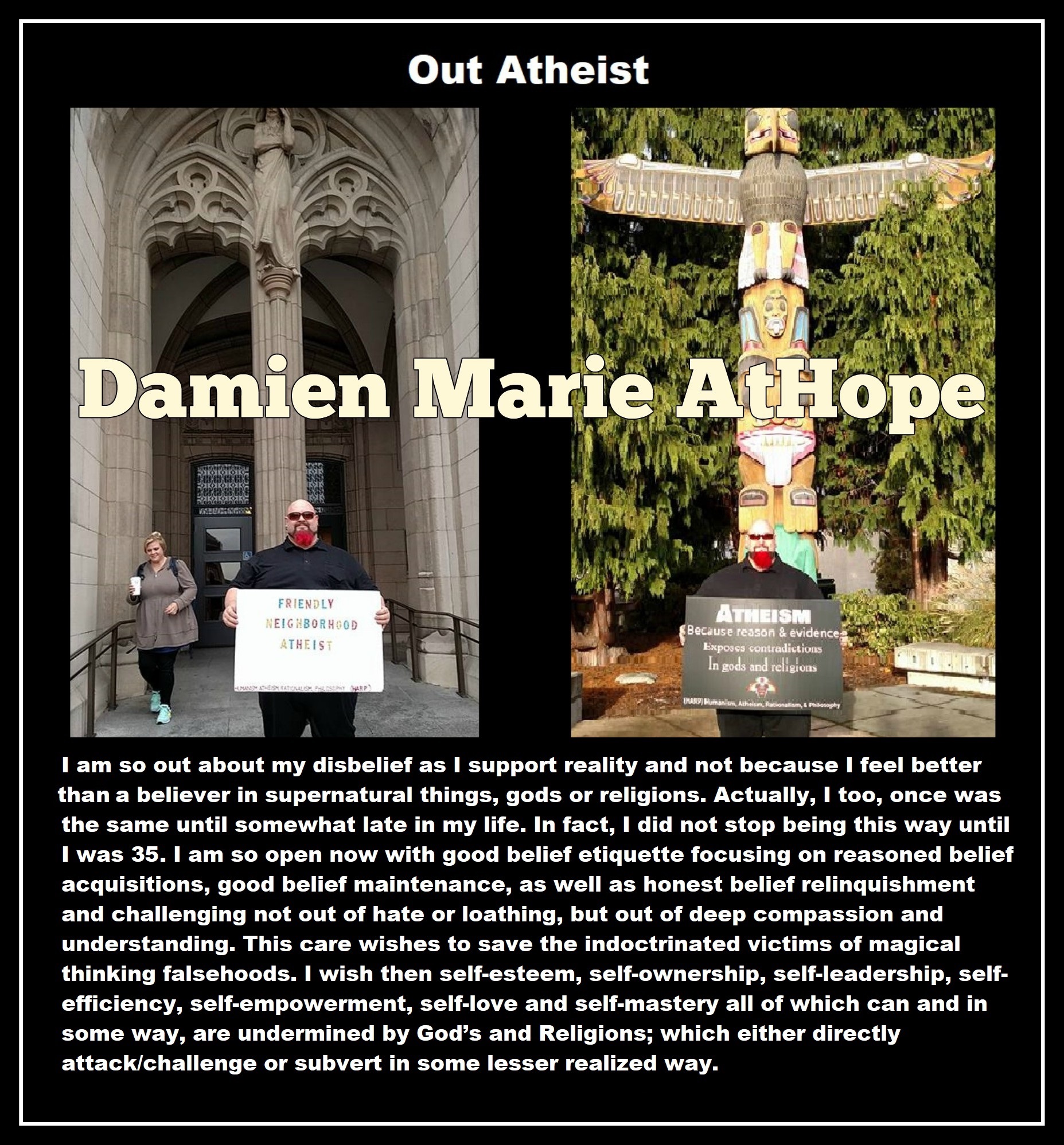
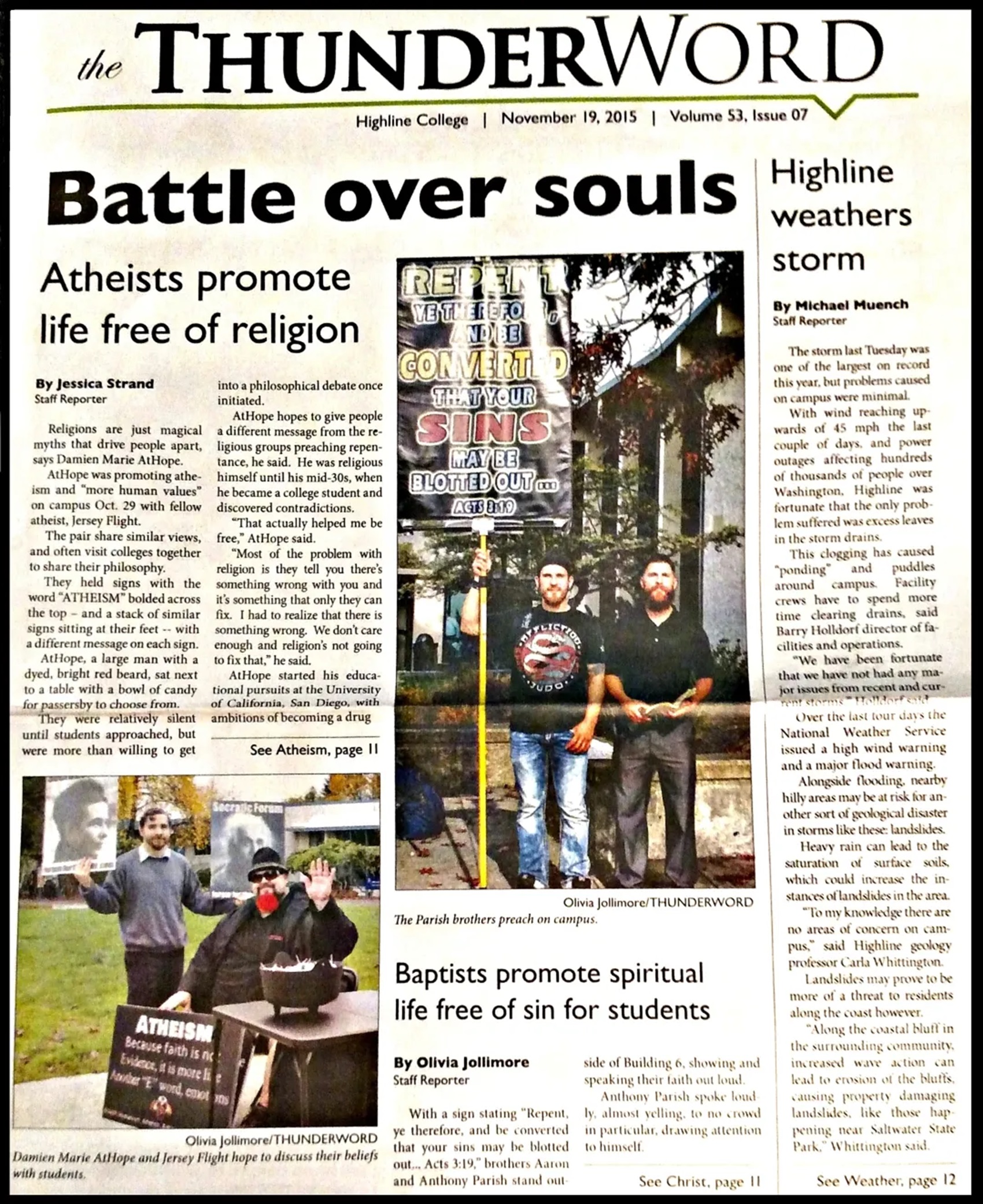

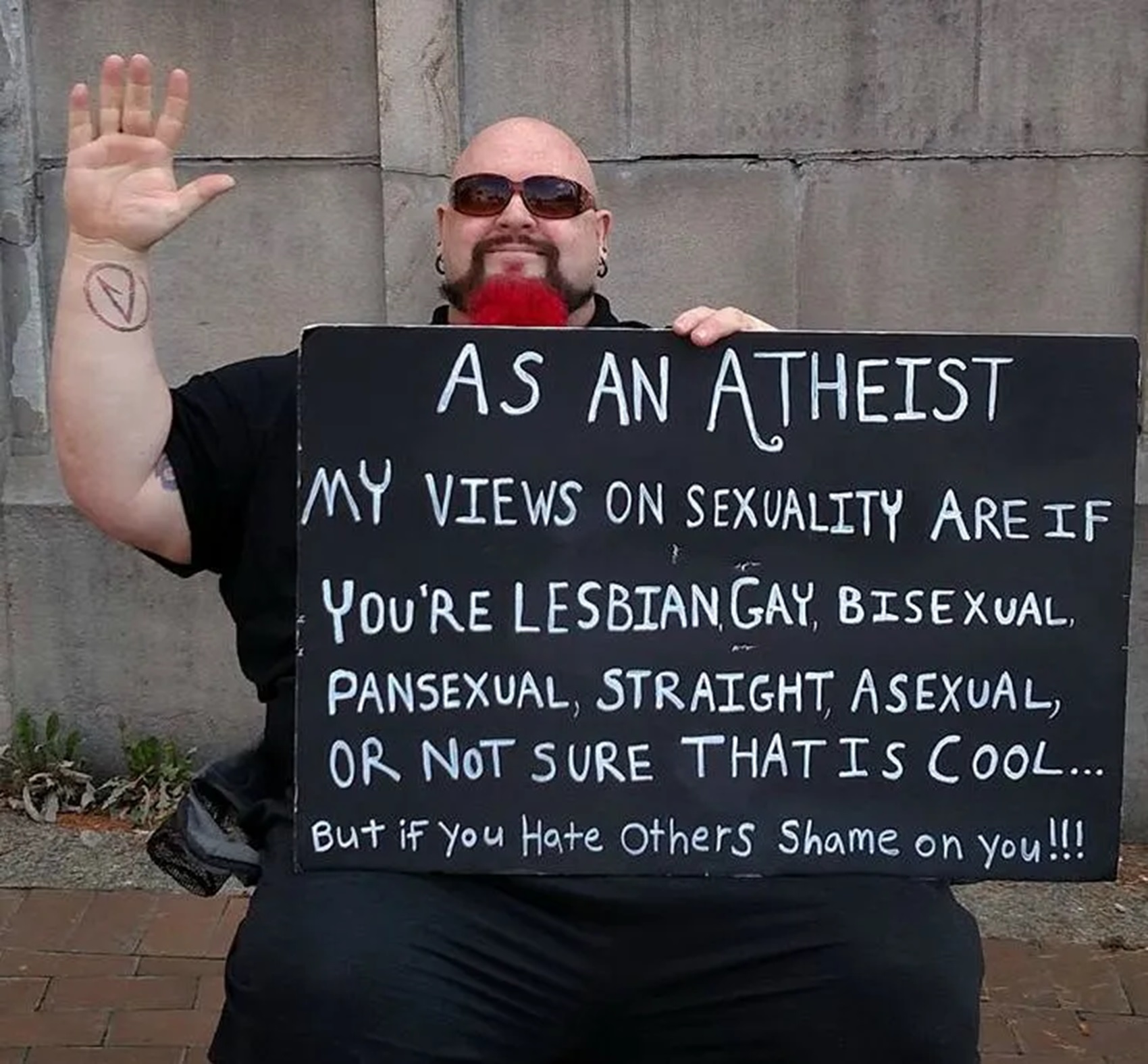


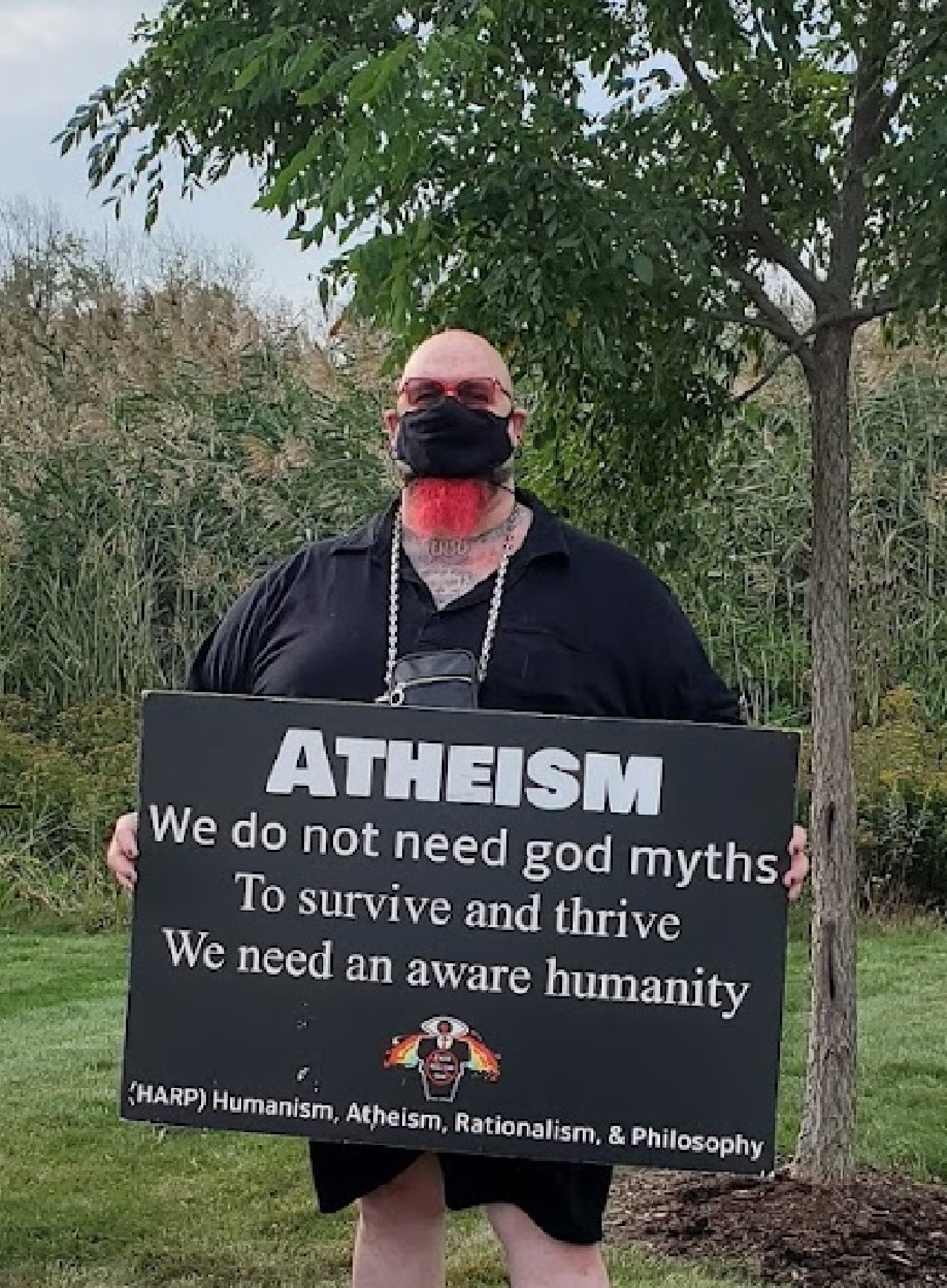
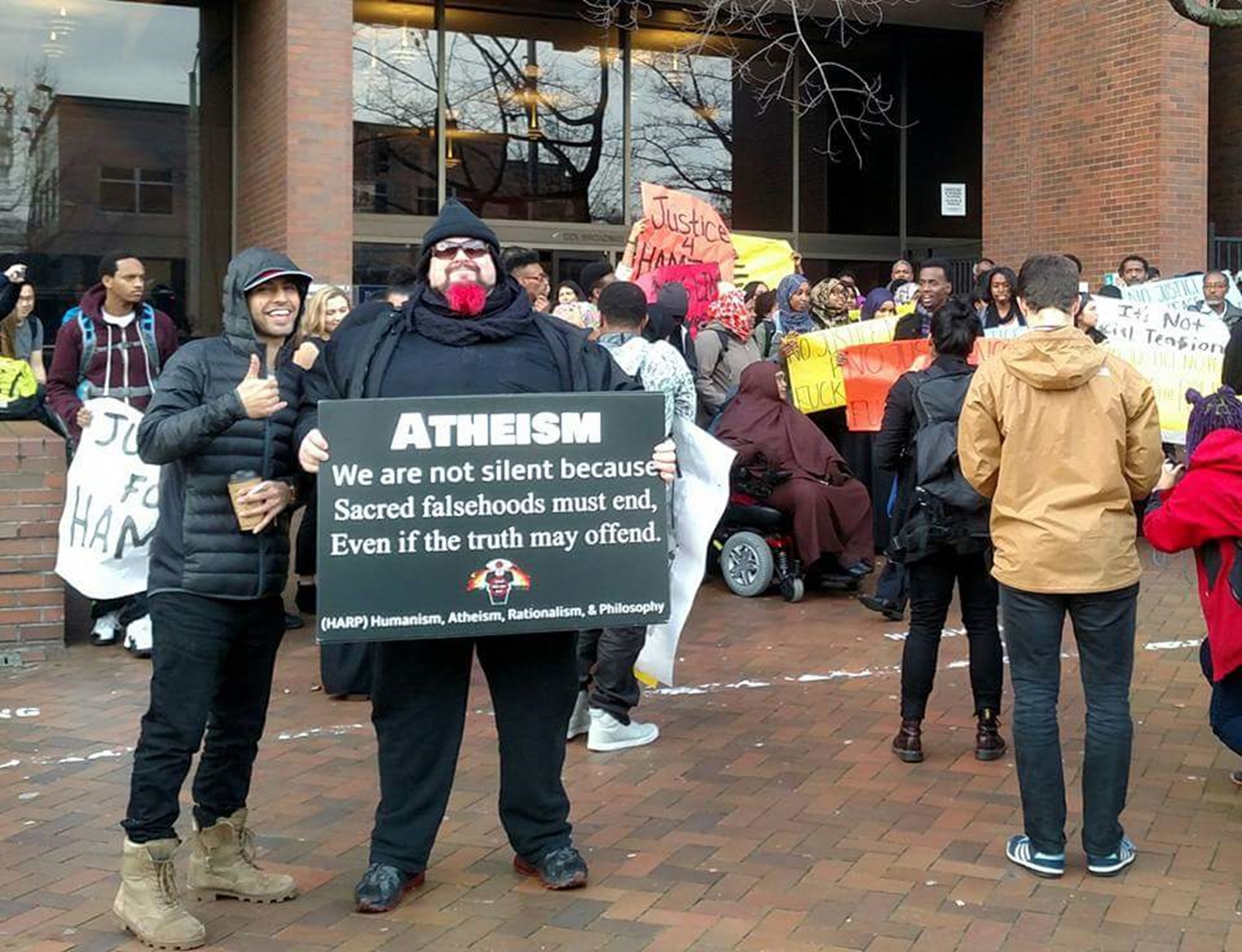

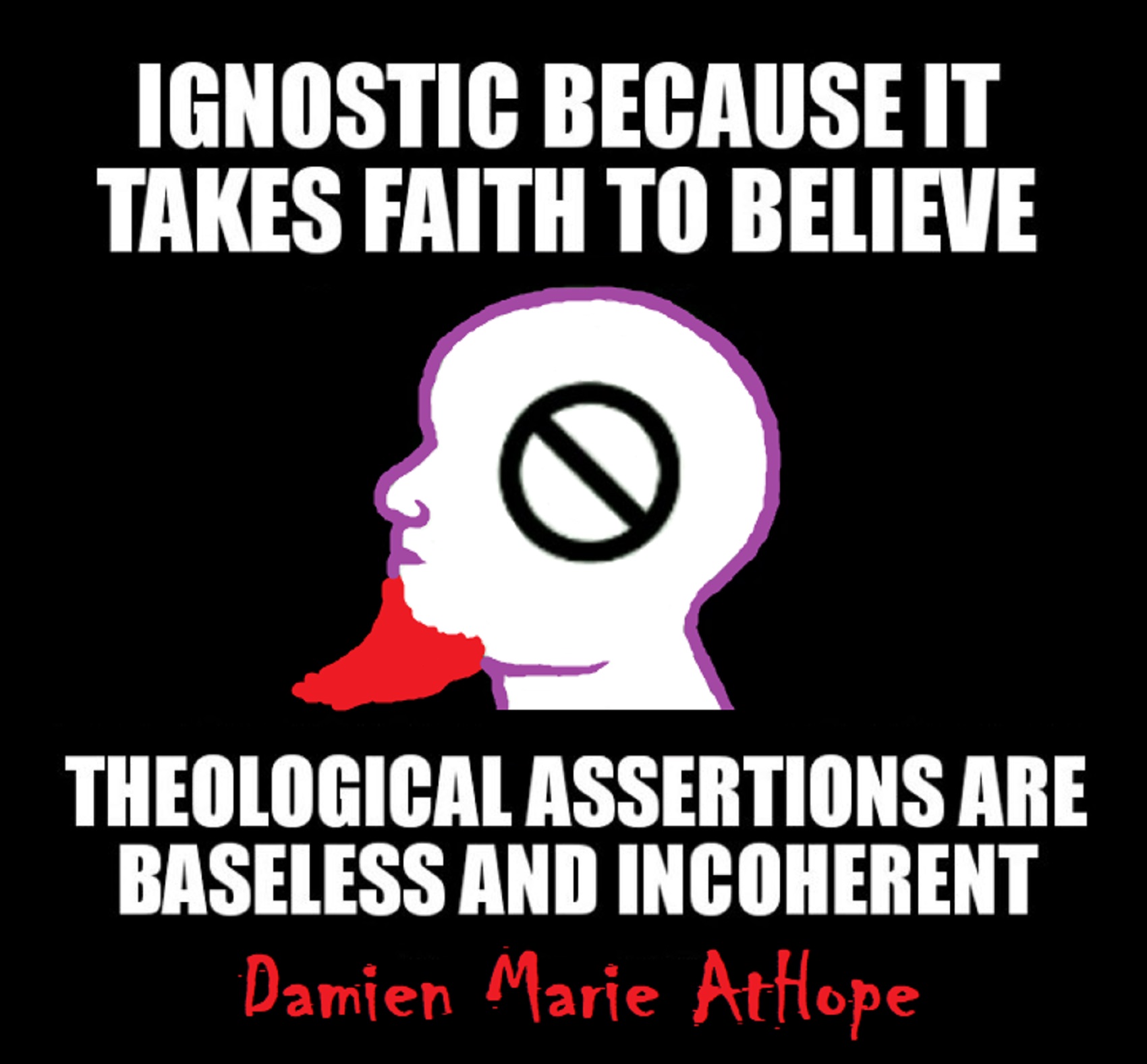

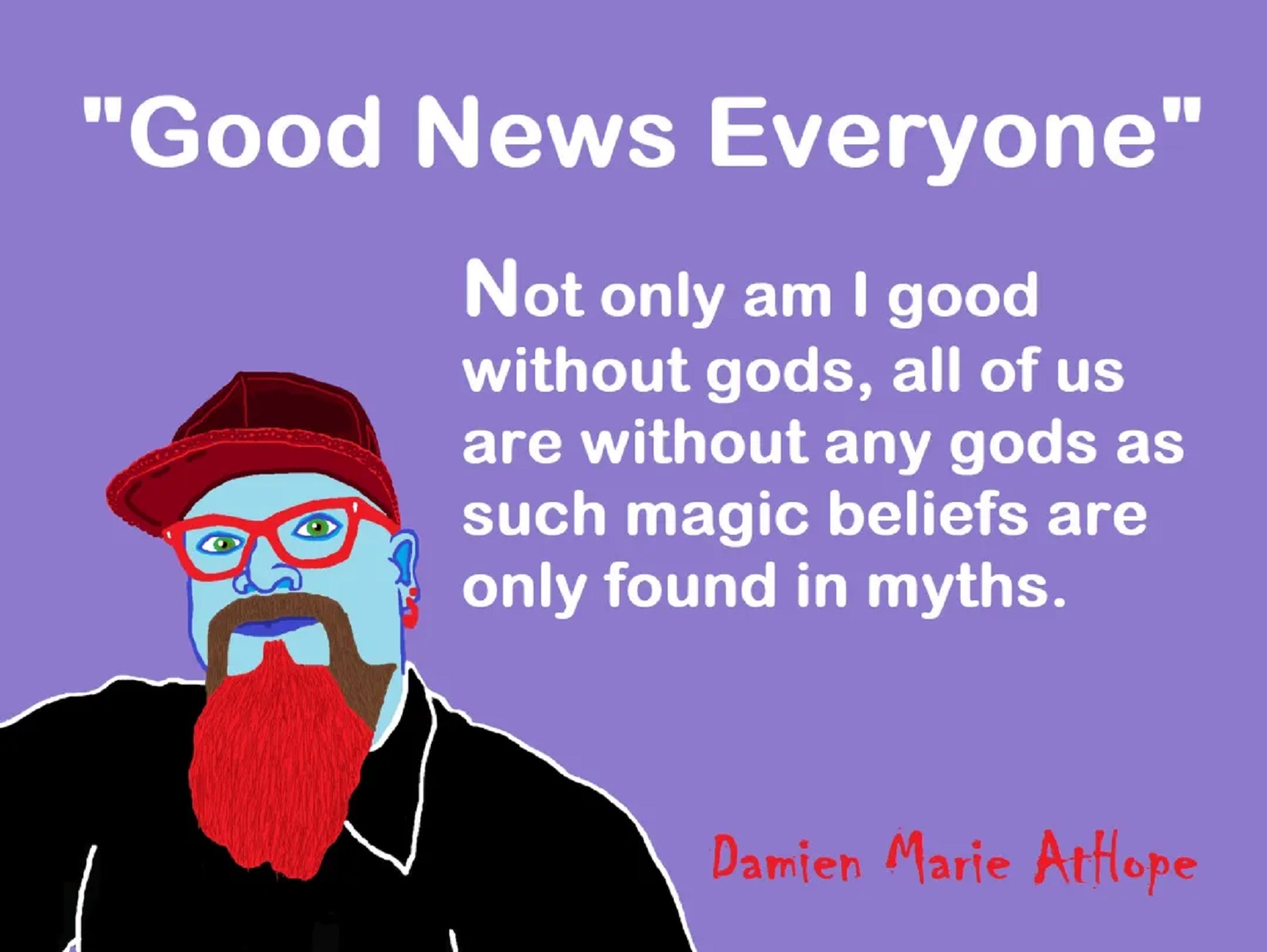

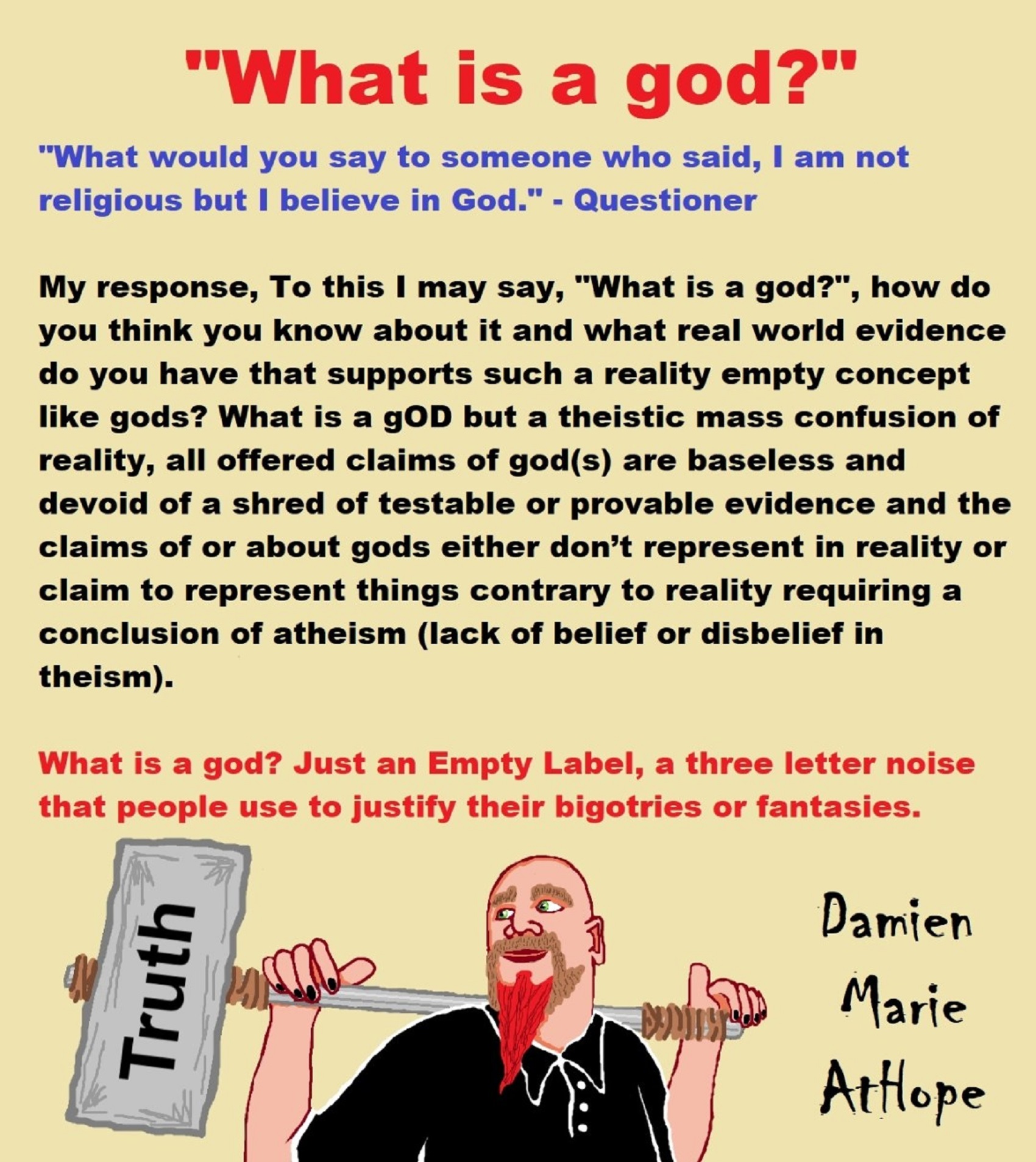
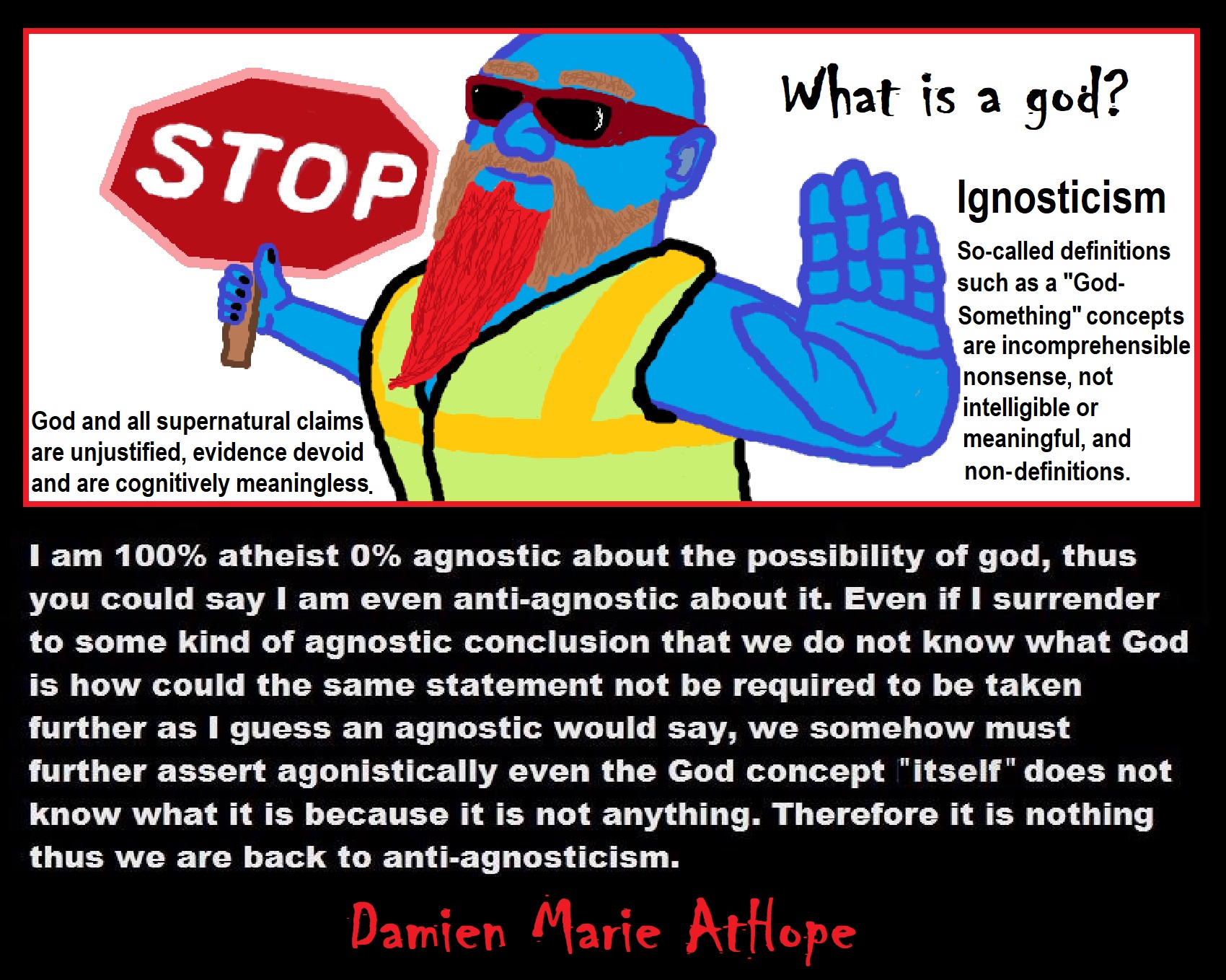
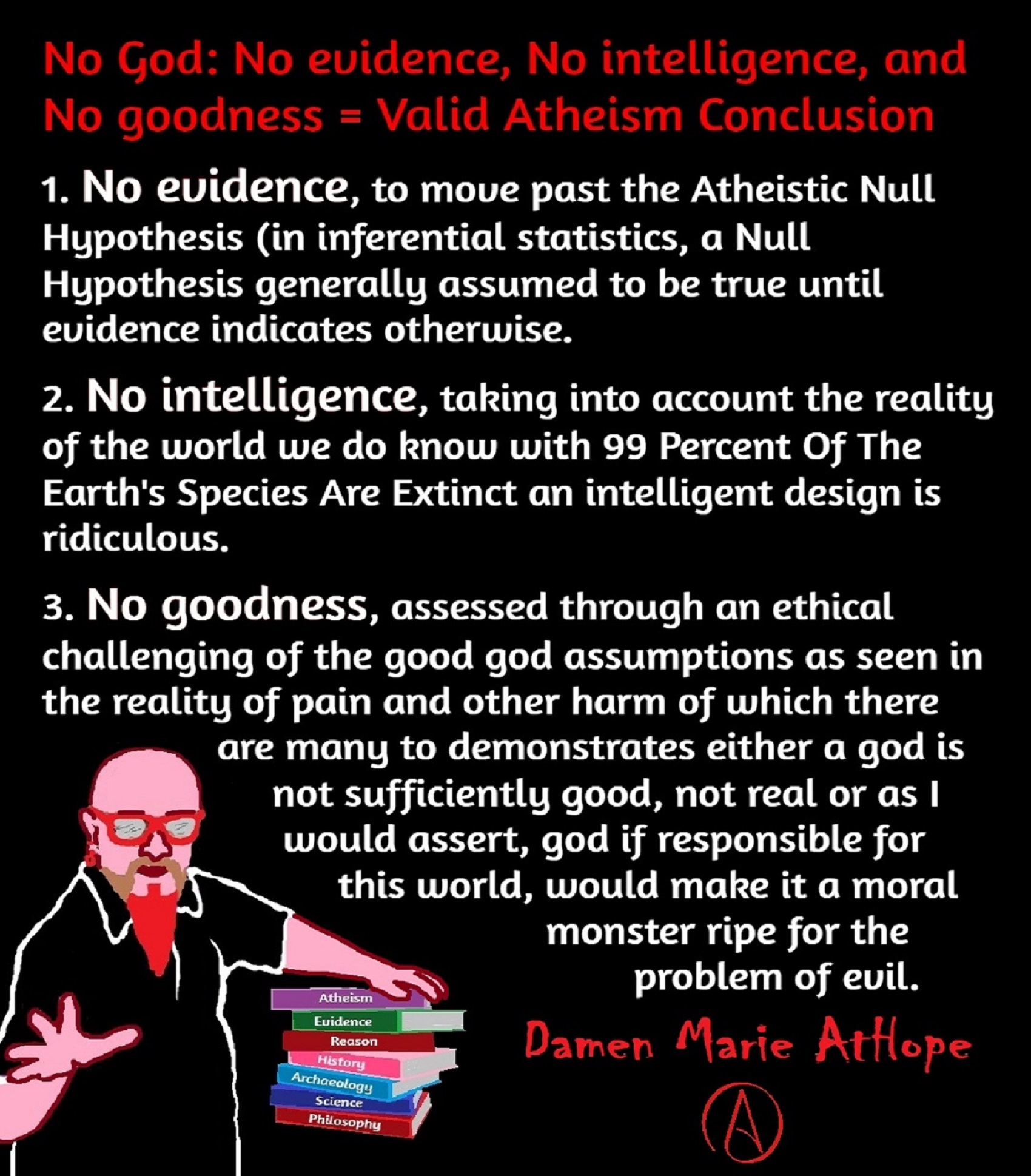
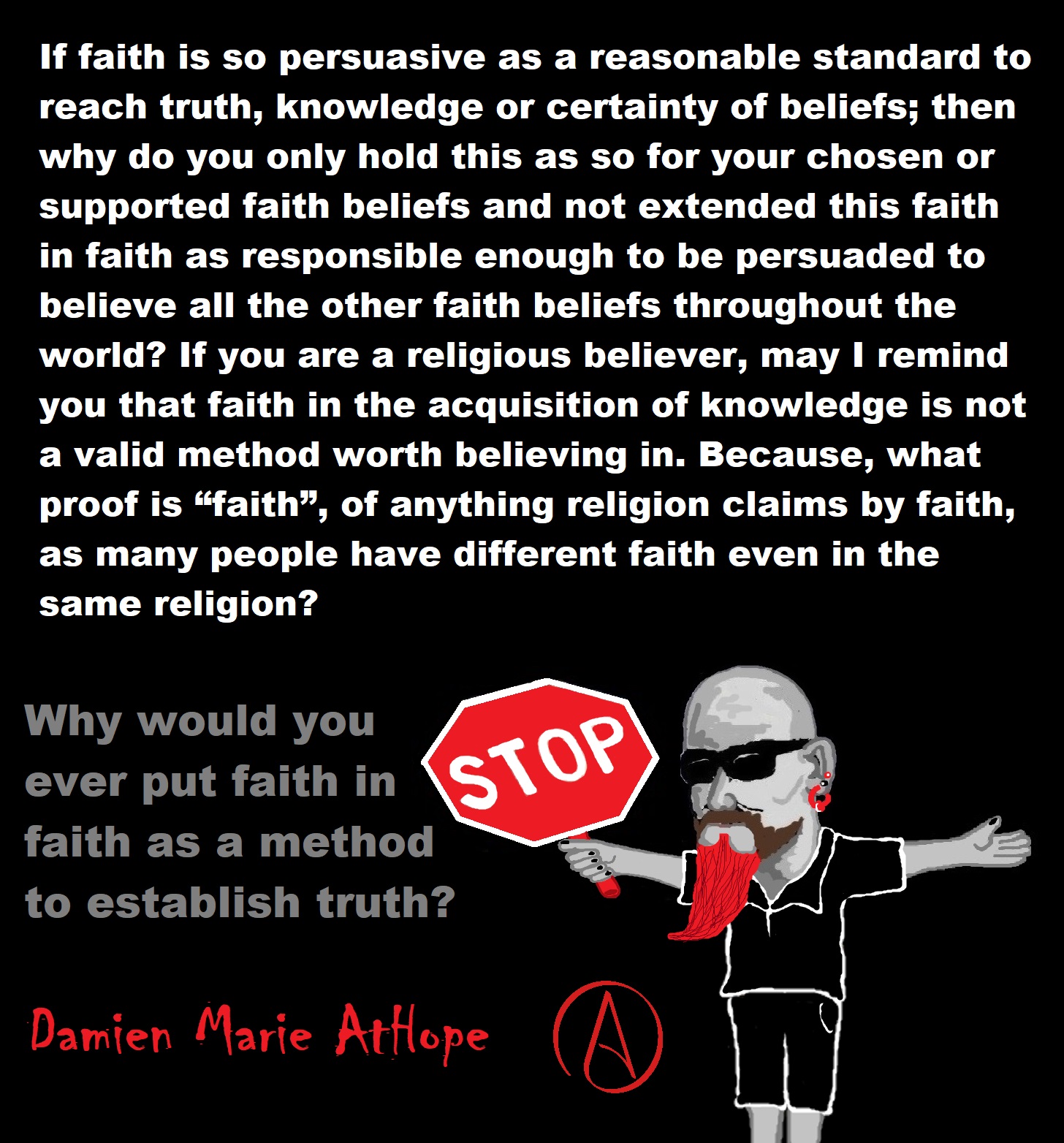
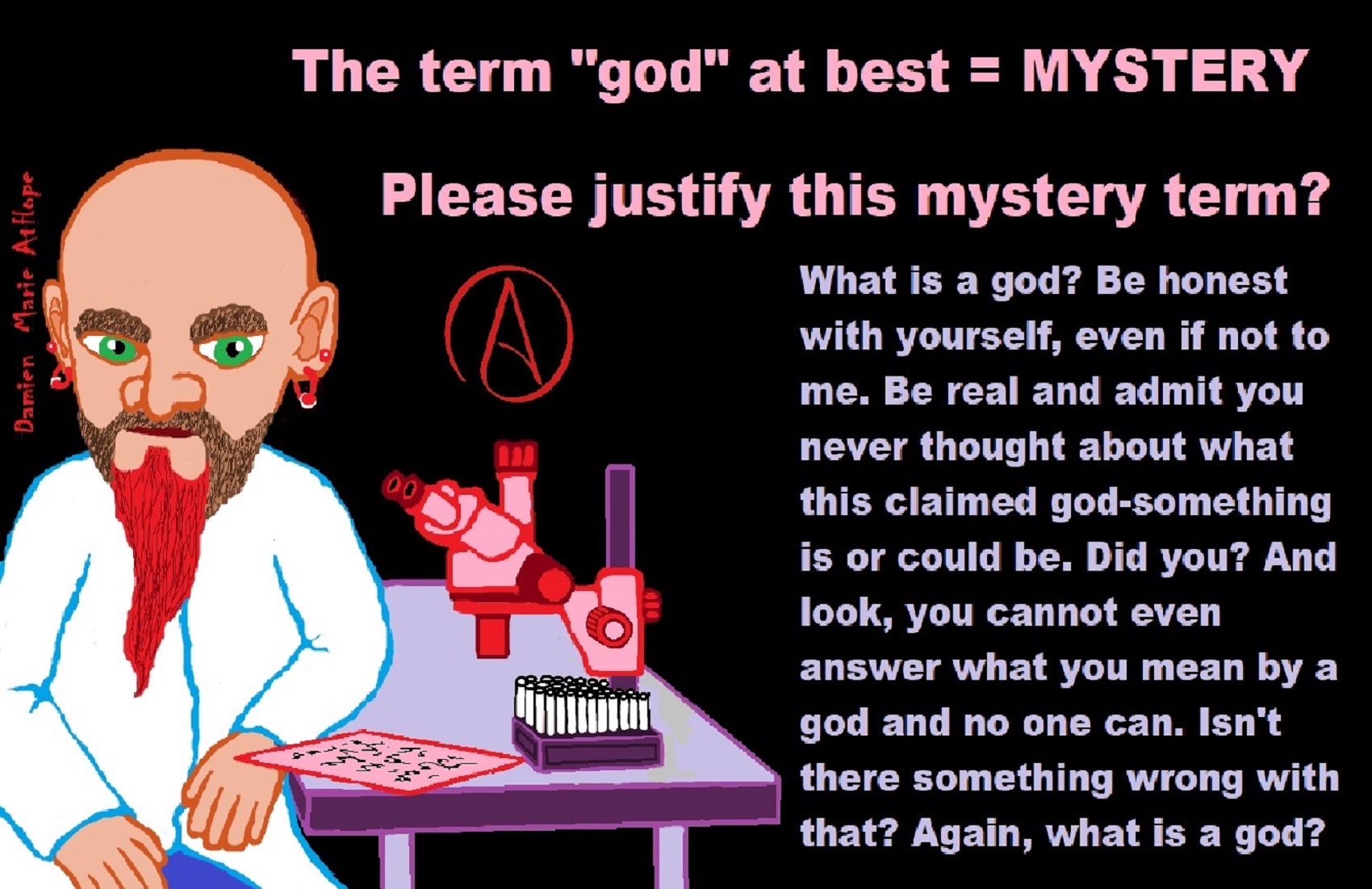
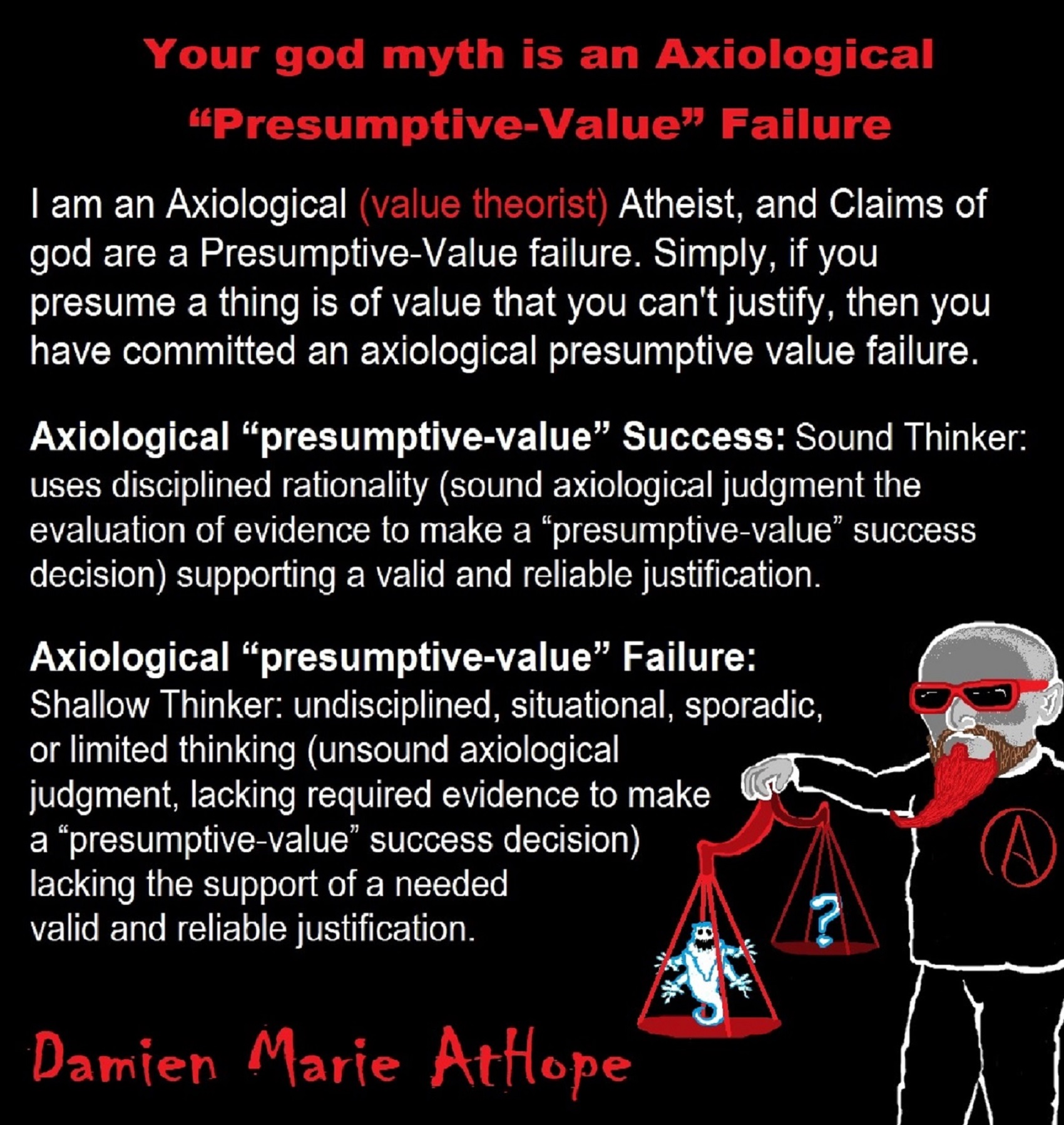
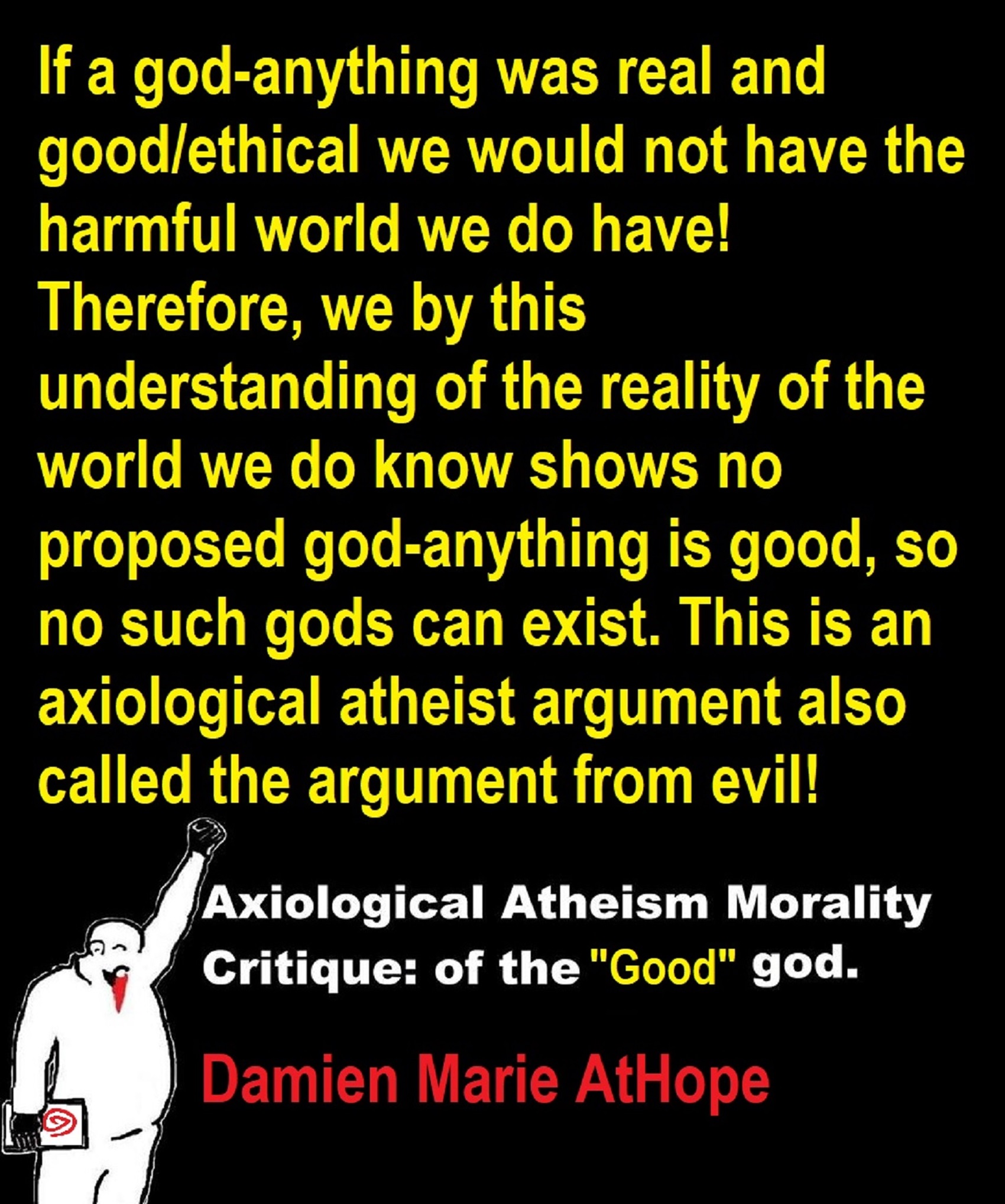
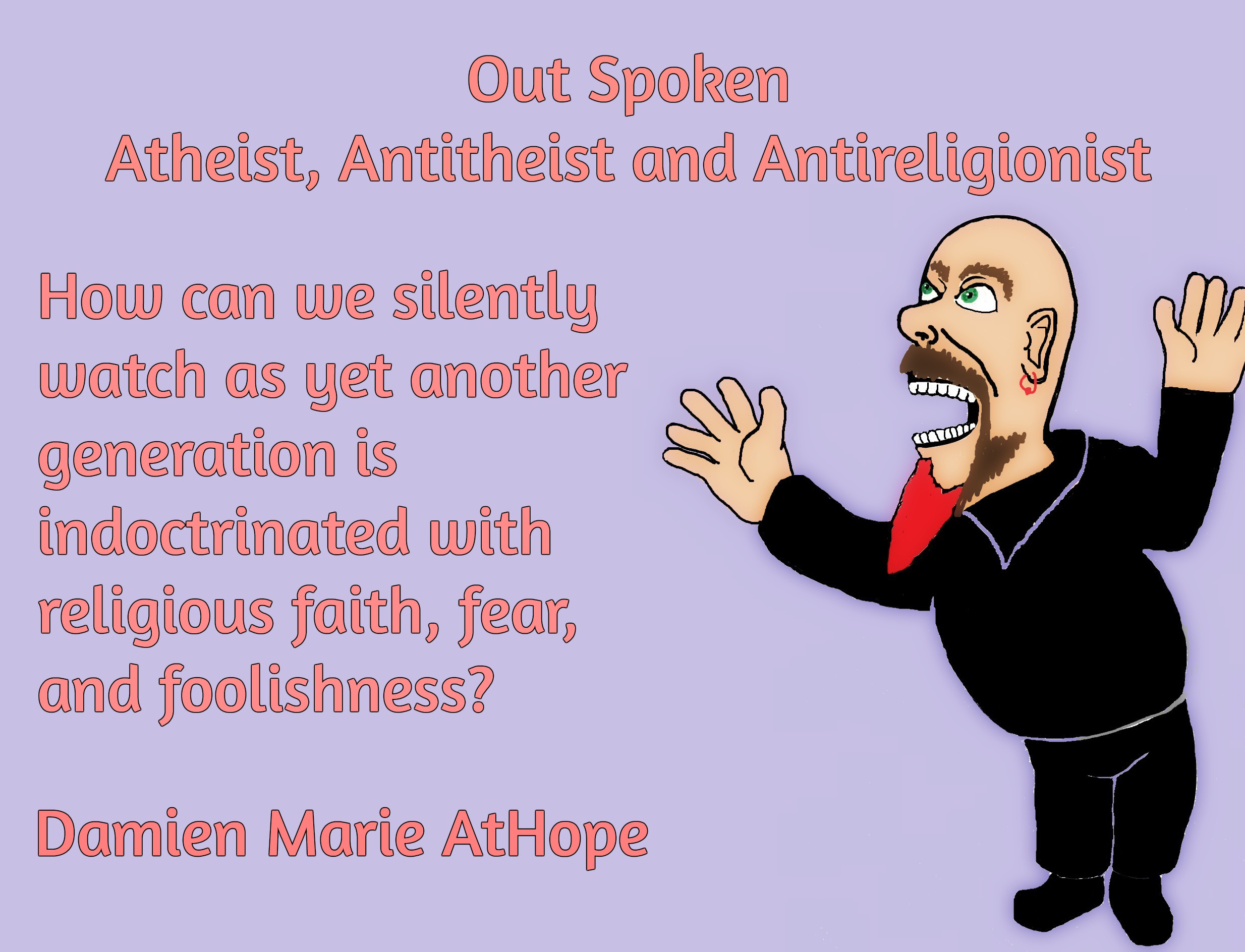
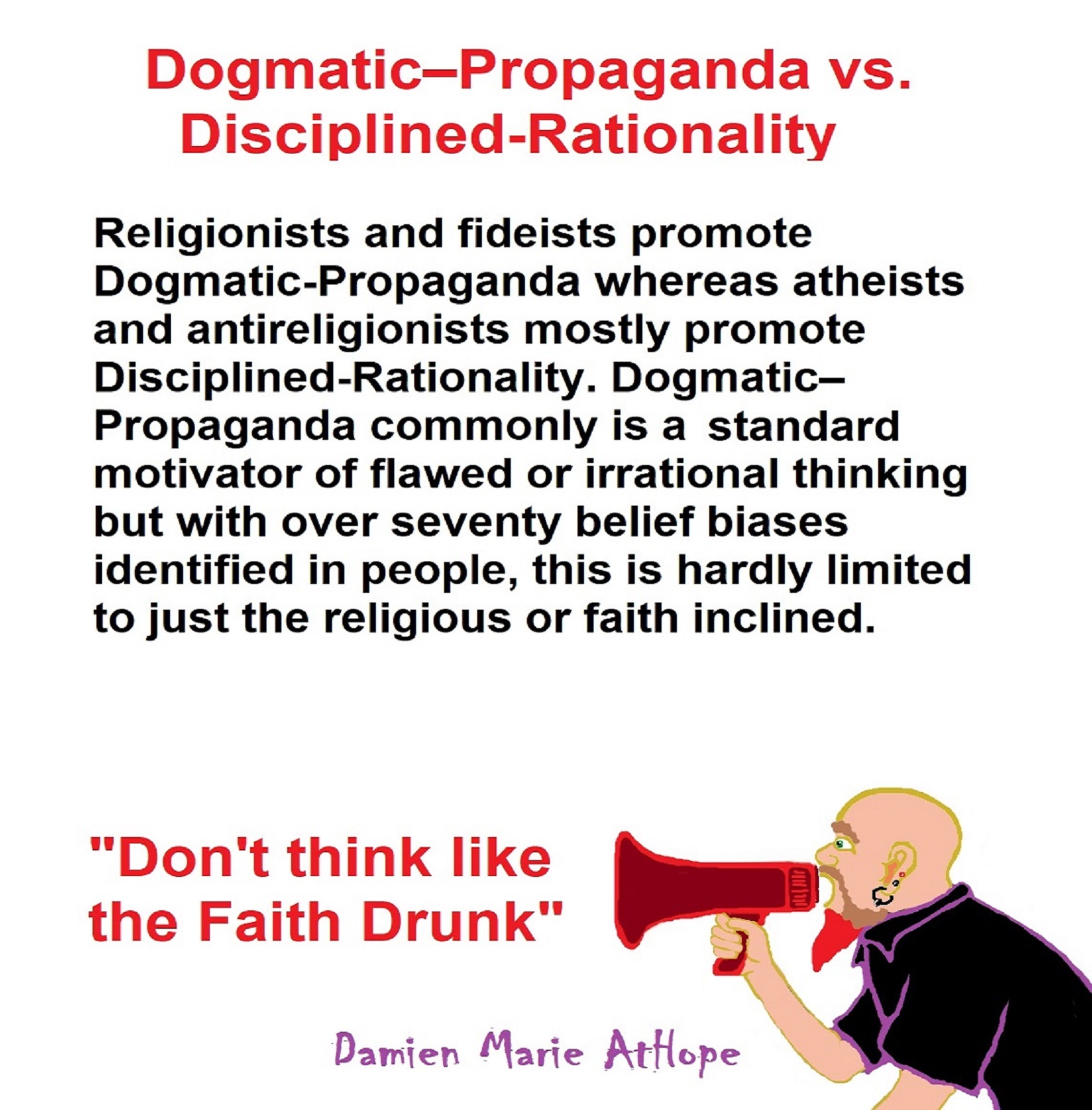
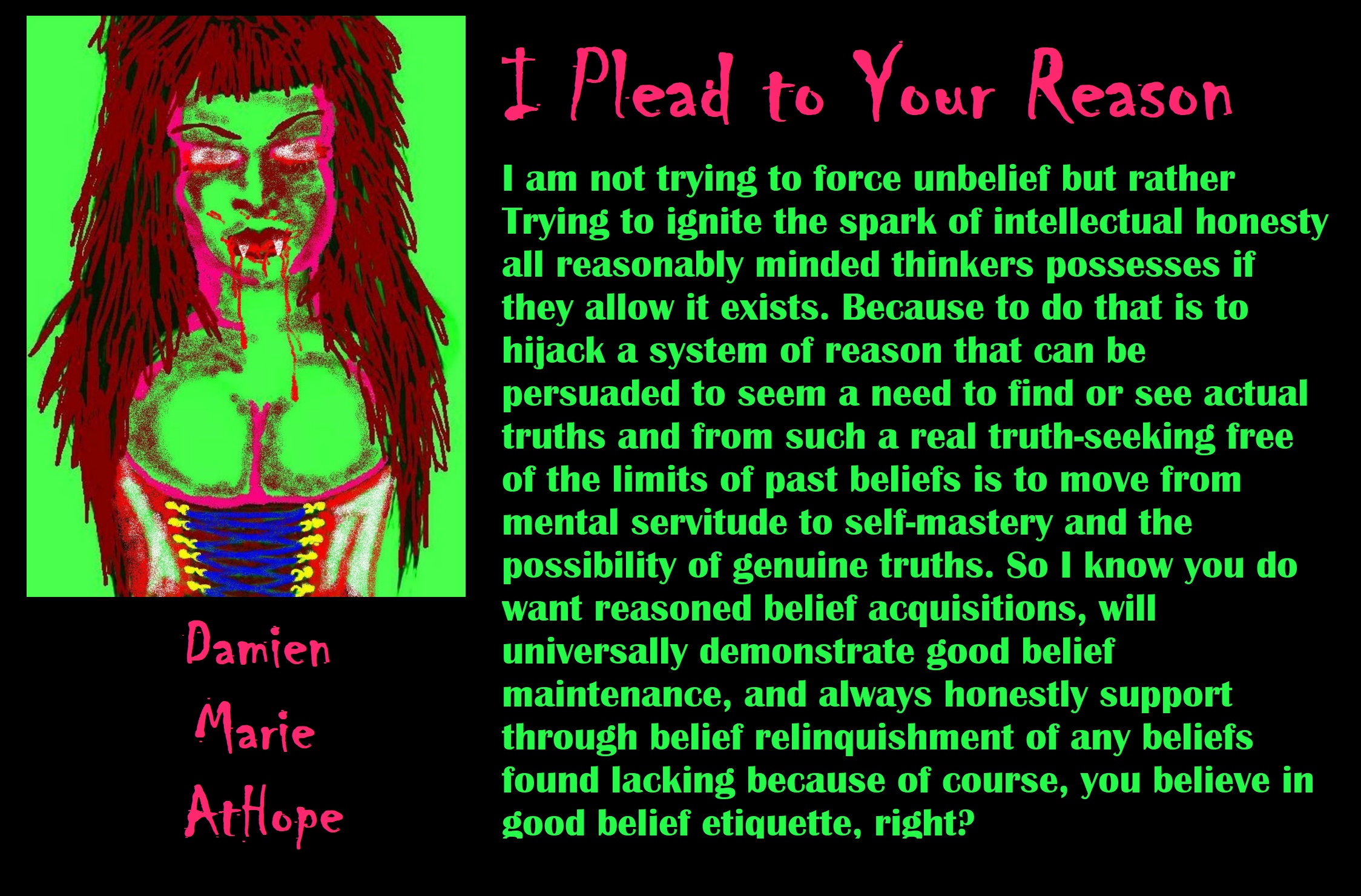
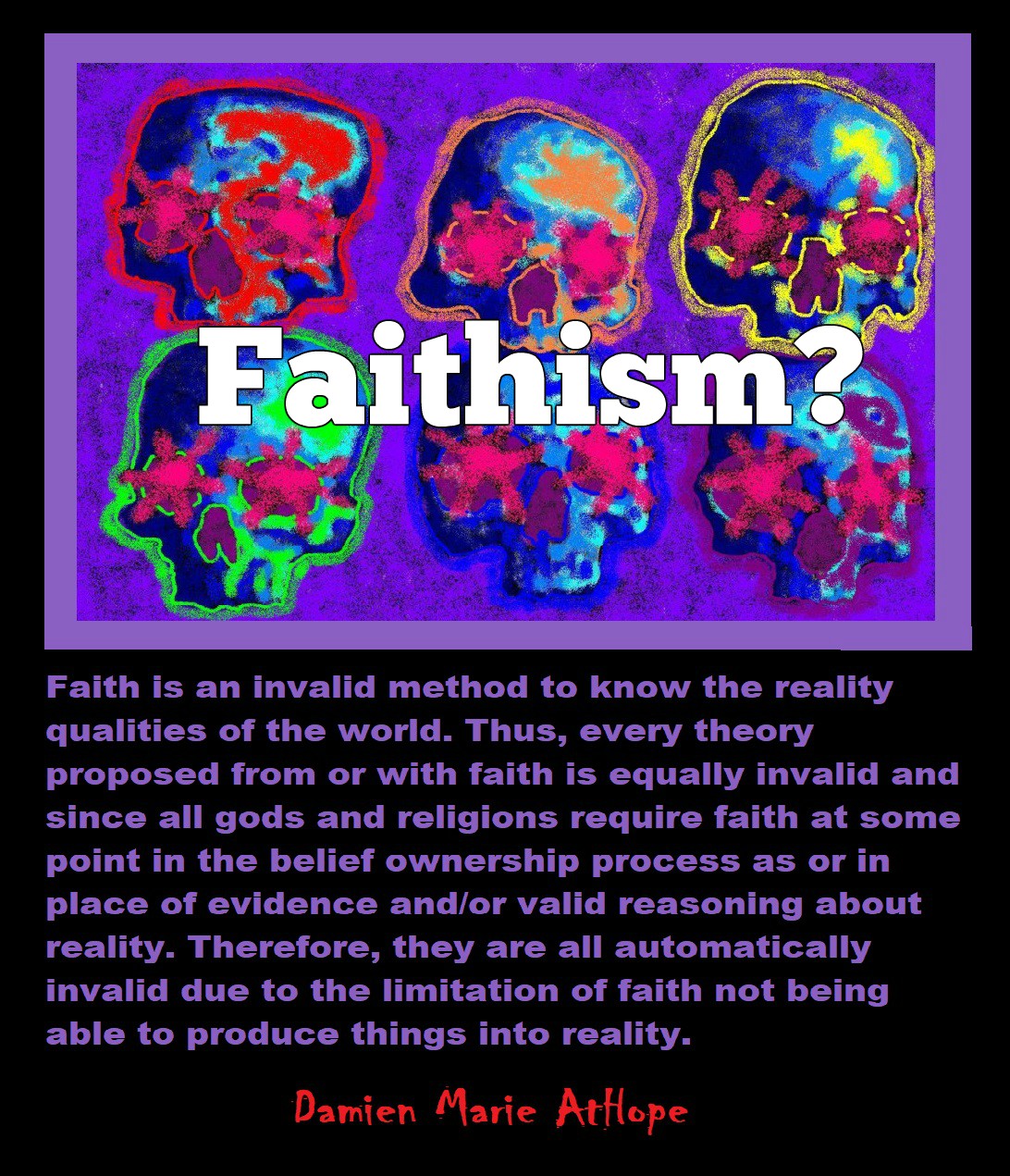
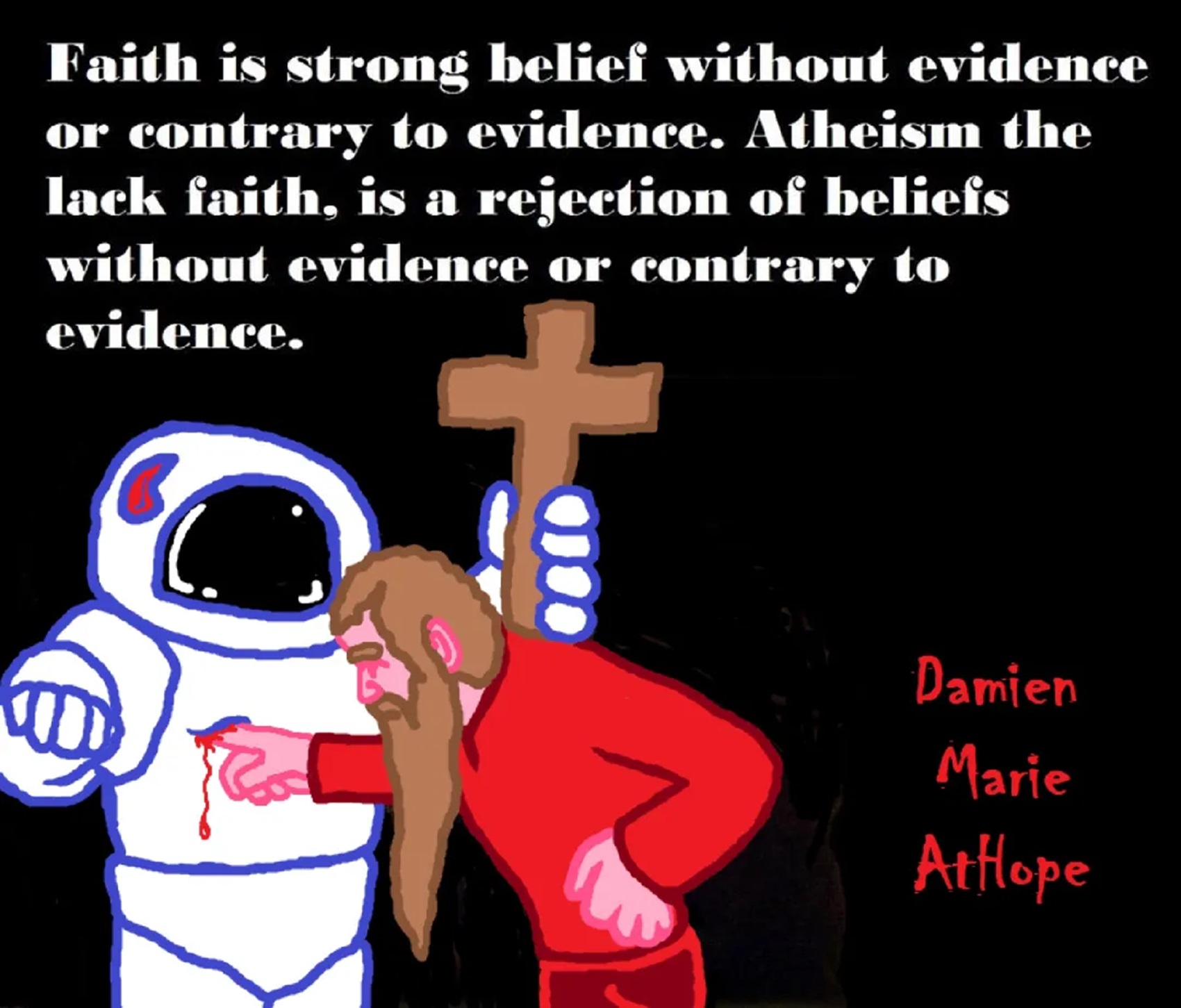

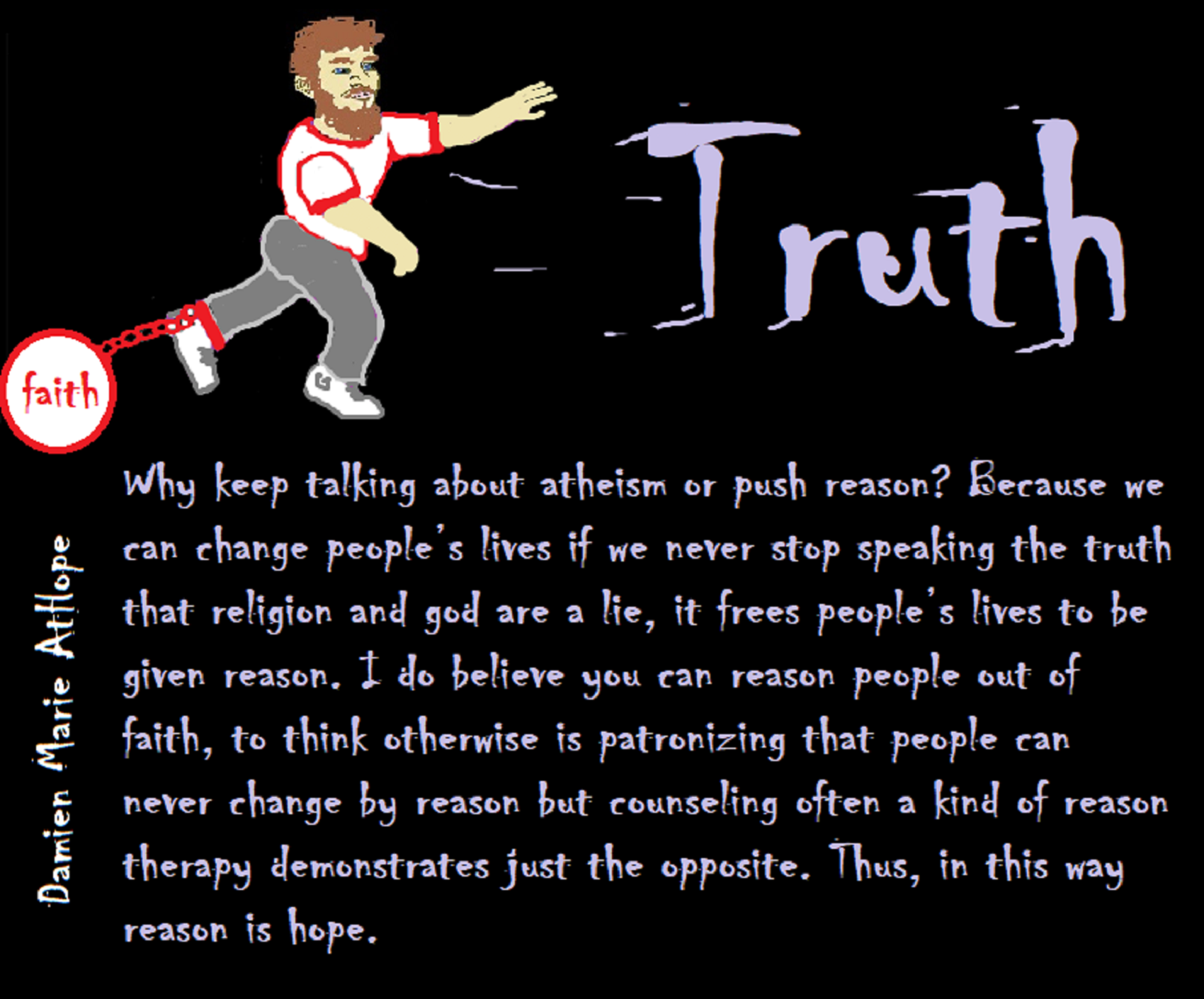
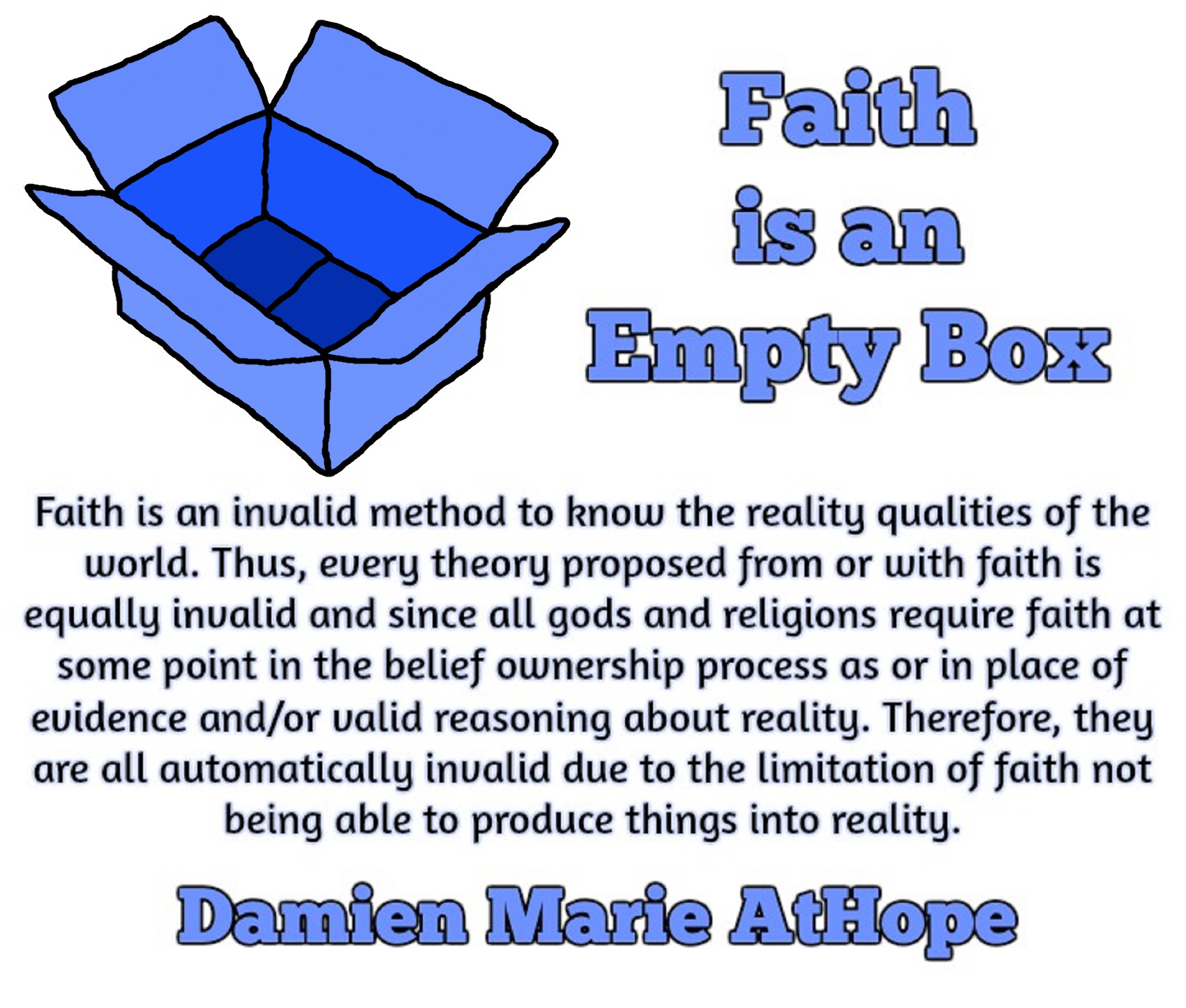
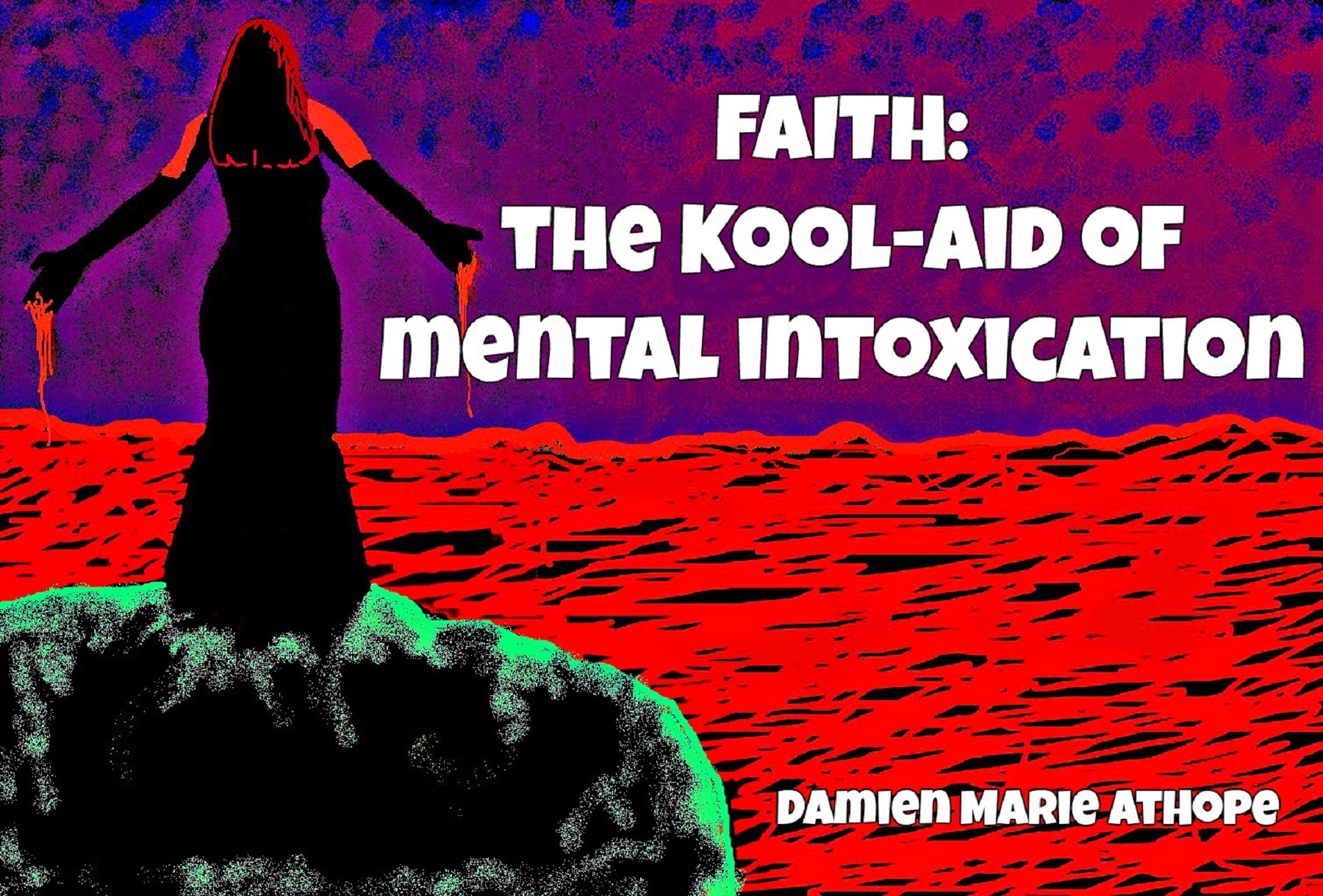
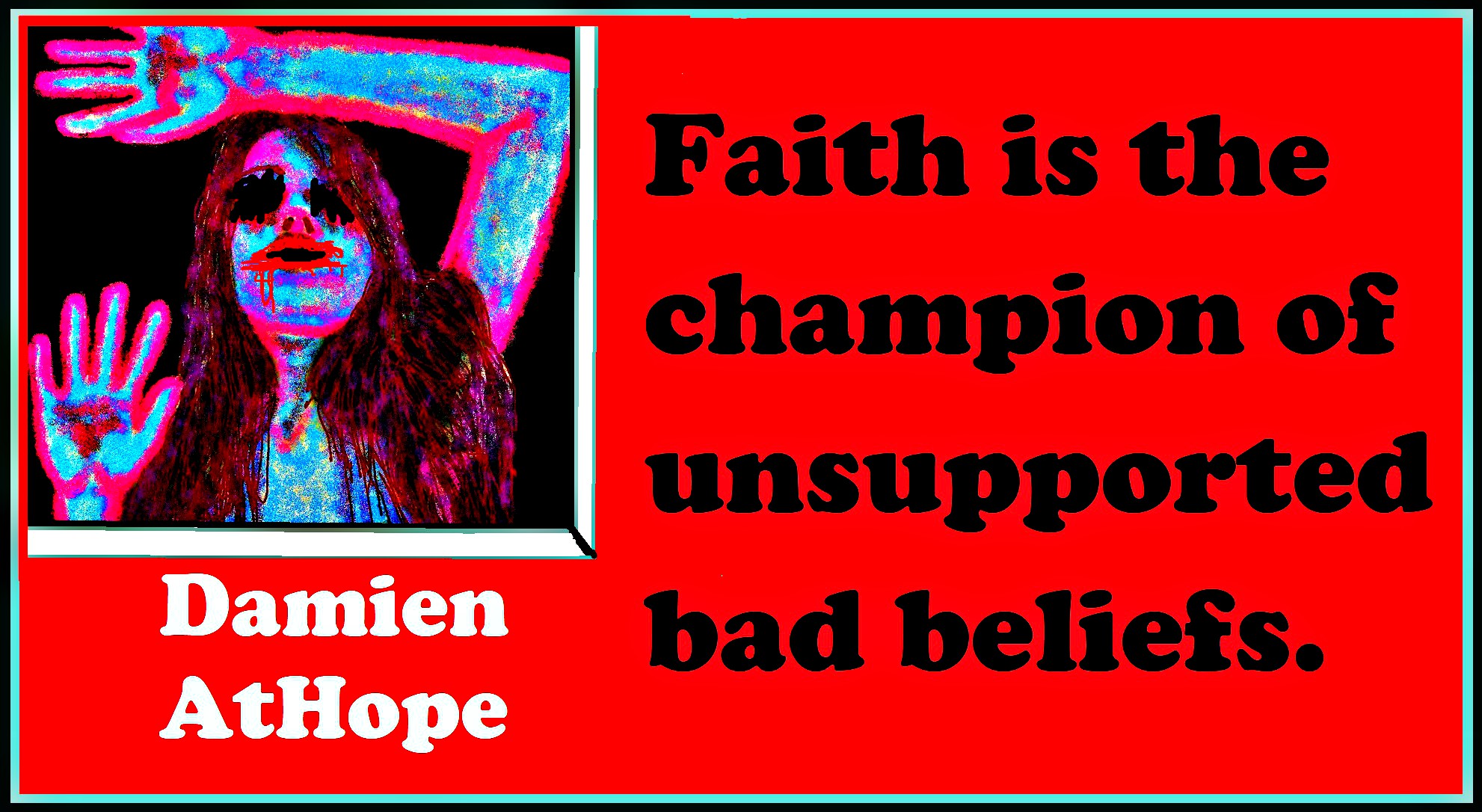
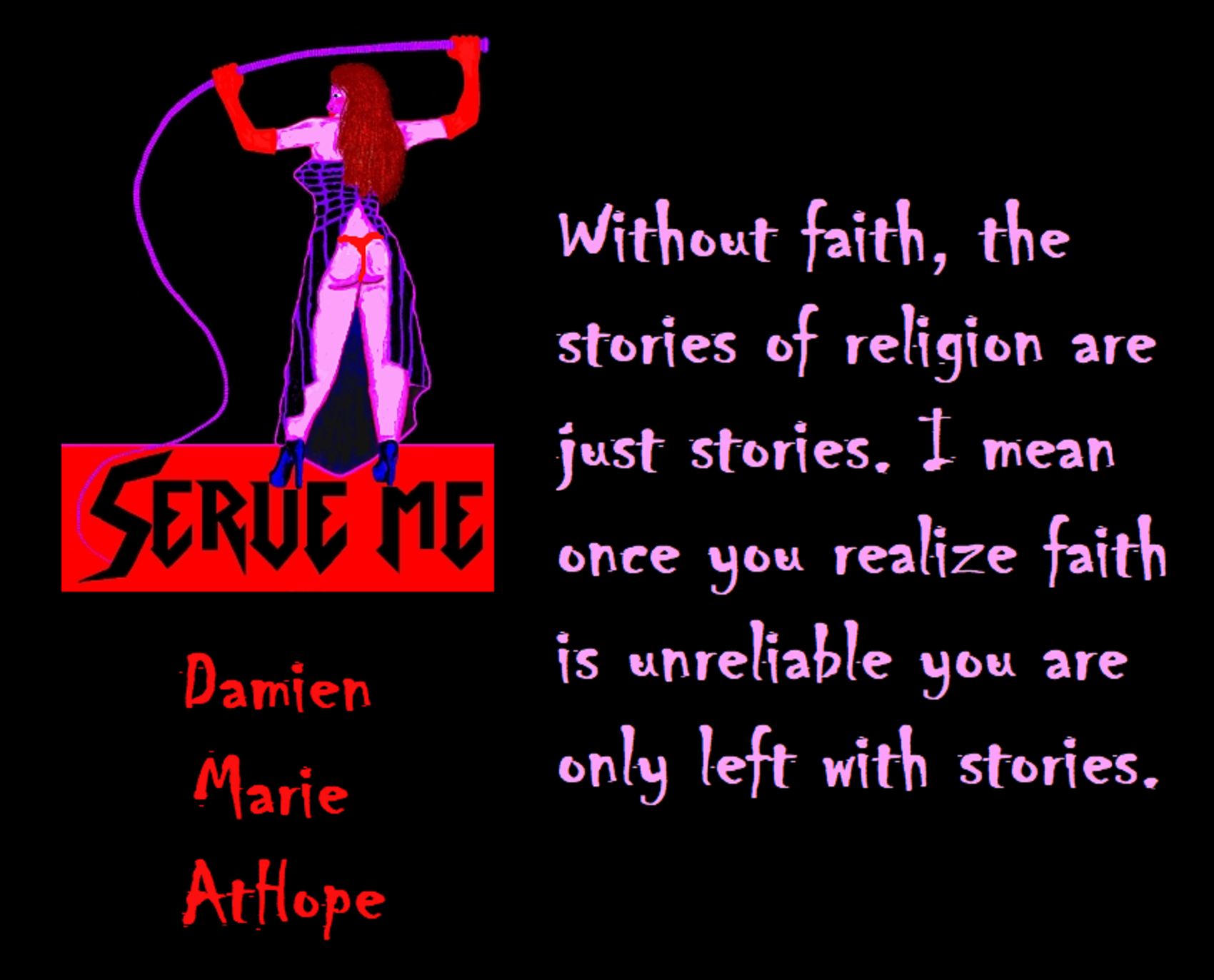
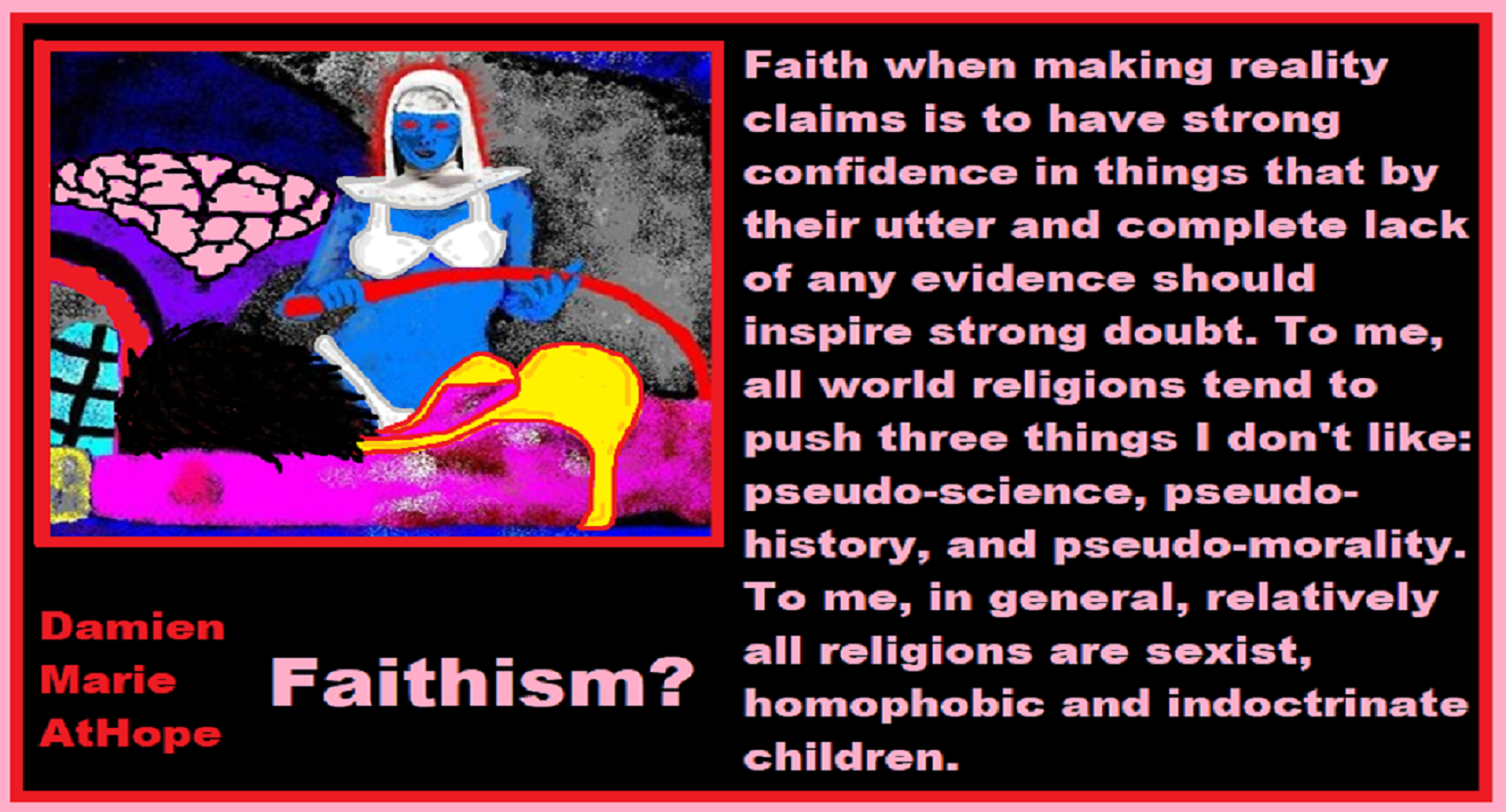
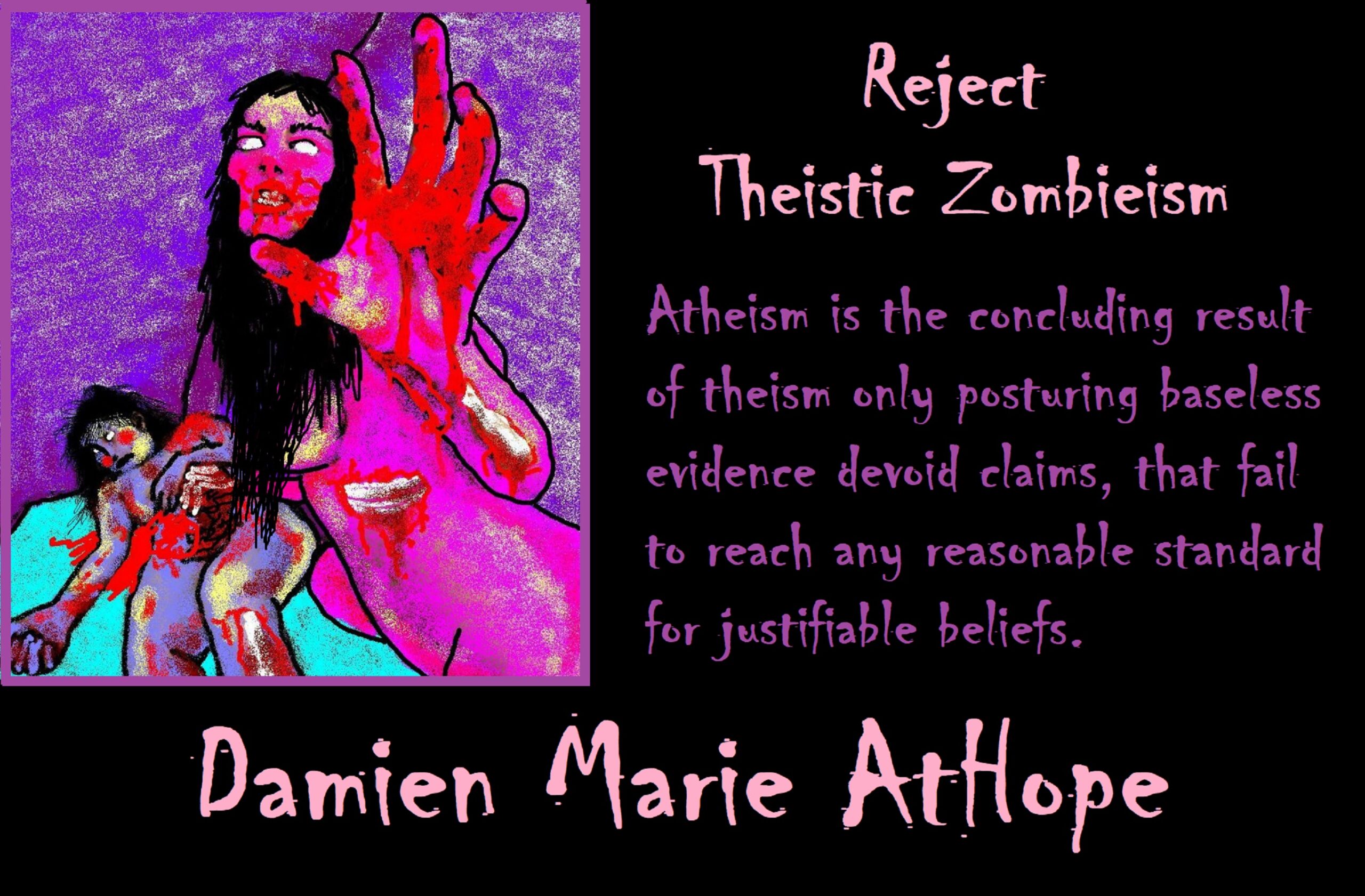
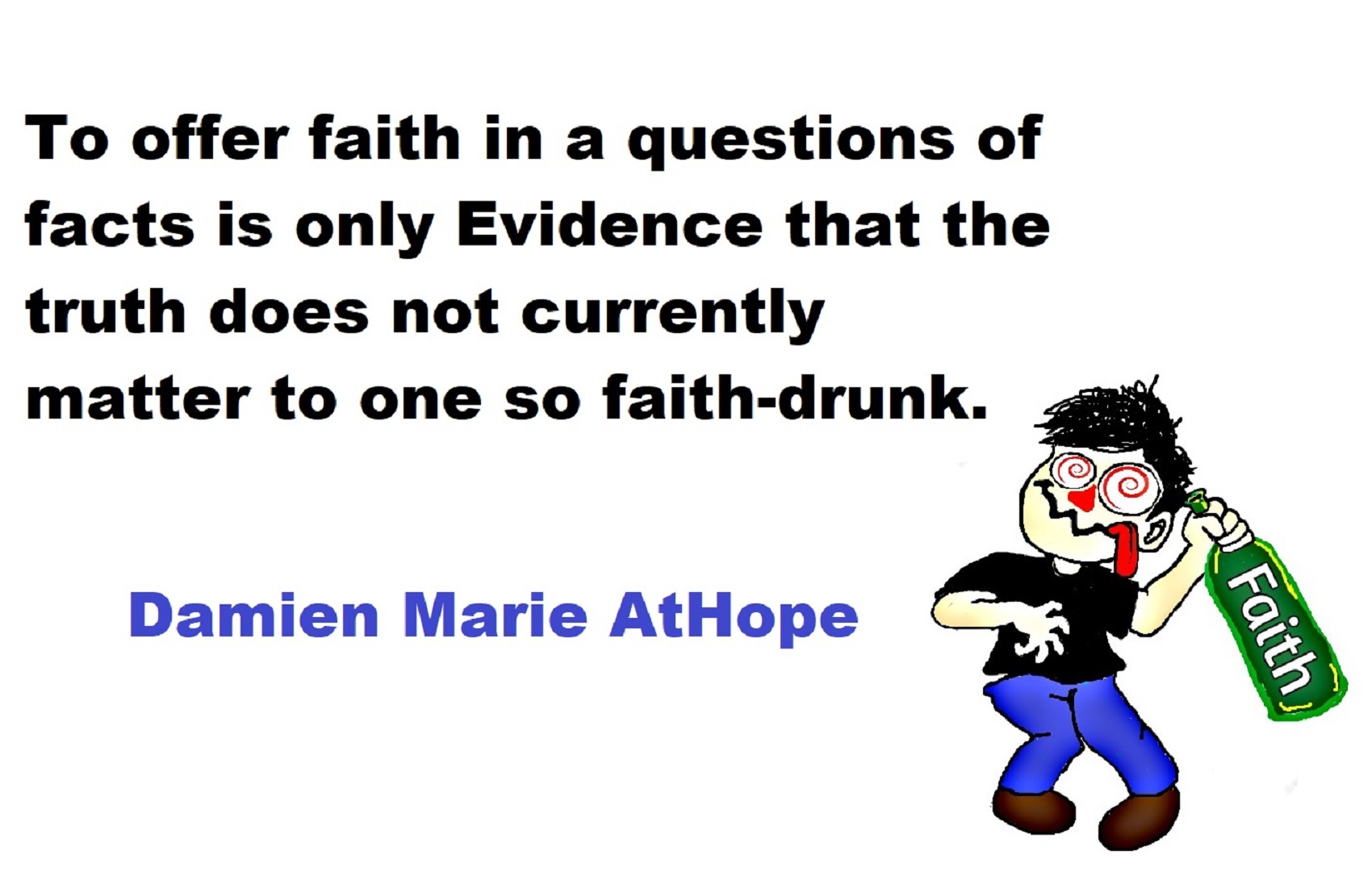
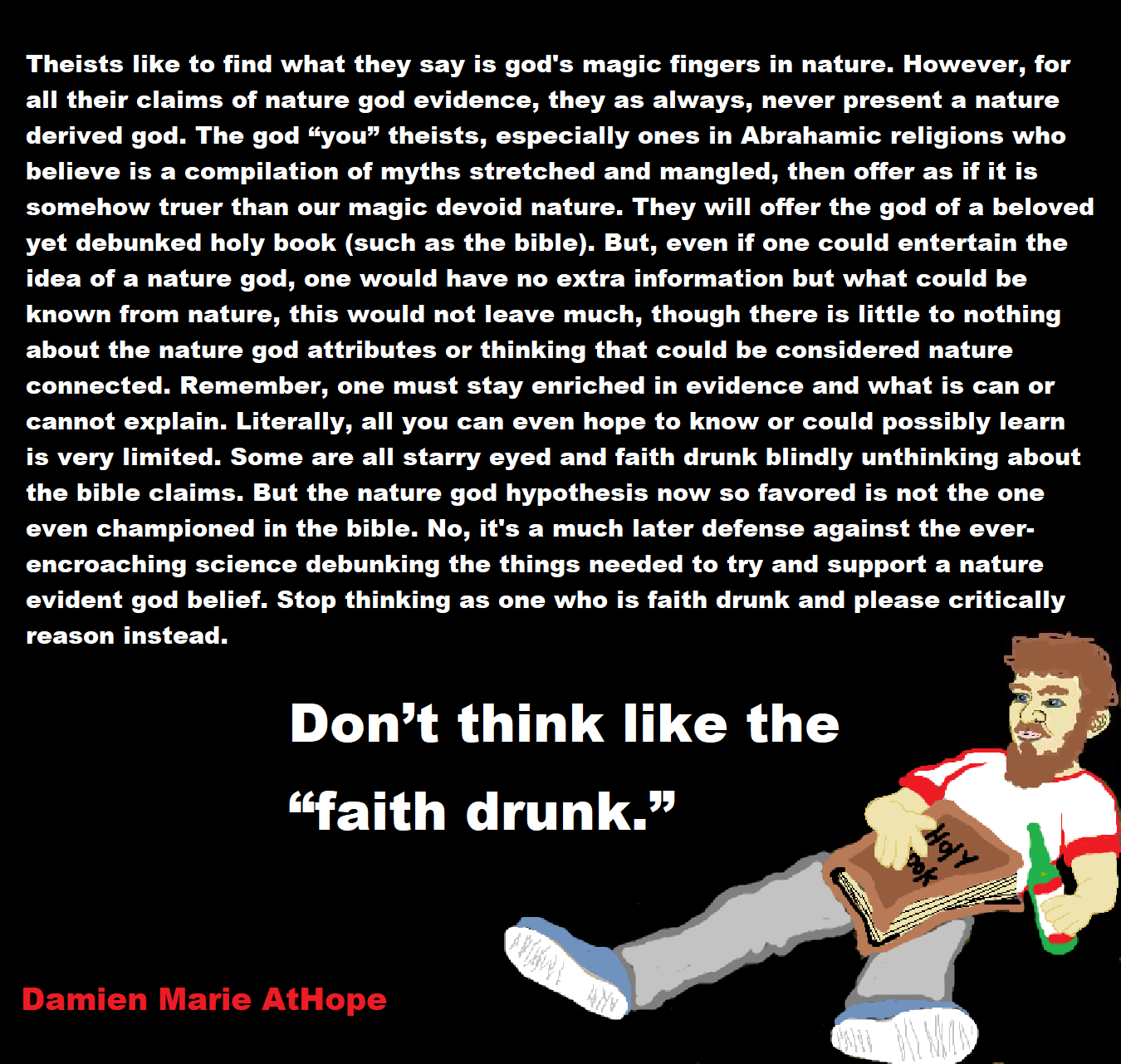
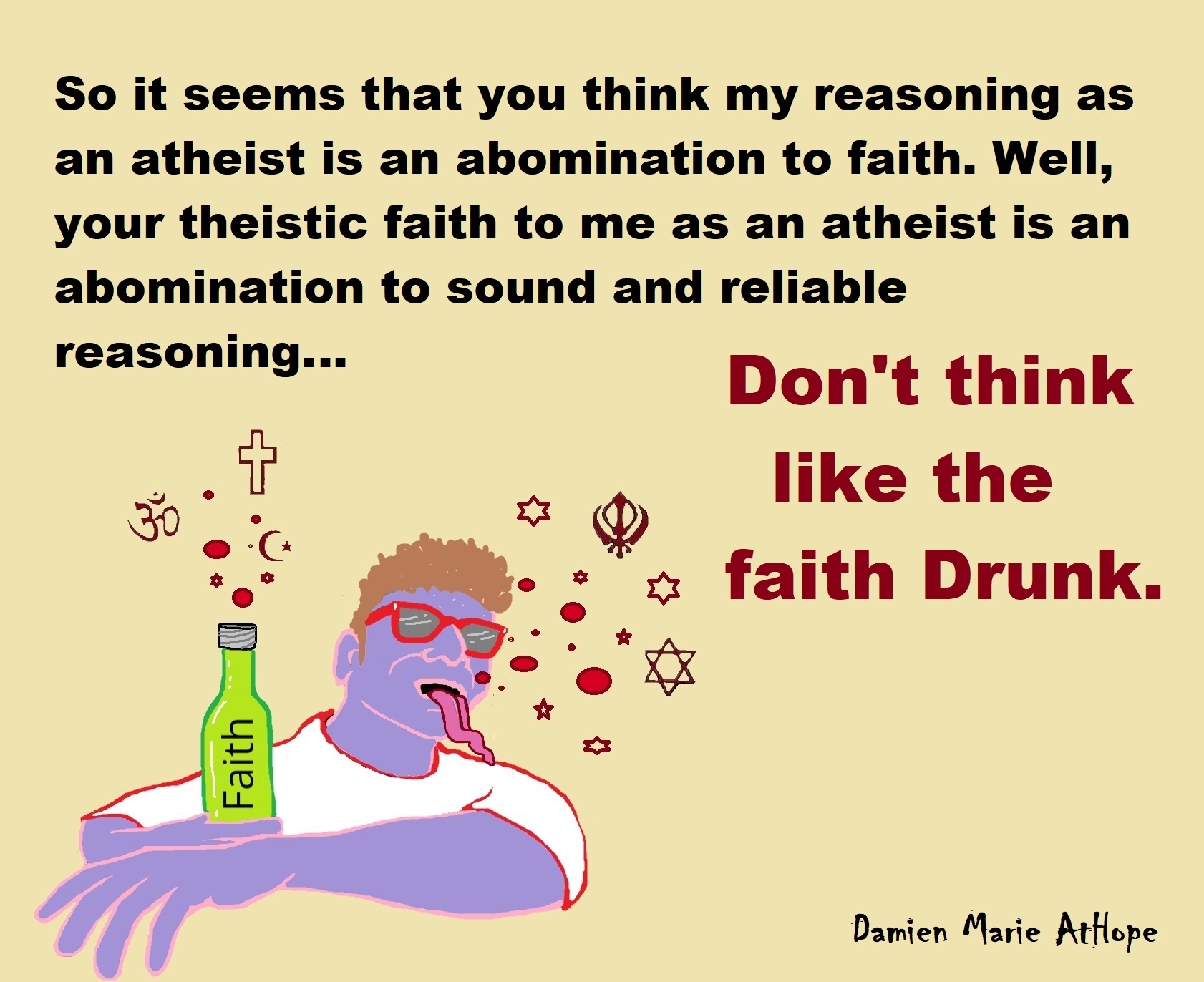
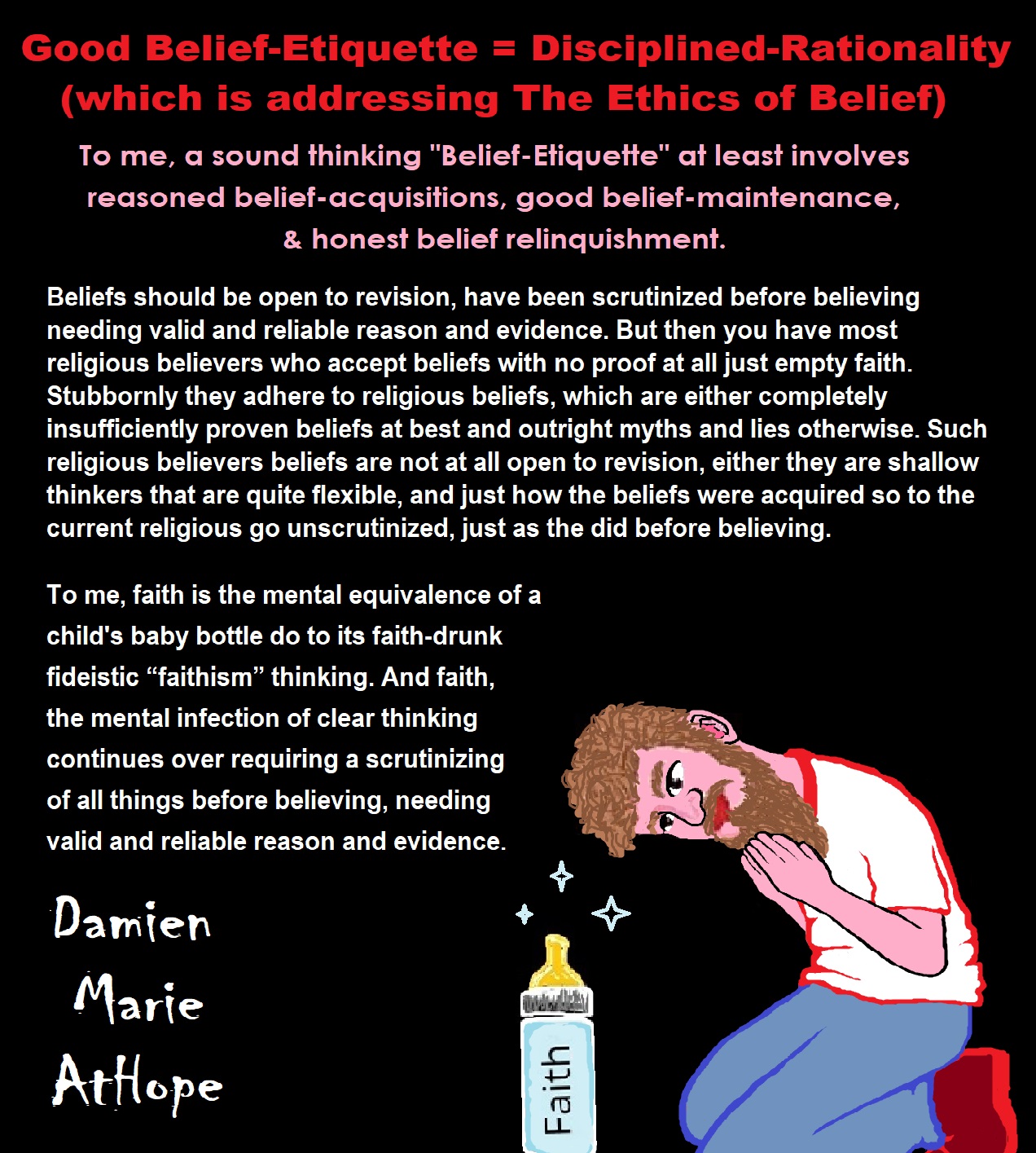
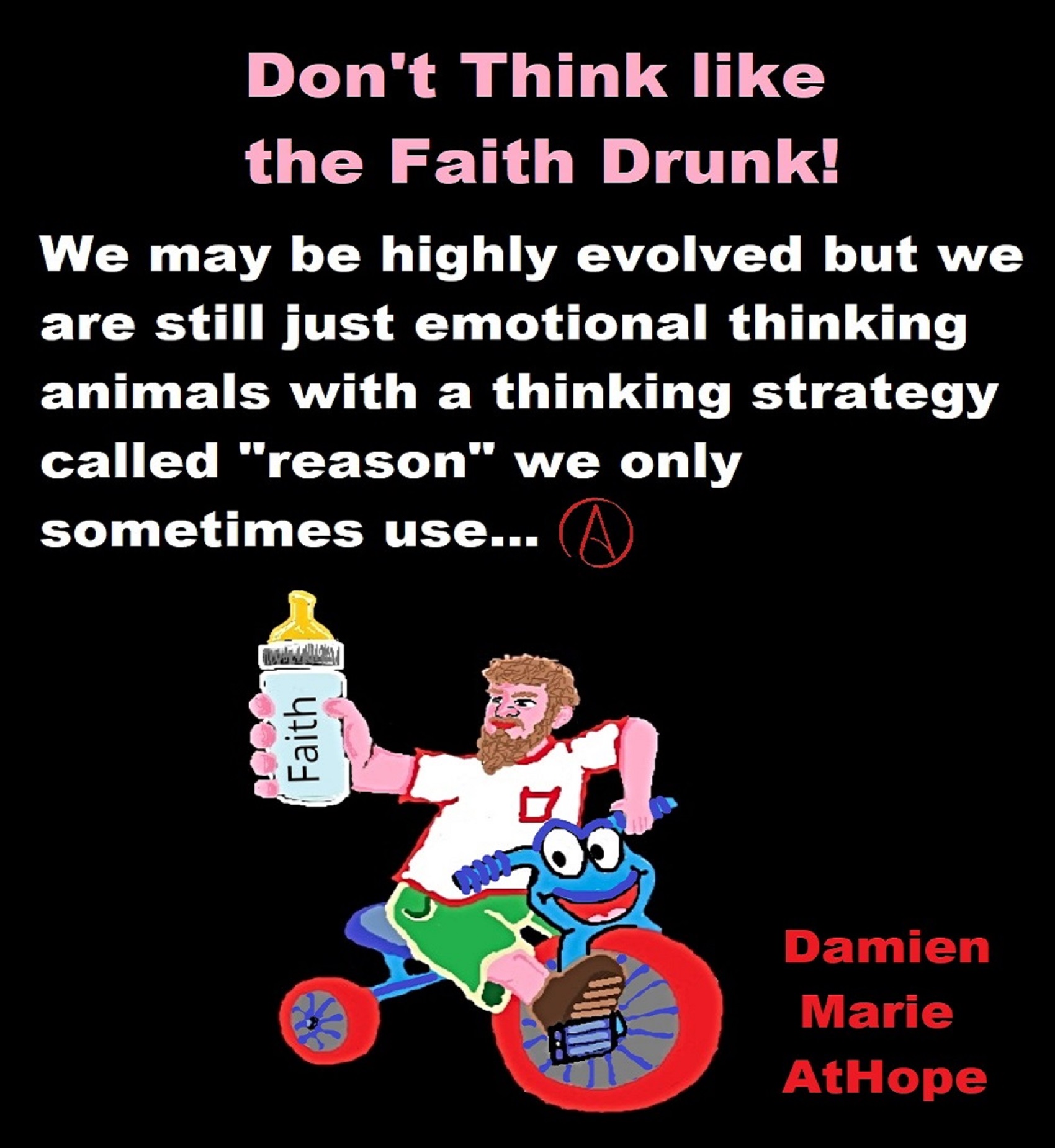
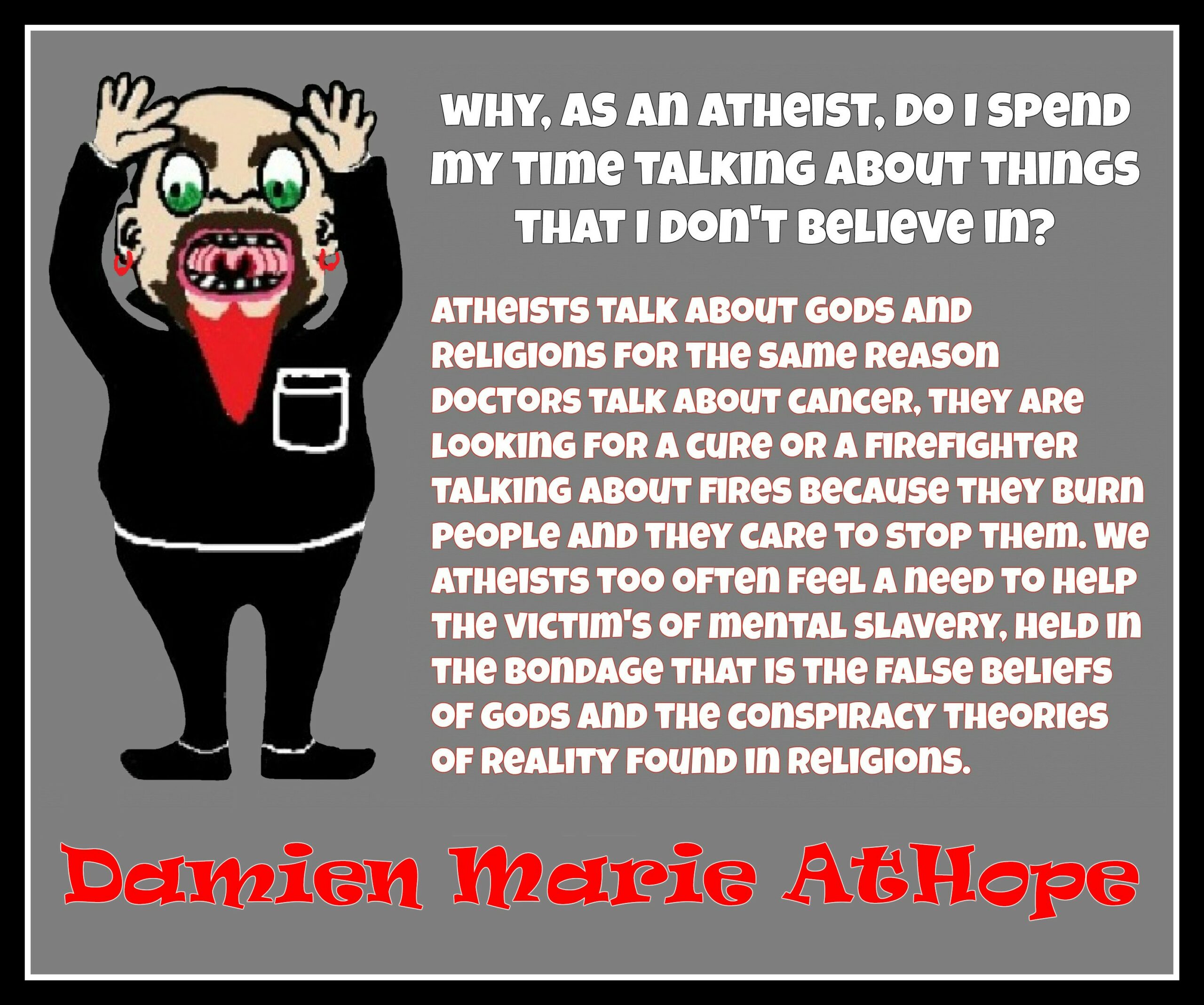
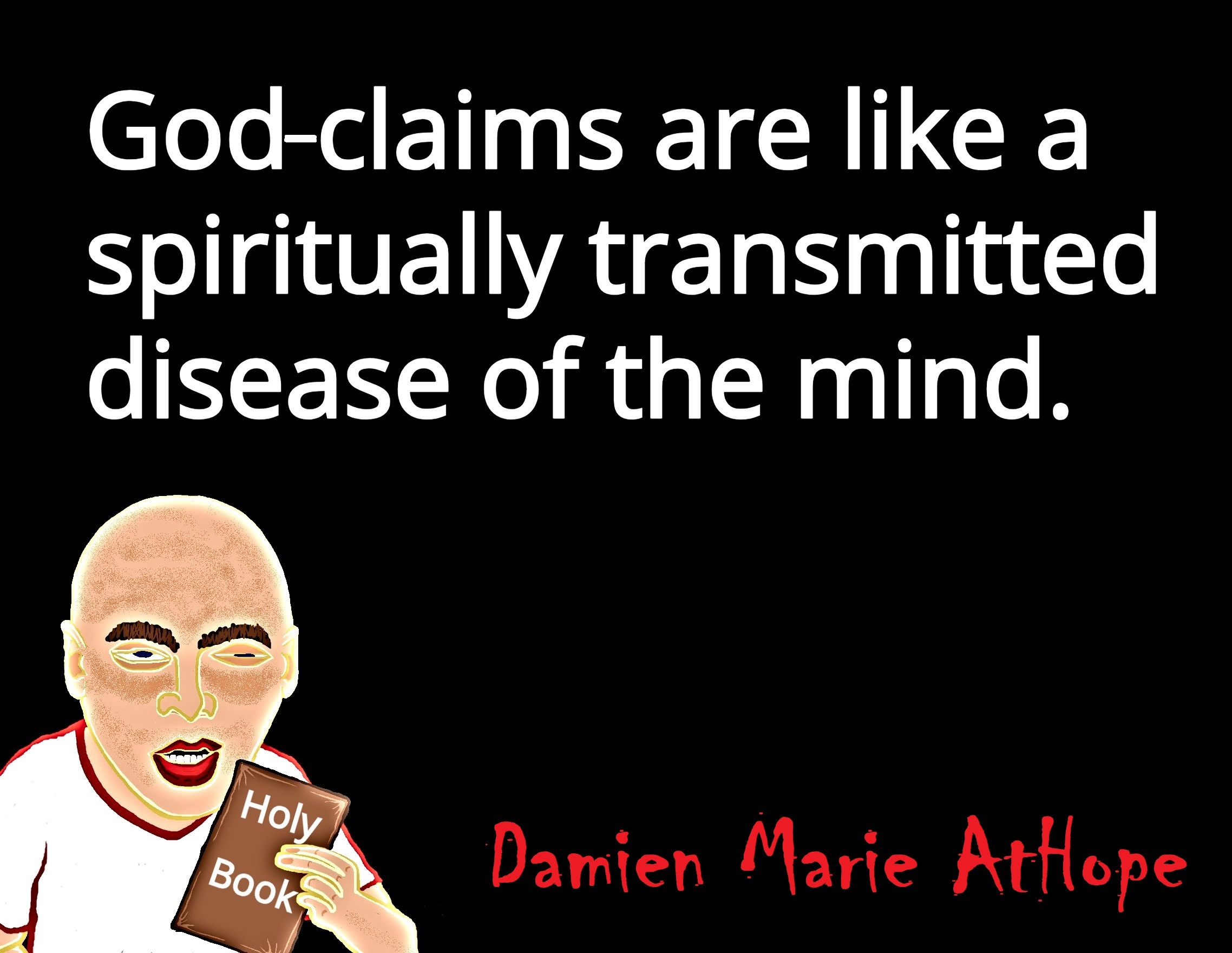
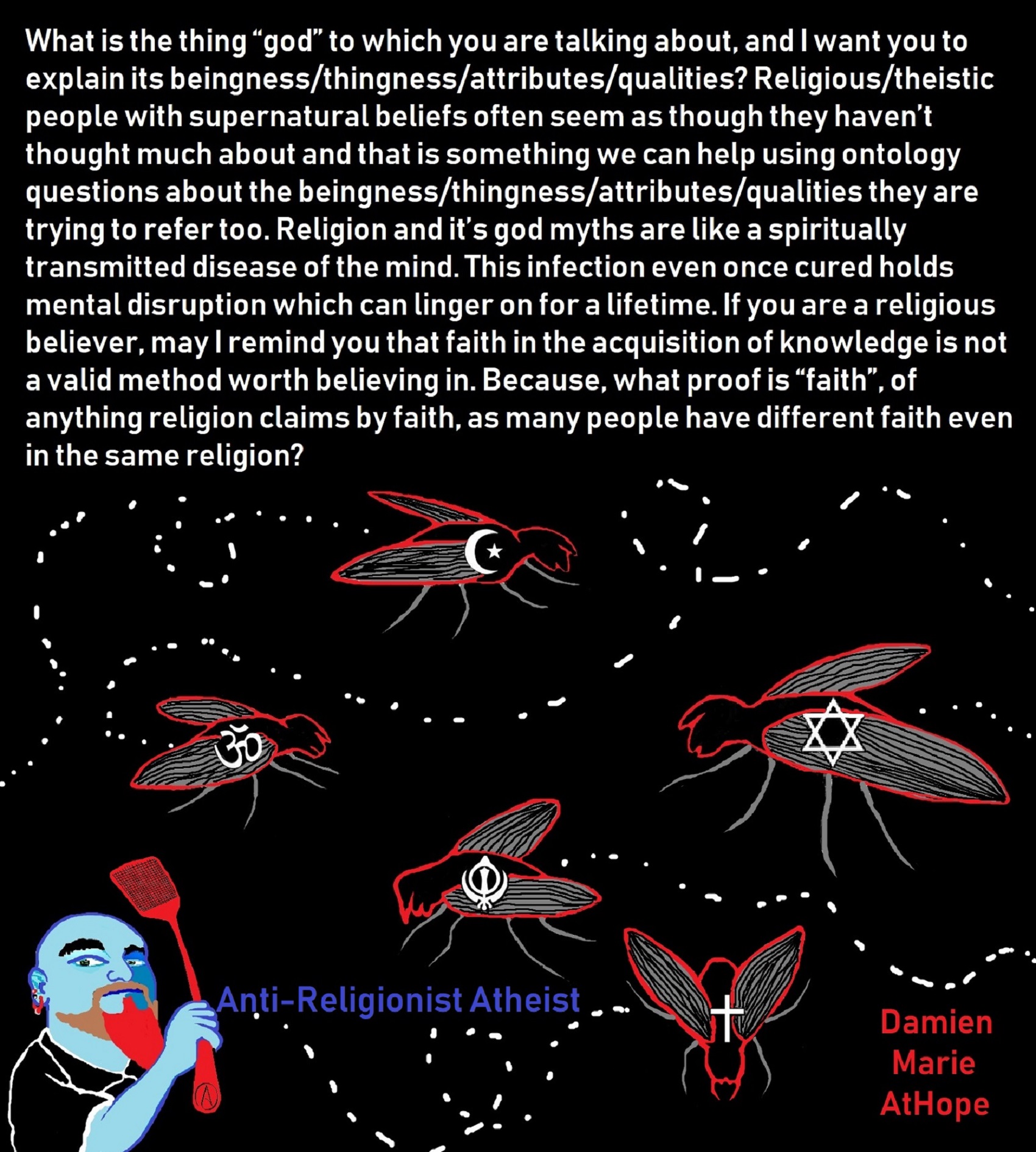
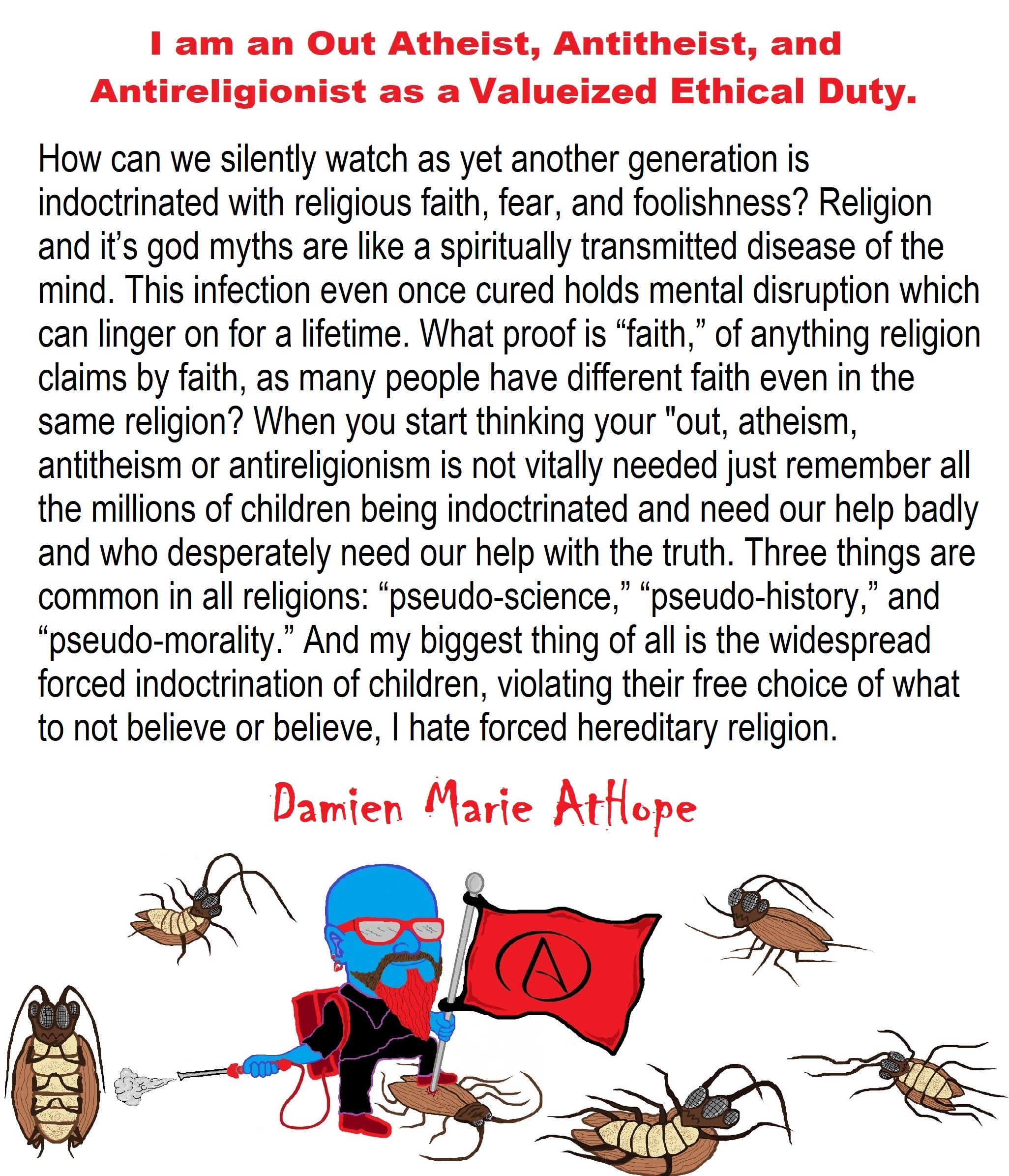


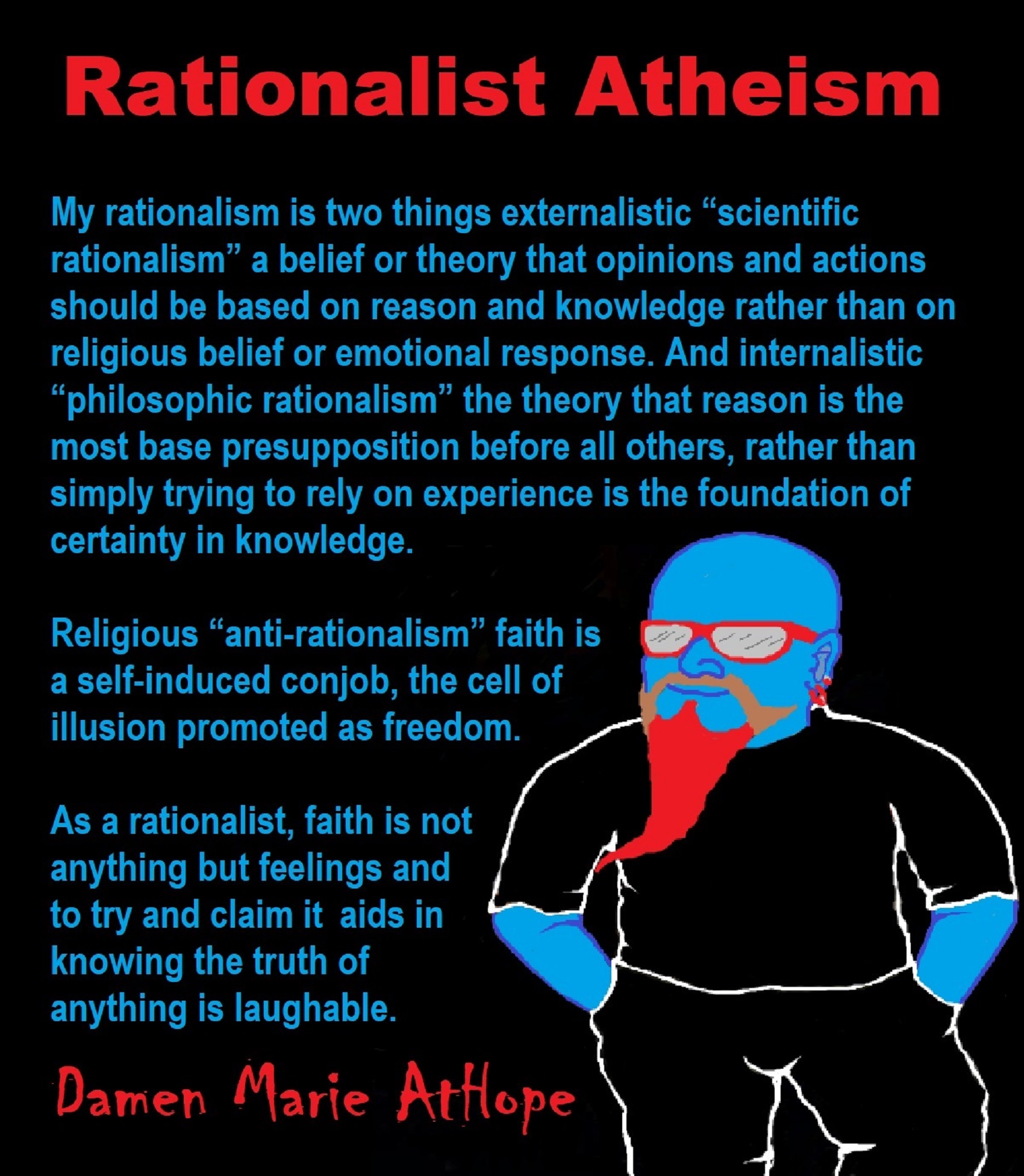
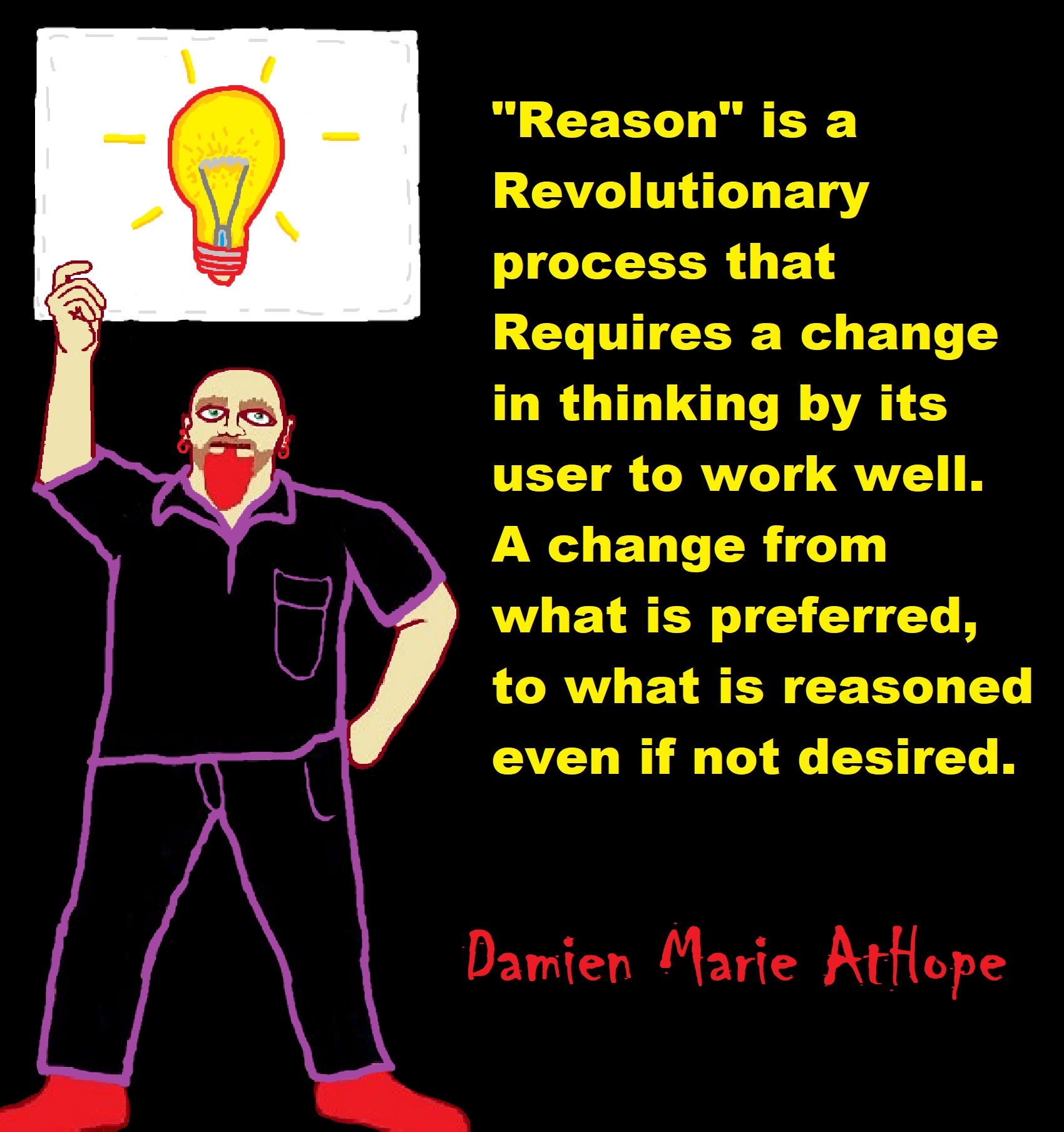
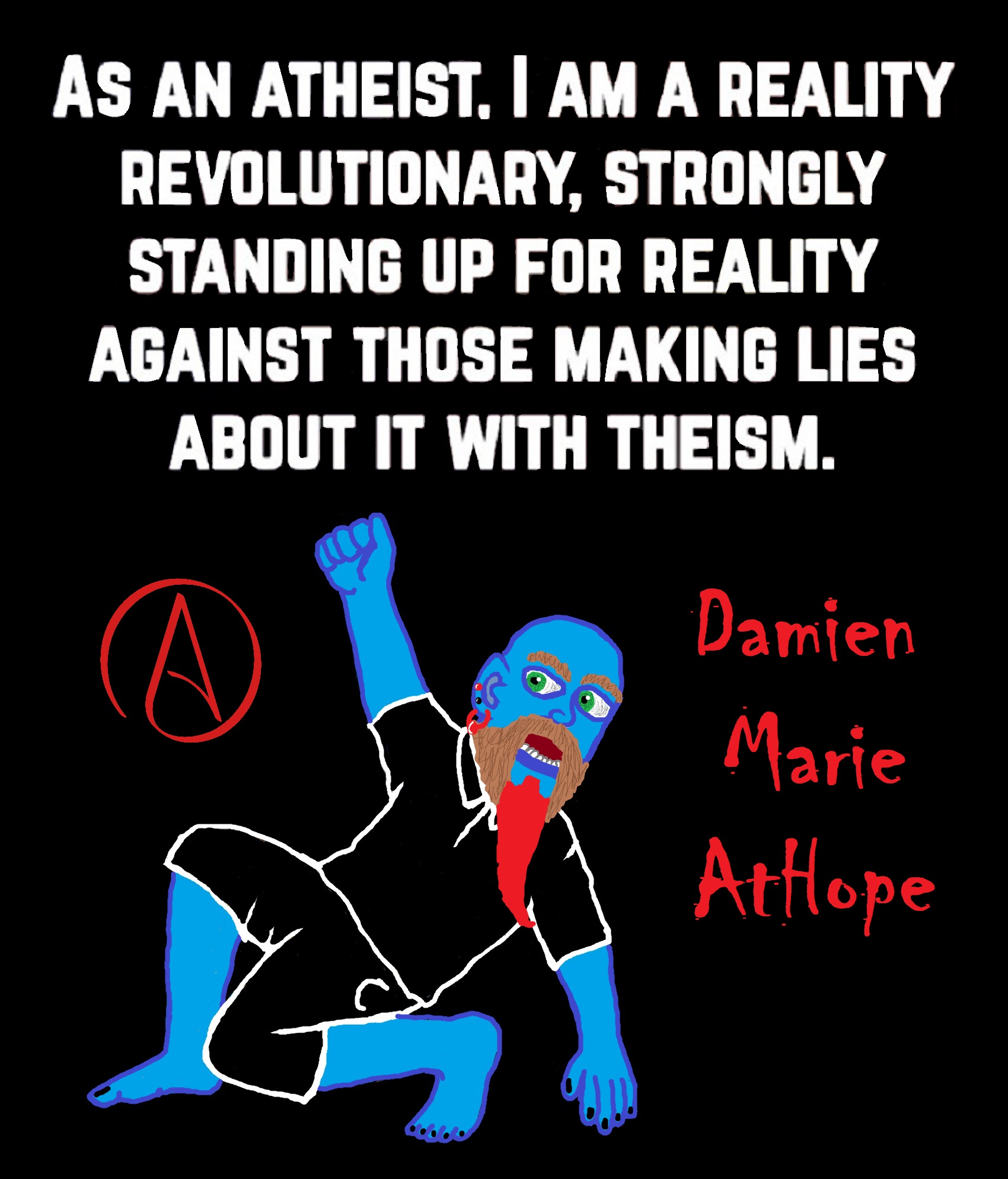
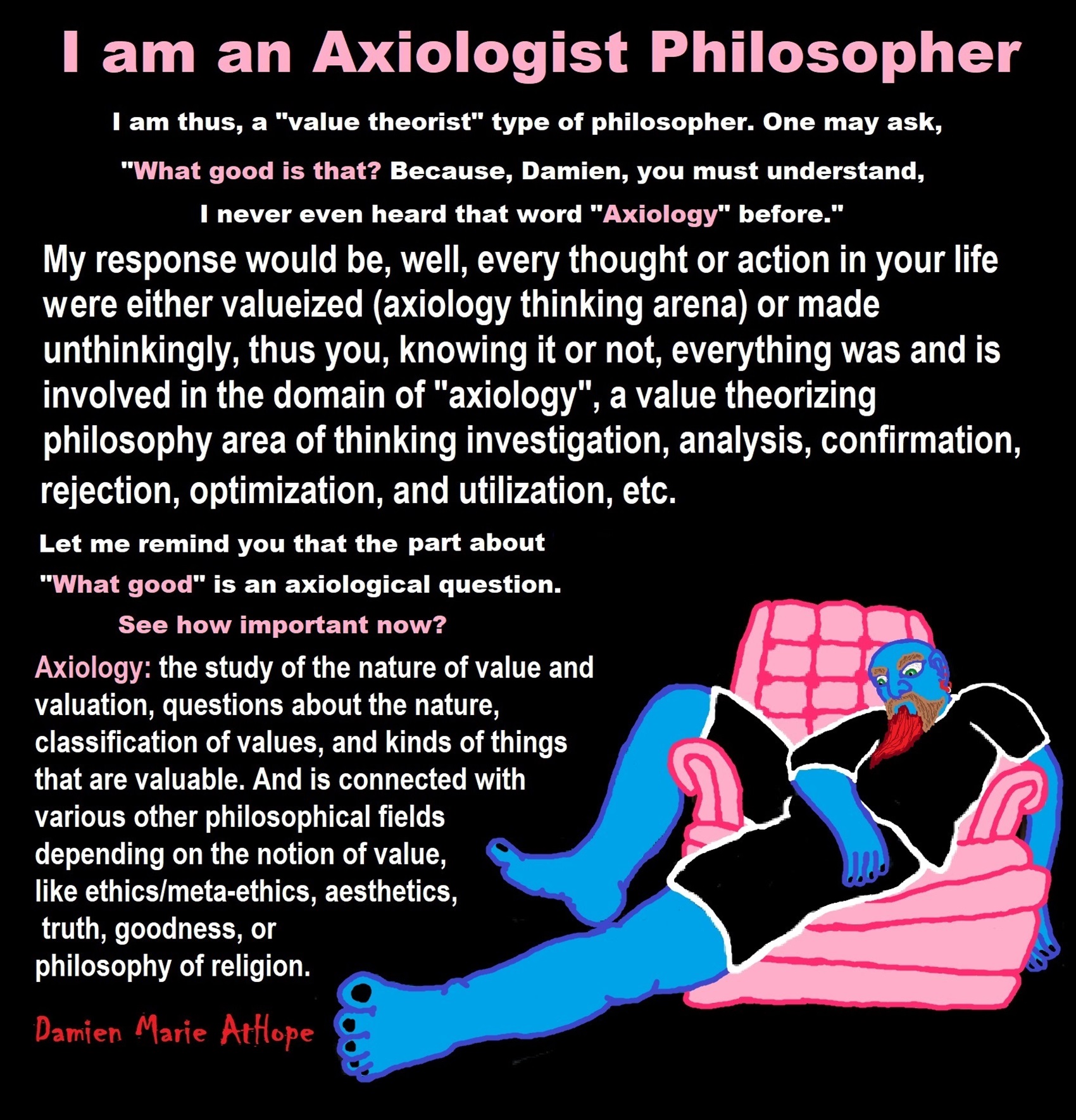
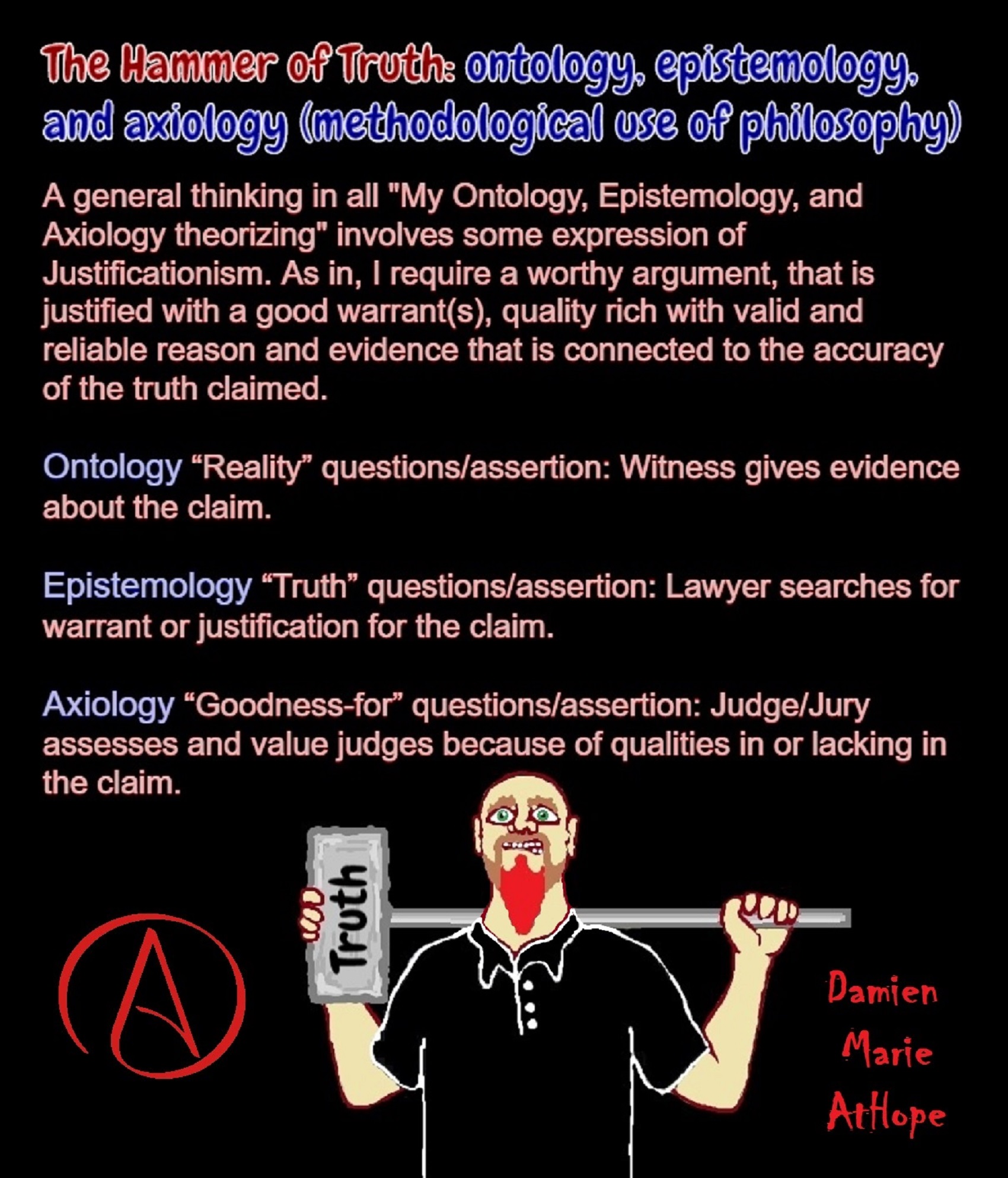
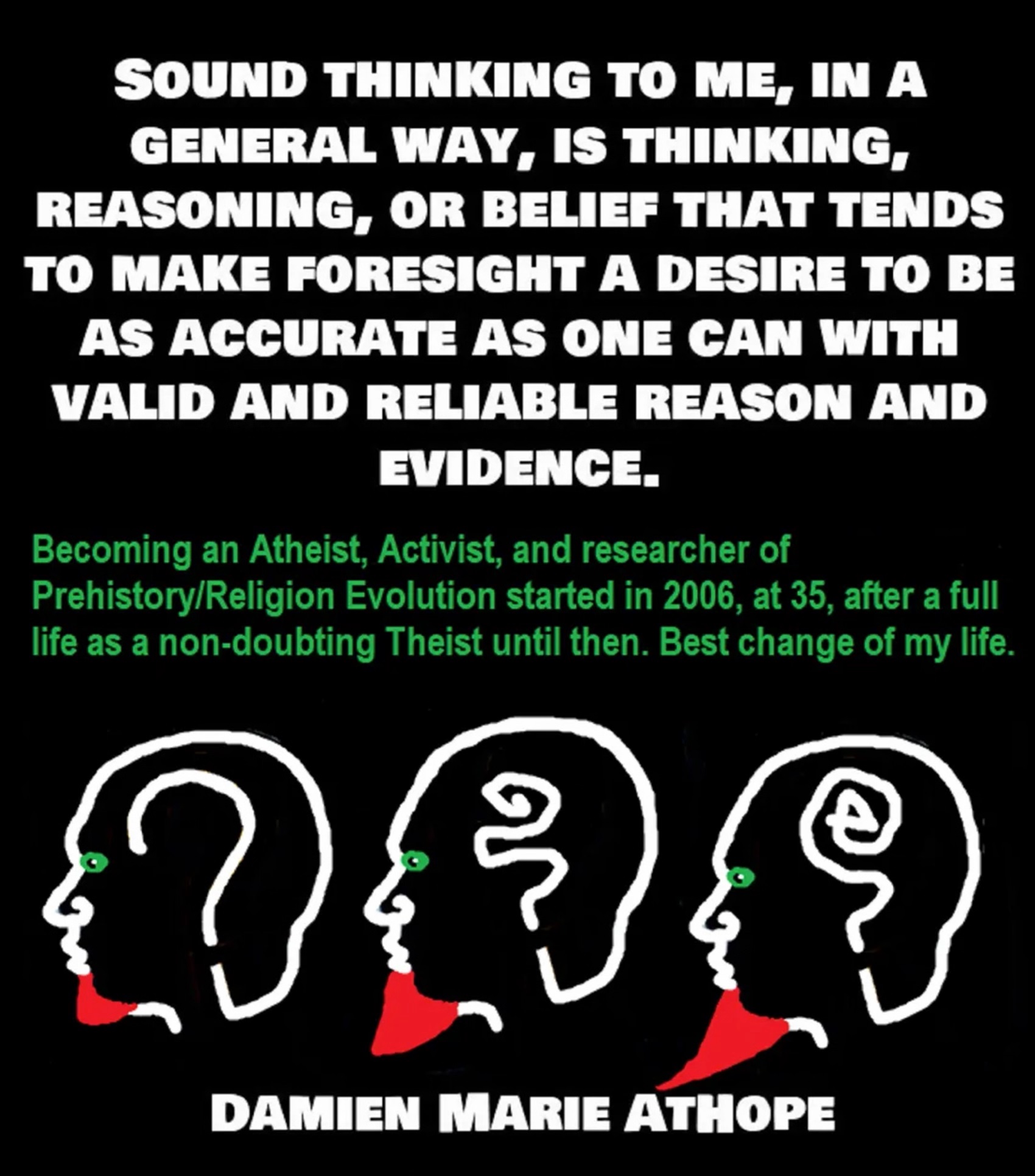

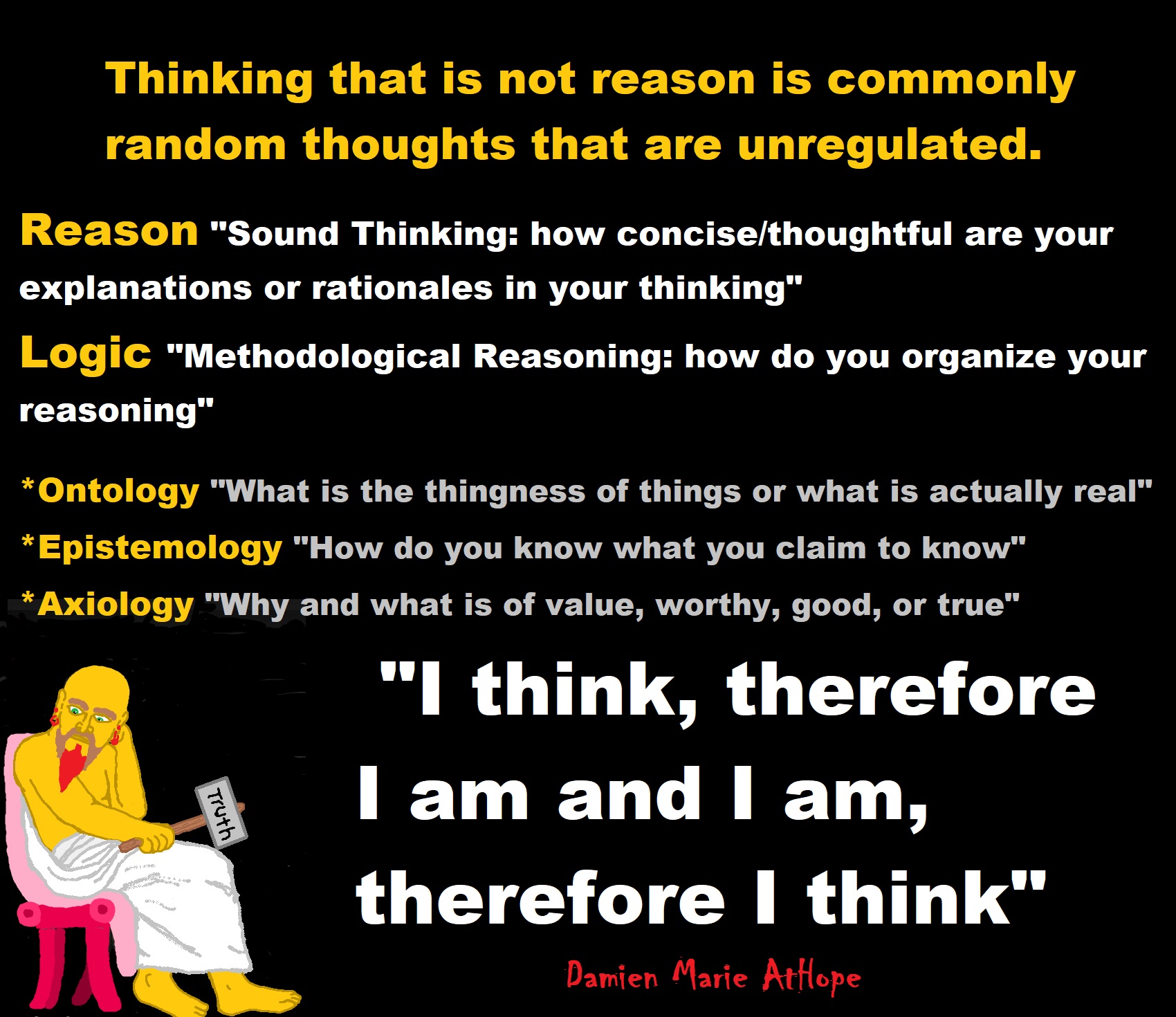
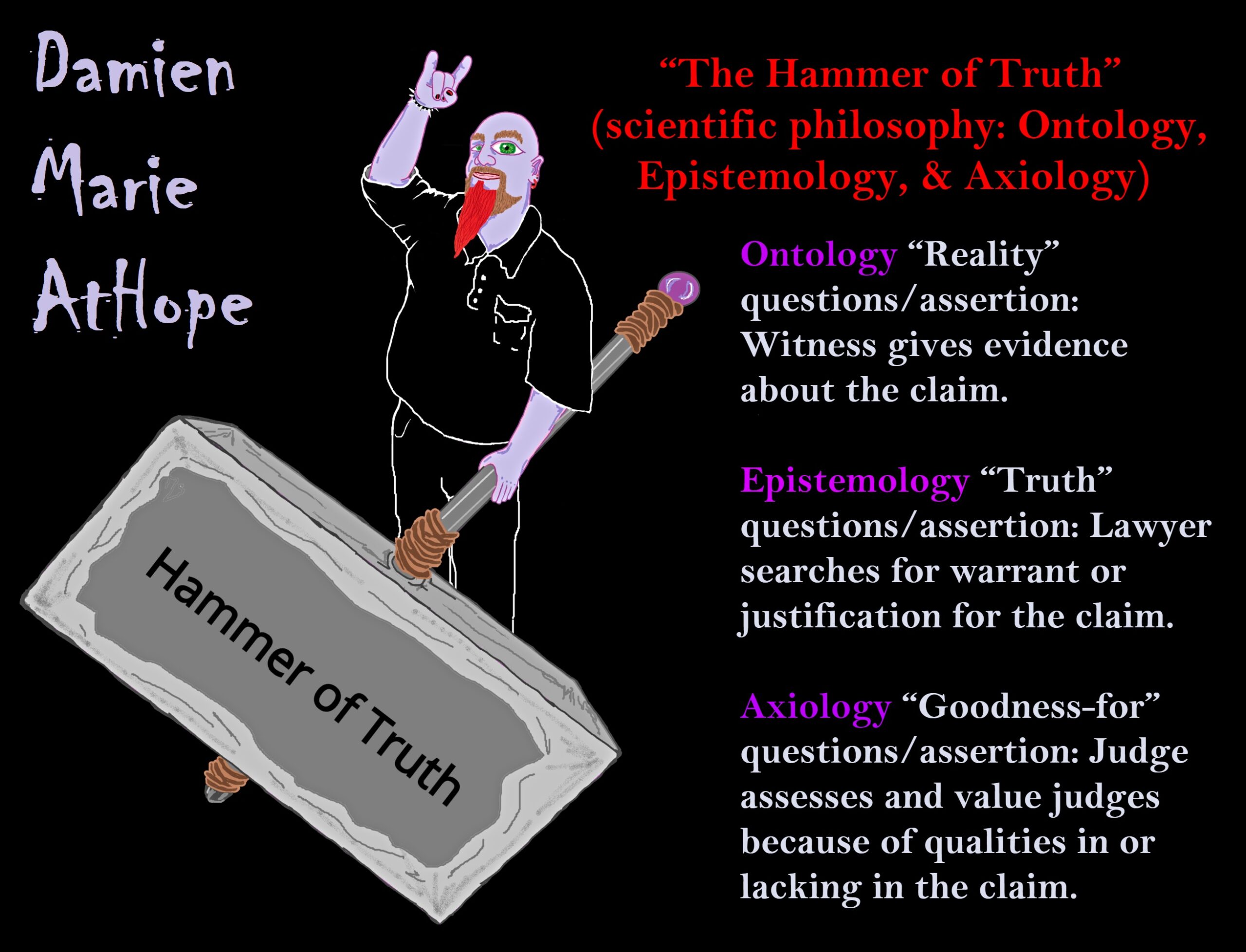
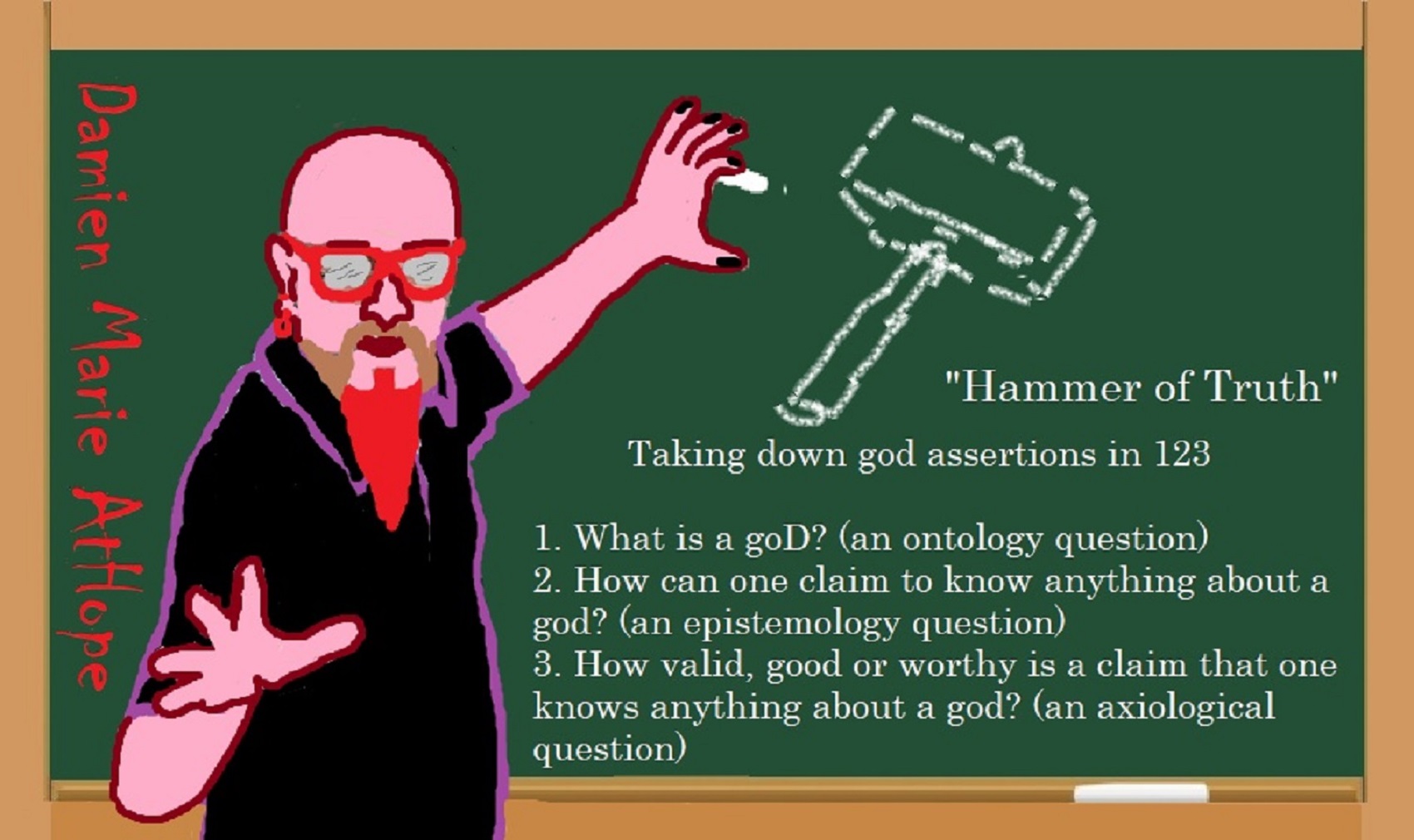
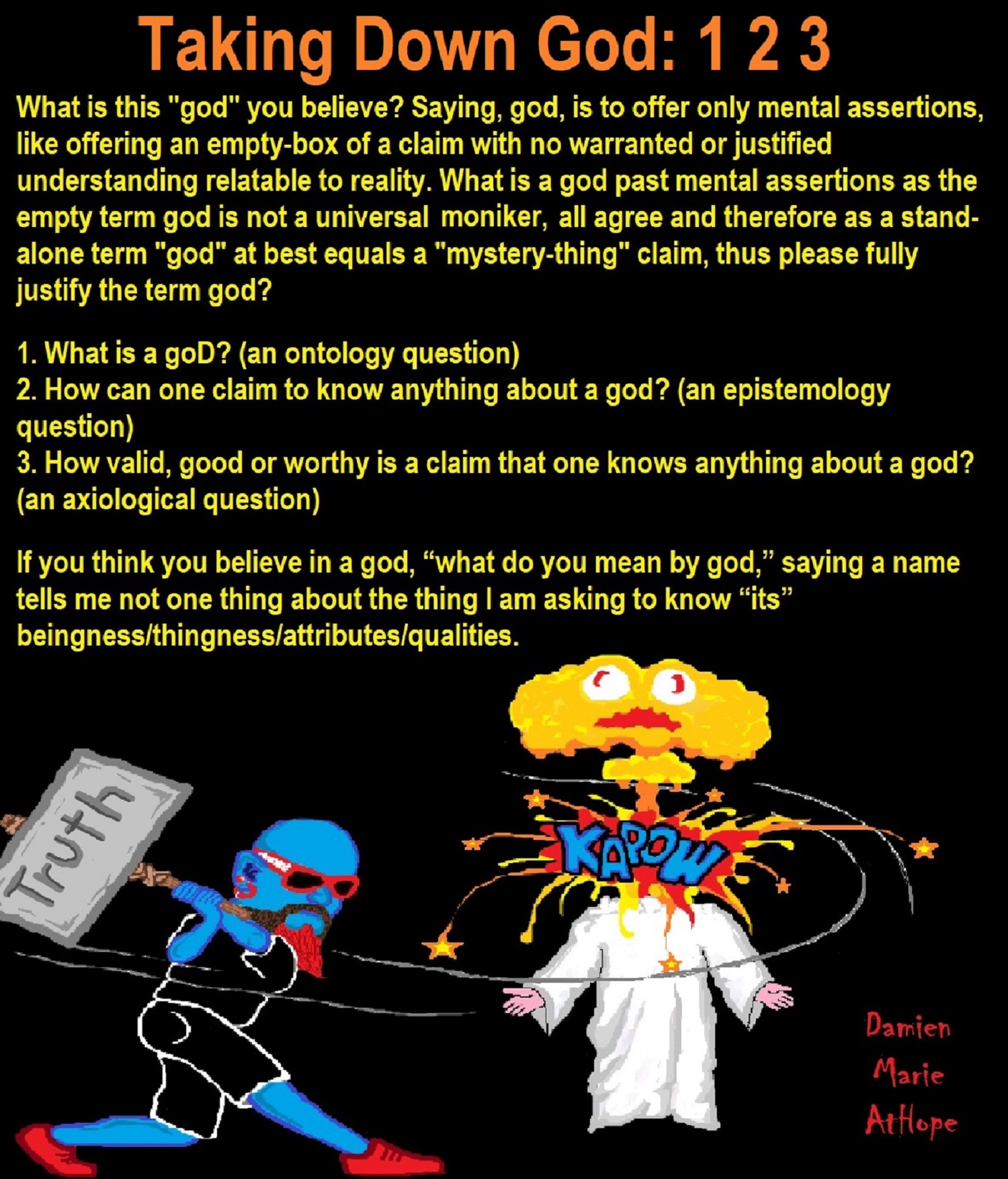
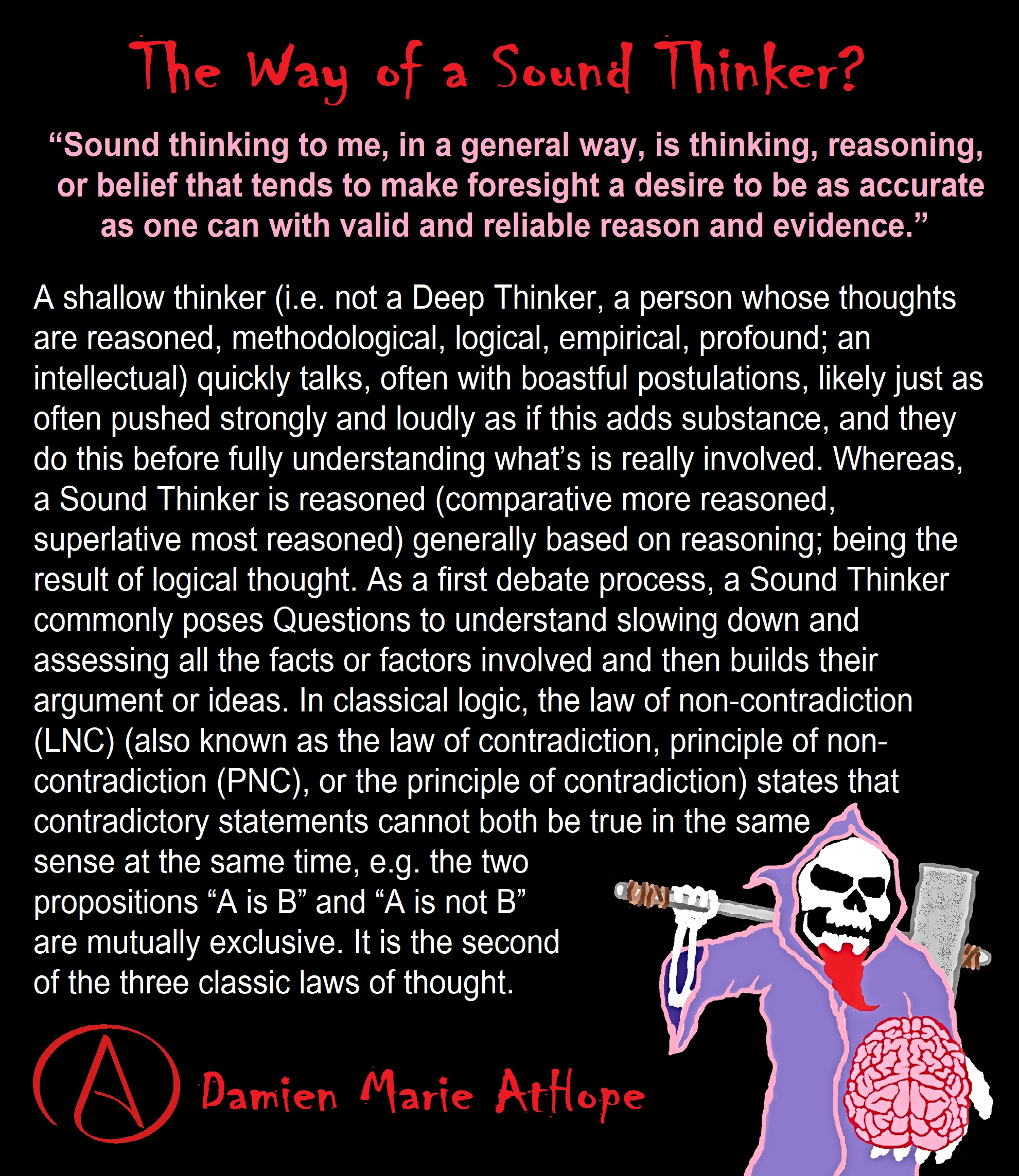
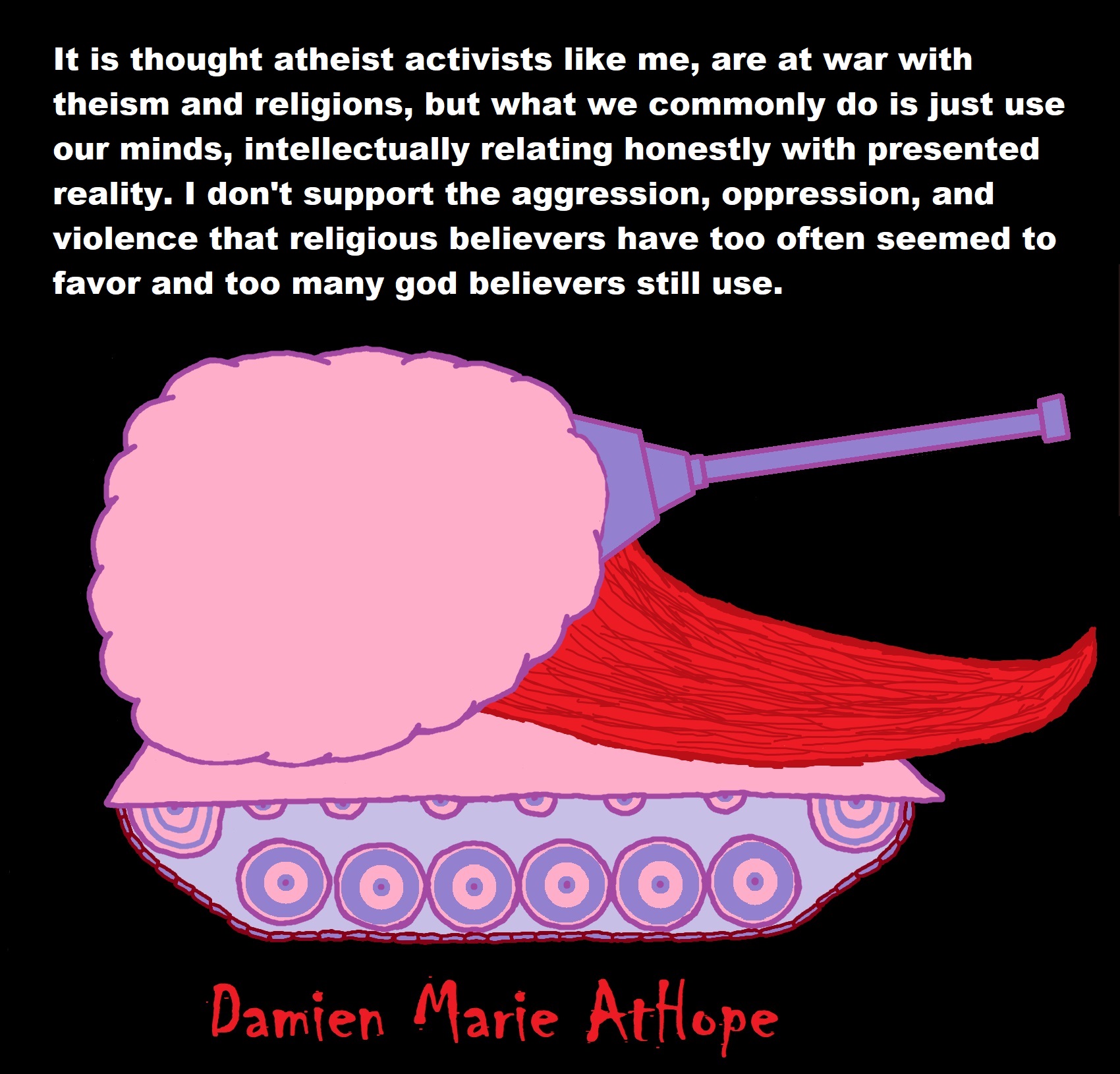
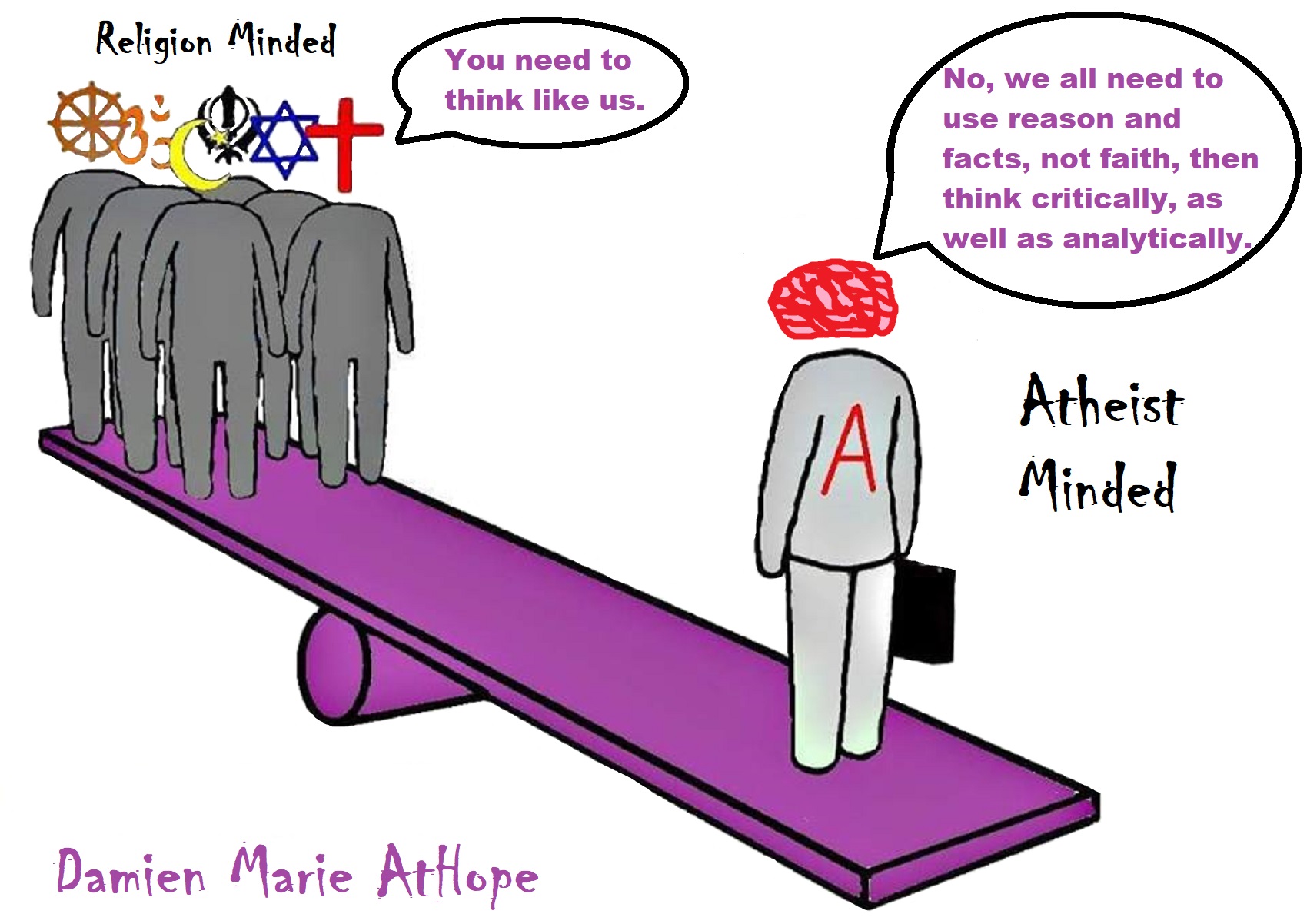
- I am an Axiologist (anti-nihilism / value theorist)
- I am a “Scientific Axiology” minded “Philosophic Axiologist Theorist” and my conclusion is Axiological atheism
- Chatting on Axiological atheism, My deconversion, and My atheism
- Axiological-Atheist Methodological-Rationalist vs. Platonic-Theistic-Stoic Rationalistic-Nihilist
- Sound thinking, Presumptive-value, Axiology, and Disciplined-Rationality
- Deconstructing Pseudo-Morality with Axiology Understanding?
- Hammer of Truth: Investigate (ONTOLOGY), Expose (EPISTEMOLOGY), and Judge (AXIOLOGY)
- I am a caring firebrand axiological atheist, wishing to be hard on ideas but kind to people.
- Caring Firebrand Axiological Atheist, Antitheist, and Antireligionist as a Valuized Ethical Duty.
- Axiological Atheism Starts in Apatheism?
- Pragmatic Ethical/Axiology Driven Assumptions, Overcome the Weight of Solipsism Doubt
- Truth is a Value (axiological) Judgment.
- On the Nature of Value (axiology)
- Axiological Atheism is Intellectualism
- My Methodological Rationalism: investigate (ontology), expose (epistemology) and judge (axiology)
- Methodological Rationalism (Ontology, Epistemology, & Axiology) and Skepticism
- Axiology, Morality and the Dignity Being: “Human Entity”
- If axiology is a value-based ethics system, how are the ethical values established?
- Axiological Ethics, not Pseudo Morality
- “Value Theory/Value Science” atheism: AXIOLOGICAL ATHEISM
- Axiology is both a philosophy and a science of value.
- Is bible god ethical? & Would It Be Bad or Good if God Exists? (axiological “value theory” questions)
- I am an Axiological Atheist, with a Rationalist Persuasion, who Supports Anarcho-Humanism
- Moral fear and Moral love (which together motivate my axiological ethics)?
- Axiological Dignity: “Value Consciousness vs Value-Blindness”
- Axiological/axiology (value theory/value science) Atheism?
- An axiological atheist and a cult educator address Trumpism/MAGA in association with cults
- Axiological Atheist Interviews
Interview of Formal Axiological Atheist Dr. William Kelleher, one of my best videos on morality from an axiological perspective.
Axiological Atheist: truth seeker for good (My unscripted opening in a debate with a Theist).

People don’t commonly teach religious history, even that of their own claimed religion. No, rather they teach a limited “pro their religion” history of their religion from a religious perspective favorable to the religion of choice.

Do you truly think “Religious Belief” is only a matter of some personal choice?
Do you not see how coercive one’s world of choice is limited to the obvious hereditary belief, in most religious choices available to the child of religious parents or caregivers? Religion is more commonly like a family, culture, society, etc. available belief that limits the belief choices of the child and that is when “Religious Belief” is not only a matter of some personal choice and when it becomes hereditary faith, not because of the quality of its alleged facts or proposed truths but because everyone else important to the child believes similarly so they do as well simply mimicking authority beliefs handed to them. Because children are raised in religion rather than being presented all possible choices but rather one limited dogmatic brand of “Religious Belief” where children only have a choice of following the belief as instructed, and then personally claim the faith hereditary belief seen in the confirming to the belief they have held themselves all their lives. This is obvious in statements asked and answered by children claiming a faith they barely understand but they do understand that their family believes “this or that” faith, so they feel obligated to believe it too. While I do agree that “Religious Belief” should only be a matter of some personal choice, it rarely is… End Hereditary Religion!

Animism: Respecting the Living World by Graham Harvey
“How have human cultures engaged with and thought about animals, plants, rocks, clouds, and other elements in their natural surroundings? Do animals and other natural objects have a spirit or soul? What is their relationship to humans? In this new study, Graham Harvey explores current and past animistic beliefs and practices of Native Americans, Maori, Aboriginal Australians, and eco-pagans. He considers the varieties of animism found in these cultures as well as their shared desire to live respectfully within larger natural communities. Drawing on his extensive casework, Harvey also considers the linguistic, performative, ecological, and activist implications of these different animisms.” ref

We are like believing machines we vacuum up ideas, like Velcro sticks to almost everything. We accumulate beliefs that we allow to negatively influence our lives, often without realizing it. Our willingness must be to alter skewed beliefs that impend our balance or reason, which allows us to achieve new positive thinking and accurate outcomes.

My thoughts on Religion Evolution with external links for more info:
- (Pre-Animism Africa mainly, but also Europe, and Asia at least 300,000 years ago), (Pre-Animism – Oxford Dictionaries)
- (Animism Africa around 100,000 years ago), (Animism – Britannica.com)
- (Totemism Europe around 50,000 years ago), (Totemism – Anthropology)
- (Shamanism Siberia around 30,000 years ago), (Shamanism – Britannica.com)
- (Paganism Turkey around 12,000 years ago), (Paganism – BBC Religion)
- (Progressed Organized Religion “Institutional Religion” Egypt around 5,000 years ago), (Ancient Egyptian Religion – Britannica.com)
- (CURRENT “World” RELIGIONS after 4,000 years ago) (Origin of Major Religions – Sacred Texts)
- (Early Atheistic Doubting at least by 2,600 years ago) (History of Atheism – Wikipedia)
“Religion is an Evolved Product” and Yes, Religion is Like Fear Given Wings…
Atheists talk about gods and religions for the same reason doctors talk about cancer, they are looking for a cure, or a firefighter talks about fires because they burn people and they care to stop them. We atheists too often feel a need to help the victims of mental slavery, held in the bondage that is the false beliefs of gods and the conspiracy theories of reality found in religions.
Understanding Religion Evolution:
- Pre-Animism (at least 300,000 years ago)
- Animism (Africa: 100,000 years ago)
- Totemism (Europe: 50,000 years ago)
- Shamanism (Siberia: 30,000 years ago)
- Paganism (Turkey: 12,000 years ago)
- Progressed organized religion (Egypt: 5,000 years ago), (Egypt, the First Dynasty 5,150 years ago)
- CURRENT “World” RELIGIONS (after 4,000 years ago)
- Early Atheistic Doubting (at least by 2,600 years ago)
“An Archaeological/Anthropological Understanding of Religion Evolution”
It seems ancient peoples had to survived amazing threats in a “dangerous universe (by superstition perceived as good and evil),” and human “immorality or imperfection of the soul” which was thought to affect the still living, leading to ancestor worship. This ancestor worship presumably led to the belief in supernatural beings, and then some of these were turned into the belief in gods. This feeble myth called gods were just a human conceived “made from nothing into something over and over, changing, again and again, taking on more as they evolve, all the while they are thought to be special,” but it is just supernatural animistic spirit-belief perceived as sacred.
Quick Evolution of Religion?
Pre-Animism (at least 300,000 years ago) pre-religion is a beginning that evolves into later Animism. So, Religion as we think of it, to me, all starts in a general way with Animism (Africa: 100,000 years ago) (theoretical belief in supernatural powers/spirits), then this is physically expressed in or with Totemism (Europe: 50,000 years ago) (theoretical belief in mythical relationship with powers/spirits through a totem item), which then enlists a full-time specific person to do this worship and believed interacting Shamanism (Siberia/Russia: 30,000 years ago) (theoretical belief in access and influence with spirits through ritual), and then there is the further employment of myths and gods added to all the above giving you Paganism (Turkey: 12,000 years ago) (often a lot more nature-based than most current top world religions, thus hinting to their close link to more ancient religious thinking it stems from). My hypothesis is expressed with an explanation of the building of a theatrical house (modern religions development). Progressed organized religion (Egypt: 5,000 years ago) with CURRENT “World” RELIGIONS (after 4,000 years ago).
Historically, in large city-state societies (such as Egypt or Iraq) starting around 5,000 years ago culminated to make religion something kind of new, a sociocultural-governmental-religious monarchy, where all or at least many of the people of such large city-state societies seem familiar with and committed to the existence of “religion” as the integrated life identity package of control dynamics with a fixed closed magical doctrine, but this juggernaut integrated religion identity package of Dogmatic-Propaganda certainly did not exist or if developed to an extent it was highly limited in most smaller prehistoric societies as they seem to lack most of the strong control dynamics with a fixed closed magical doctrine (magical beliefs could be at times be added or removed). Many people just want to see developed religious dynamics everywhere even if it is not. Instead, all that is found is largely fragments until the domestication of religion.
Religions, as we think of them today, are a new fad, even if they go back to around 6,000 years in the timeline of human existence, this amounts to almost nothing when seen in the long slow evolution of religion at least around 70,000 years ago with one of the oldest ritual worship. Stone Snake of South Africa: “first human worship” 70,000 years ago. This message of how religion and gods among them are clearly a man-made thing that was developed slowly as it was invented and then implemented peace by peace discrediting them all. Which seems to be a simple point some are just not grasping how devastating to any claims of truth when we can see the lie clearly in the archeological sites.
I wish people fought as hard for the actual values as they fight for the group/clan names political or otherwise they think support values. Every amount spent on war is theft to children in need of food or the homeless kept from shelter.
Here are several of my blog posts on history:
- To Find Truth You Must First Look
- (Magdalenian/Iberomaurusian) Connections to the First Paganists of the early Neolithic Near East Dating from around 17,000 to 12,000 Years Ago
- Natufians: an Ancient People at the Origins of Agriculture and Sedentary Life
- Possible Clan Leader/Special “MALE” Ancestor Totem Poles At Least 13,500 years ago?
- Jewish People with DNA at least 13,200 years old, Judaism, and the Origins of Some of its Ideas
- Baltic Reindeer Hunters: Swiderian, Lyngby, Ahrensburgian, and Krasnosillya cultures 12,020 to 11,020 years ago are evidence of powerful migratory waves during the last 13,000 years and a genetic link to Saami and the Finno-Ugric peoples.
- The Rise of Inequality: patriarchy and state hierarchy inequality
- Fertile Crescent 12,500 – 9,500 Years Ago: fertility and death cult belief system?
- 12,400 – 11,700 Years Ago – Kortik Tepe (Turkey) Pre/early-Agriculture Cultic Ritualism
- Ritualistic Bird Symbolism at Gobekli Tepe and its “Ancestor Cult”
- Male-Homosexual (female-like) / Trans-woman (female) Seated Figurine from Gobekli Tepe
- Could a 12,000-year-old Bull Geoglyph at Göbekli Tepe relate to older Bull and Female Art 25,000 years ago and Later Goddess and the Bull cults like Catal Huyuk?
- Sedentism and the Creation of goddesses around 12,000 years ago as well as male gods after 7,000 years ago.
- Alcohol, where Agriculture and Religion Become one? Such as Gobekli Tepe’s Ritualistic use of Grain as Food and Ritual Drink
- Neolithic Ritual Sites with T-Pillars and other Cultic Pillars
- Paganism: Goddesses around 12,000 years ago then Male Gods after 7,000 years ago
- First Patriarchy: Split of Women’s Status around 12,000 years ago & First Hierarchy: fall of Women’s Status around 5,000 years ago.
- Natufians: an Ancient People at the Origins of Agriculture and Sedentary Life
- J DNA and the Spread of Agricultural Religion (paganism)
- Paganism: an approximately 12,000-year-old belief system
- Paganism 12,000 years old: related to “Anarchism and Socialism” (Pre-Capitalism)
- Shaman burial in Israel 12,000 years ago and the Shamanism Phenomena
- Need to Mythicized: gods and goddesses
- 12,000 – 7,000 Years Ago – Paleo-Indian Culture (The Americas)
- 12,000 – 2,000 Years Ago – Indigenous-Scandinavians (Nordic)
- Norse did not wear helmets with horns?
- Pre-Pottery Neolithic Skull Cult around 11,500 to 8,400 Years Ago?
- 10,400 – 10,100 Years Ago, in Turkey the Nevail Cori Religious Settlement
- 9,000-6,500 Years Old Submerged Pre-Pottery/Pottery Neolithic Ritual Settlements off Israel’s Coast
- Catal Huyuk “first religious designed city” around 9,500 to 7,700 years ago (Turkey)
- Cultic Hunting at Catal Huyuk “first religious designed city”
- Special Items and Art as well as Special Elite Burials at Catal Huyuk
- New Rituals and Violence with the appearance of Pottery and People?
- Haplogroup N and its related Uralic Languages and Cultures
- Ainu people, Sámi people, Native Americans, the Ancient North Eurasians, and Paganistic-Shamanism with Totemism
- Ideas, Technology and People from Turkey, Europe, to China and Back again 9,000 to 5,000 years ago?
- First Pottery of Europe and the Related Cultures
- 9,000 years old Neolithic Artifacts Judean Desert and Hills Israel
- 9,000-7,000 years-old Sex and Death Rituals: Cult Sites in Israel, Jordan, and the Sinai
- 9,000-8500 year old Horned Female shaman Bad Dürrenberg Germany
- Neolithic Jewelry and the Spread of Farming in Europe Emerging out of West Turkey
- 8,600-year-old Tortoise Shells in Neolithic graves in central China have Early Writing and Shamanism
- Swing of the Mace: the rise of Elite, Forced Authority, and Inequality begin to Emerge 8,500 years ago?
- Migrations and Changing Europeans Beginning around 8,000 Years Ago
- My “Steppe-Anatolian-Kurgan hypothesis” 8,000/7,000 years ago
- Around 8,000-year-old Shared Idea of the Mistress of Animals, “Ritual” Motif
- Pre-Columbian Red-Paint (red ochre) Maritime Archaic Culture 8,000-3,000 years ago
- 7,522-6,522 years ago Linear Pottery culture which I think relates to Arcane Capitalism’s origins
- Arcane Capitalism: Primitive socialism, Primitive capital, Private ownership, Means of production, Market capitalism, Class discrimination, and Petite bourgeoisie (smaller capitalists)
- 7,500-4,750 years old Ritualistic Cucuteni-Trypillian culture of Moldova, Romania, and Ukraine
- Roots of a changing early society 7,200-6,700 years ago Jordan and Israel
- Agriculture religion (Paganism) with farming reached Britain between about 7,000 to 6,500 or so years ago and seemingly expressed in things like Western Europe’s Long Barrows
- My Thoughts on Possible Migrations of “R” DNA and Proto-Indo-European?
- “Millet” Spreading from China 7,022 years ago to Europe and related Language may have Spread with it leading to Proto-Indo-European
- Proto-Indo-European (PIE), ancestor of Indo-European languages: DNA, Society, Language, and Mythology
- The Dnieper–Donets culture and Asian varieties of Millet from China to the Black Sea region of Europe by 7,022 years ago
- Kurgan 6,000 years ago/dolmens 7,000 years ago: funeral, ritual, and other?
- 7,020 to 6,020-year-old Proto-Indo-European Homeland of Urheimat or proposed home of their Language and Religion
- Ancient Megaliths: Kurgan, Ziggurat, Pyramid, Menhir, Trilithon, Dolman, Kromlech, and Kromlech of Trilithons
- The Mytheme of Ancient North Eurasian Sacred-Dog belief and similar motifs are found in Indo-European, Native American, and Siberian comparative mythology
- Elite Power Accumulation: Ancient Trade, Tokens, Writing, Wealth, Merchants, and Priest-Kings
- Sacred Mounds, Mountains, Kurgans, and Pyramids may hold deep connections?
- Between 7,000-5,000 Years ago, rise of unequal hierarchy elite, leading to a “birth of the State” or worship of power, strong new sexism, oppression of non-elites, and the fall of Women’s equal status
- Paganism 7,000-5,000 years old: related to “Anarchism and Socialism” (Capitalism) (World War 0) Elite & their slaves
- Hell and Underworld mythologies starting maybe as far back as 7,000 to 5,000 years ago with the Proto-Indo-Europeans?
- The First Expression of the Male God around 7,000 years ago?
- White (light complexion skin) Bigotry and Sexism started 7,000 years ago?
- Around 7,000-year-old Shared Idea of the Divine Bird (Tutelary and/or Trickster spirit/deity), “Ritual” Motif
- Nekhbet an Ancient Egyptian Vulture Goddess and Tutelary Deity
- 6,720 to 4,920 years old Ritualistic Hongshan Culture of Inner Mongolia with 5,000-year-old Pyramid Mounds and Temples
- First proto-king in the Balkans, Varna culture around 6,500 years ago?
- 6,500–5,800 years ago in Israel Late Chalcolithic (Copper Age) Period in the Southern Levant Seems to Express Northern Levant Migrations, Cultural and Religious Transfer
- KING OF BEASTS: Master of Animals “Ritual” Motif, around 6,000 years old or older…
- Around 6000-year-old Shared Idea of the Solid Wheel & the Spoked Wheel-Shaped Ritual Motif
- “The Ghassulian Star,” a mysterious 6,000-year-old mural from Jordan; a Proto-Star of Ishtar, Star of Inanna or Star of Venus?
- Religious/Ritual Ideas, including goddesses and gods as well as ritual mounds or pyramids from Northeastern Asia at least 6,000 years old, seemingly filtering to Iran, Iraq, the Mediterranean, Europe, Egypt, and the Americas?
- Maykop (5,720–5,020 years ago) Caucasus region Bronze Age culture-related to Copper Age farmers from the south, influenced by the Ubaid period and Leyla-Tepe culture, as well as influencing the Kura-Araxes culture
- 5-600-year-old Tomb, Mummy, and First Bearded Male Figurine in a Grave
- Kura-Araxes Cultural 5,520 to 4,470 years old DNA traces to the Canaanites, Arabs, and Jews
- Minoan/Cretan (Keftiu) Civilization and Religion around 5,520 to 3,120 years ago
- Evolution Of Science at least by 5,500 years ago
- 5,500 Years old birth of the State, the rise of Hierarchy, and the fall of Women’s status
- “Jiroft culture” 5,100 – 4,200 years ago and the History of Iran
- Stonehenge: Paganistic Burial and Astrological Ritual Complex, England (5,100-3,600 years ago)
- Around 5,000-year-old Shared Idea of the “Tree of Life” Ritual Motif
- Complex rituals for elite, seen from China to Egypt, at least by 5,000 years ago
- Around 5,000 years ago: “Birth of the State” where Religion gets Military Power and Influence
- The Center of the World “Axis Mundi” and/or “Sacred Mountains” Mythology Could Relate to the Altai Mountains, Heart of the Steppe
- Progressed organized religion starts, an approximately 5,000-year-old belief system
- China’s Civilization between 5,000-3,000 years ago, was a time of war and class struggle, violent transition from free clans to a Slave or Elite society
- Origin of Logics is Naturalistic Observation at least by around 5,000 years ago.
- Paganism 5,000 years old: progressed organized religion and the state: related to “Anarchism and Socialism” (Kings and the Rise of the State)
- Ziggurats (multi-platform temples: 4,900 years old) to Pyramids (multi-platform tombs: 4,700 years old)
- Did a 4,520–4,420-year-old Volcano In Turkey Inspire the Bible God?
- Finland’s Horned Shaman and Pre-Horned-God at least 4,500 years ago?
- 4,000-year-Old Dolmens in Israel: A Connected Dolmen Religious Phenomenon?
- Creation myths: From chaos, Ex nihilo, Earth-diver, Emergence, World egg, and World parent
- Bronze Age “Ritual” connections of the Bell Beaker culture with the Corded Ware/Single Grave culture, which were related to the Yamnaya culture and Proto-Indo-European Languages/Religions
- Low Gods (Earth/ Tutelary deity), High Gods (Sky/Supreme deity), and Moralistic Gods (Deity enforcement/divine order)
- The exchange of people, ideas, and material-culture including, to me, the new god (Sky Father) and goddess (Earth Mother) religion between the Cucuteni-Trypillians and others which is then spread far and wide
- Koryaks: Indigenous People of the Russian Far East and Big Raven myths also found in Tlingit, Haida, Tsimshian, and other Indigenous People of North America
- 42 Principles Of Maat (Egyptian Goddess of the justice) around 4,400 years ago, 2000 Years Before Ten Commandments
- “Happy Easter” Well Happy Eostre/Ishter
- 4,320-3,820 years old “Shimao” (North China) site with Totemistic-Shamanistic Paganism and a Stepped Pyramid
- 4,250 to 3,400 Year old Stonehenge from Russia: Arkaim?
- 4,100-year-old beaker with medicinal & flowering plants in a grave of a woman in Scotland
- Early European Farmer ancestry, Kelif el Boroud people with the Cardial Ware culture, and the Bell Beaker culture Paganists too, spread into North Africa, then to the Canary Islands off West Africa
- Flood Accounts: Gilgamesh epic (4,100 years ago) Noah in Genesis (2,600 years ago)
- Paganism 4,000 years old: related to “Anarchism and Socialism” (First Moralistic gods, then the Origin time of Monotheism)
- When was the beginning: TIMELINE OF CURRENT RELIGIONS, which start around 4,000 years ago.
- Early Religions Thought to Express Proto-Monotheistic Systems around 4,000 years ago
- Kultepe? An archaeological site with a 4,000 years old women’s rights document.
- Single God Religions (Monotheism) = “Man-o-theism” started around 4,000 years ago with the Great Sky Spirit/God Tiān (天)?
- Confucianism’s Tiān (Shangdi god 4,000 years old): Supernaturalism, Pantheism or Theism?
- Yes, Your Male God is Ridiculous
- Mythology, a Lunar Deity is a Goddess or God of the Moon
- Sacred Land, Hills, and Mountains: Sami Mythology (Paganistic Shamanism)
- Horse Worship/Sacrifice: mythical union of Ruling Elite/Kingship and the Horse
- The Amorite/Amurru people’s God Amurru “Lord of the Steppe”, relates to the Origins of the Bible God?
- Bronze Age Exotic Trade Routes Spread Quite Far as well as Spread Religious Ideas with Them
- Sami and the Northern Indigenous Peoples Landscape, Language, and its Connection to Religion
- Prototype of Ancient Analemmatic Sundials around 3,900-3,150 years ago and a Possible Solar Connection to gods?
- Judaism is around 3,450 or 3,250 years old. (“Paleo-Hebrew” 3,000 years ago and Torah 2,500 years ago)
- The Weakening of Ancient Trade and the Strengthening of Religions around 3000 years ago?
- Are you aware that there are religions that worship women gods, explain now religion tears women down?
- Animistic, Totemistic, and Paganistic Superstition Origins of bible god and the bible’s Religion.
- Myths and Folklore: “Trickster gods and goddesses”
- Jews, Judaism, and the Origins of Some of its Ideas
- An Old Branch of Religion Still Giving Fruit: Sacred Trees
- Dating the BIBLE: naming names and telling times (written less than 3,000 years ago, provable to 2,200 years ago)
- Did a Volcano Inspire the bible god?
- Dené–Yeniseian language, Old Copper Complex, and Pre-Columbian Mound Builders?
- No “dinosaurs and humans didn’t exist together just because some think they are in the bible itself”
- Sacred Shit and Sacred Animals?
- Everyone Killed in the Bible Flood? “Nephilim” (giants)?
- Hey, Damien dude, I have a question for you regarding “the bible” Exodus.
- Archaeology Disproves the Bible
- Bible Battle, Just More, Bible Babble
- The Jericho Conquest lie?
- Canaanites and Israelites?
- Accurate Account on how did Christianity Began?
- Let’s talk about Christianity.
- So the 10 commandments isn’t anything to go by either right?
- Misinformed christian
- Debunking Jesus?
- Paulism vs Jesus
- Ok, you seem confused so let’s talk about Buddhism.
- Unacknowledged Buddhism: Gods, Savior, Demons, Rebirth, Heavens, Hells, and Terrorism
- His Foolishness The Dalai Lama
- Yin and Yang is sexist with an ORIGIN around 2,300 years ago?
- I Believe Archaeology, not Myths & Why Not, as the Religious Myths Already Violate Reason!
- Archaeological, Scientific, & Philosophic evidence shows the god myth is man-made nonsense.
- Aquatic Ape Theory/Hypothesis? As Always, Just Pseudoscience.
- Ancient Aliens Conspiracy Theorists are Pseudohistorians
- The Pseudohistoric and Pseudoscientific claims about “Bakoni Ruins” of South Africa
- Why do people think Religion is much more than supernaturalism and superstitionism?
- Religion is an Evolved Product
- Was the Value of Ancient Women Different?
- 1000 to 1100 CE, human sacrifice Cahokia Mounds a pre-Columbian Native American site
- Feminist atheists as far back as the 1800s?
- Promoting Religion as Real is Mentally Harmful to a Flourishing Humanity
- Screw All Religions and Their Toxic lies, they are all fraud
- Forget Religions’ Unfounded Myths, I Have Substantiated “Archaeology Facts.”
- Religion Dispersal throughout the World
- I Hate Religion Just as I Hate all Pseudoscience
- Exposing Scientology, Eckankar, Wicca and Other Nonsense?
- Main deity or religious belief systems
- Quit Trying to Invent Your God From the Scraps of Science.
- Archaeological, Scientific, & Philosophic evidence shows the god myth is man-made nonsense.
- Ancient Alien Conspiracy Theorists: Misunderstanding, Rhetoric, Misinformation, Fabrications, and Lies
- Misinformation, Distortion, and Pseudoscience in Talking with a Christian Creationist
- Judging the Lack of Goodness in Gods, Even the Norse God Odin
- Challenging the Belief in God-like Aliens and Gods in General
- A Challenge to Christian use of Torture Devices?
- Yes, Hinduism is a Religion
- Trump is One of the Most Reactionary Forces of Far-right Christian Extremism
- Was the Bull Head a Symbol of God? Yes!
- Primate Death Rituals
- Christian – “God and Christianity are objectively true”
- Australopithecus afarensis Death Ritual?
- You Claim Global Warming is a Hoax?
- Doubter of Science and Defamer of Atheists?
- I think that sounds like the Bible?
- History of the Antifa (“anti-fascist”) Movements
- Indianapolis Anti-Blasphemy Laws #Free Soheil Rally
- Damien, you repeat the golden rule in so many forms then you say religion is dogmatic?
- Science is a Trustable Methodology whereas Faith is not Trustable at all!
- Was I ever a believer, before I was an atheist?
- Atheists rise in reason
- Mistrust of science?
- Open to Talking About the Definition of ‘God’? But first, we address Faith.
- ‘United Monarchy’ full of splendor and power – Saul, David, and Solomon? Most likely not.
- Is there EXODUS ARCHAEOLOGY? The short answer is “no.”
- Lacking Proof of Bigfoots, Unicorns, and Gods is Just a Lack of Research?
- Religion and Politics: Faith Beliefs vs. Rational Thinking
- Hammer of Truth that lying pig RELIGION: challenged by an archaeologist
- “The Hammer of Truth” -ontology question- What do You Mean by That?
- Navigation of a bad argument: Ad Hominem vs. Attack
- Why is it Often Claimed that Gods have a Gender?
- Why are basically all monotheistic religions ones that have a male god?
- Shifting through the Claims in support of Faith
- Dear Mr. AtHope, The 20th Century is an Indictment of Secularism and a Failed Atheist Century
- An Understanding of the Worldwide Statistics and Dynamics of Terrorist Incidents and Suicide Attacks
- Intoxication and Evolution? Addressing and Assessing the “Stoned Ape” or “Drunken Monkey” Theories as Catalysts in Human Evolution
- Sacred Menstrual cloth? Inanna’s knot, Isis knot, and maybe Ma’at’s feather?
- Damien, why don’t the Hebrews accept the bible stories?
- Dealing with a Troll and Arguing Over Word Meaning
- Knowledge without Belief? Justified beliefs or disbeliefs worthy of Knowledge?
- Afrocentrism and African Religions
- Crecganford @crecganford offers history & stories of the people, places, gods, & culture
- Empiricism-Denier?
I am not an academic. I am a revolutionary that teaches in public, in places like social media, and in the streets. I am not a leader by some title given but from my commanding leadership style of simply to start teaching everywhere to everyone, all manner of positive education.



To me, Animism starts in Southern Africa, then to West Europe, and becomes Totemism. Another split goes near the Russia and Siberia border becoming Shamanism, which heads into Central Europe meeting up with Totemism, which also had moved there, mixing the two which then heads to Lake Baikal in Siberia. From there this Shamanism-Totemism heads to Turkey where it becomes Paganism.





Not all “Religions” or “Religious Persuasions” have a god(s) but
All can be said to believe in some imaginary beings or imaginary things like spirits, afterlives, etc.

Paganism 12,000-4,000 years old
12,000-7,000 years old: related to (Pre-Capitalism)
7,000-5,000 years old: related to (Capitalism) (World War 0) Elite and their slaves!
5,000 years old: related to (Kings and the Rise of the State)
4,000 years old: related to (First Moralistic gods, then the Origin time of Monotheism)

ref, ref, ref, ref, ref, ref, ref, ref, ref, ref, ref, ref, ref, ref, ref, ref, ref, ref, ref, ref, ref
Low Gods “Earth” or Tutelary deity and High Gods “Sky” or Supreme deity
“An Earth goddess is a deification of the Earth. Earth goddesses are often associated with the “chthonic” deities of the underworld. Ki and Ninhursag are Mesopotamian earth goddesses. In Greek mythology, the Earth is personified as Gaia, corresponding to Roman Terra, Indic Prithvi/Bhūmi, etc. traced to an “Earth Mother” complementary to the “Sky Father” in Proto-Indo-European religion. Egyptian mythology exceptionally has a sky goddess and an Earth god.” ref
“A mother goddess is a goddess who represents or is a personification of nature, motherhood, fertility, creation, destruction or who embodies the bounty of the Earth. When equated with the Earth or the natural world, such goddesses are sometimes referred to as Mother Earth or as the Earth Mother. In some religious traditions or movements, Heavenly Mother (also referred to as Mother in Heaven or Sky Mother) is the wife or feminine counterpart of the Sky father or God the Father.” ref
“Any masculine sky god is often also king of the gods, taking the position of patriarch within a pantheon. Such king gods are collectively categorized as “sky father” deities, with a polarity between sky and earth often being expressed by pairing a “sky father” god with an “earth mother” goddess (pairings of a sky mother with an earth father are less frequent). A main sky goddess is often the queen of the gods and may be an air/sky goddess in her own right, though she usually has other functions as well with “sky” not being her main. In antiquity, several sky goddesses in ancient Egypt, Mesopotamia, and the Near East were called Queen of Heaven. Neopagans often apply it with impunity to sky goddesses from other regions who were never associated with the term historically. The sky often has important religious significance. Many religions, both polytheistic and monotheistic, have deities associated with the sky.” ref
“In comparative mythology, sky father is a term for a recurring concept in polytheistic religions of a sky god who is addressed as a “father”, often the father of a pantheon and is often either a reigning or former King of the Gods. The concept of “sky father” may also be taken to include Sun gods with similar characteristics, such as Ra. The concept is complementary to an “earth mother“. “Sky Father” is a direct translation of the Vedic Dyaus Pita, etymologically descended from the same Proto-Indo-European deity name as the Greek Zeûs Pater and Roman Jupiter and Germanic Týr, Tir or Tiwaz, all of which are reflexes of the same Proto-Indo-European deity’s name, *Dyēus Ph₂tḗr. While there are numerous parallels adduced from outside of Indo-European mythology, there are exceptions (e.g. In Egyptian mythology, Nut is the sky mother and Geb is the earth father).” ref
Tutelary deity
“A tutelary (also tutelar) is a deity or spirit who is a guardian, patron, or protector of a particular place, geographic feature, person, lineage, nation, culture, or occupation. The etymology of “tutelary” expresses the concept of safety and thus of guardianship. In late Greek and Roman religion, one type of tutelary deity, the genius, functions as the personal deity or daimon of an individual from birth to death. Another form of personal tutelary spirit is the familiar spirit of European folklore.” ref
“A tutelary (also tutelar) in Korean shamanism, jangseung and sotdae were placed at the edge of villages to frighten off demons. They were also worshiped as deities. Seonangshin is the patron deity of the village in Korean tradition and was believed to embody the Seonangdang. In Philippine animism, Diwata or Lambana are deities or spirits that inhabit sacred places like mountains and mounds and serve as guardians. Such as: Maria Makiling is the deity who guards Mt. Makiling and Maria Cacao and Maria Sinukuan. In Shinto, the spirits, or kami, which give life to human bodies come from nature and return to it after death. Ancestors are therefore themselves tutelaries to be worshiped. And similarly, Native American beliefs such as Tonás, tutelary animal spirit among the Zapotec and Totems, familial or clan spirits among the Ojibwe, can be animals.” ref
“A tutelary (also tutelar) in Austronesian beliefs such as: Atua (gods and spirits of the Polynesian peoples such as the Māori or the Hawaiians), Hanitu (Bunun of Taiwan‘s term for spirit), Hyang (Kawi, Sundanese, Javanese, and Balinese Supreme Being, in ancient Java and Bali mythology and this spiritual entity, can be either divine or ancestral), Kaitiaki (New Zealand Māori term used for the concept of guardianship, for the sky, the sea, and the land), Kawas (mythology) (divided into 6 groups: gods, ancestors, souls of the living, spirits of living things, spirits of lifeless objects, and ghosts), Tiki (Māori mythology, Tiki is the first man created by either Tūmatauenga or Tāne and represents deified ancestors found in most Polynesian cultures). ” ref, ref, ref, ref, ref, ref, ref
Mesopotamian Tutelary Deities can be seen as ones related to City-States
“Historical city-states included Sumerian cities such as Uruk and Ur; Ancient Egyptian city-states, such as Thebes and Memphis; the Phoenician cities (such as Tyre and Sidon); the five Philistine city-states; the Berber city-states of the Garamantes; the city-states of ancient Greece (the poleis such as Athens, Sparta, Thebes, and Corinth); the Roman Republic (which grew from a city-state into a vast empire); the Italian city-states from the Middle Ages to the early modern period, such as Florence, Siena, Ferrara, Milan (which as they grew in power began to dominate neighboring cities) and Genoa and Venice, which became powerful thalassocracies; the Mayan and other cultures of pre-Columbian Mesoamerica (including cities such as Chichen Itza, Tikal, Copán and Monte Albán); the central Asian cities along the Silk Road; the city-states of the Swahili coast; Ragusa; states of the medieval Russian lands such as Novgorod and Pskov; and many others.” ref
“The Uruk period (ca. 4000 to 3100 BCE; also known as Protoliterate period) of Mesopotamia, named after the Sumerian city of Uruk, this period saw the emergence of urban life in Mesopotamia and the Sumerian civilization. City-States like Uruk and others had a patron tutelary City Deity along with a Priest-King.” ref
“Chinese folk religion, both past, and present, includes myriad tutelary deities. Exceptional individuals, highly cultivated sages, and prominent ancestors can be deified and honored after death. Lord Guan is the patron of military personnel and police, while Mazu is the patron of fishermen and sailors. Such as Tu Di Gong (Earth Deity) is the tutelary deity of a locality, and each individual locality has its own Earth Deity and Cheng Huang Gong (City God) is the guardian deity of an individual city, worshipped by local officials and locals since imperial times.” ref
“A tutelary (also tutelar) in Hinduism, personal tutelary deities are known as ishta-devata, while family tutelary deities are known as Kuladevata. Gramadevata are guardian deities of villages. Devas can also be seen as tutelary. Shiva is the patron of yogis and renunciants. City goddesses include: Mumbadevi (Mumbai), Sachchika (Osian); Kuladevis include: Ambika (Porwad), and Mahalakshmi. In NorthEast India Meitei mythology and religion (Sanamahism) of Manipur, there are various types of tutelary deities, among which Lam Lais are the most predominant ones. Tibetan Buddhism has Yidam as a tutelary deity. Dakini is the patron of those who seek knowledge.” ref
“A tutelary (also tutelar) The Greeks also thought deities guarded specific places: for instance, Athena was the patron goddess of the city of Athens. Socrates spoke of hearing the voice of his personal spirit or daimonion:
You have often heard me speak of an oracle or sign which comes to me … . This sign I have had ever since I was a child. The sign is a voice which comes to me and always forbids me to do something which I am going to do, but never commands me to do anything, and this is what stands in the way of my being a politician.” ref
“Tutelary deities who guard and preserve a place or a person are fundamental to ancient Roman religion. The tutelary deity of a man was his Genius, that of a woman her Juno. In the Imperial era, the Genius of the Emperor was a focus of Imperial cult. An emperor might also adopt a major deity as his personal patron or tutelary, as Augustus did Apollo. Precedents for claiming the personal protection of a deity were established in the Republican era, when for instance the Roman dictator Sulla advertised the goddess Victory as his tutelary by holding public games (ludi) in her honor.” ref
“Each town or city had one or more tutelary deities, whose protection was considered particularly vital in time of war and siege. Rome itself was protected by a goddess whose name was to be kept ritually secret on pain of death (for a supposed case, see Quintus Valerius Soranus). The Capitoline Triad of Juno, Jupiter, and Minerva were also tutelaries of Rome. The Italic towns had their own tutelary deities. Juno often had this function, as at the Latin town of Lanuvium and the Etruscan city of Veii, and was often housed in an especially grand temple on the arx (citadel) or other prominent or central location. The tutelary deity of Praeneste was Fortuna, whose oracle was renowned.” ref
“The Roman ritual of evocatio was premised on the belief that a town could be made vulnerable to military defeat if the power of its tutelary deity were diverted outside the city, perhaps by the offer of superior cult at Rome. The depiction of some goddesses such as the Magna Mater (Great Mother, or Cybele) as “tower-crowned” represents their capacity to preserve the city. A town in the provinces might adopt a deity from within the Roman religious sphere to serve as its guardian, or syncretize its own tutelary with such; for instance, a community within the civitas of the Remi in Gaul adopted Apollo as its tutelary, and at the capital of the Remi (present-day Rheims), the tutelary was Mars Camulus.” ref
Household deity (a kind of or related to a Tutelary deity)
“A household deity is a deity or spirit that protects the home, looking after the entire household or certain key members. It has been a common belief in paganism as well as in folklore across many parts of the world. Household deities fit into two types; firstly, a specific deity – typically a goddess – often referred to as a hearth goddess or domestic goddess who is associated with the home and hearth, such as the ancient Greek Hestia.” ref
“The second type of household deities are those that are not one singular deity, but a type, or species of animistic deity, who usually have lesser powers than major deities. This type was common in the religions of antiquity, such as the Lares of ancient Roman religion, the Gashin of Korean shamanism, and Cofgodas of Anglo-Saxon paganism. These survived Christianisation as fairy-like creatures existing in folklore, such as the Anglo-Scottish Brownie and Slavic Domovoy.” ref
“Household deities were usually worshipped not in temples but in the home, where they would be represented by small idols (such as the teraphim of the Bible, often translated as “household gods” in Genesis 31:19 for example), amulets, paintings, or reliefs. They could also be found on domestic objects, such as cosmetic articles in the case of Tawaret. The more prosperous houses might have a small shrine to the household god(s); the lararium served this purpose in the case of the Romans. The gods would be treated as members of the family and invited to join in meals, or be given offerings of food and drink.” ref
“In many religions, both ancient and modern, a god would preside over the home. Certain species, or types, of household deities, existed. An example of this was the Roman Lares. Many European cultures retained house spirits into the modern period. Some examples of these include:
- Brownie (Scotland and England) or Hob (England) / Kobold (Germany) / Goblin / Hobgoblin
- Domovoy (Slavic)
- Nisse (Norwegian or Danish) / Tomte (Swedish) / Tonttu (Finnish)
- Húsvættir (Norse)” ref
“Although the cosmic status of household deities was not as lofty as that of the Twelve Olympians or the Aesir, they were also jealous of their dignity and also had to be appeased with shrines and offerings, however humble. Because of their immediacy they had arguably more influence on the day-to-day affairs of men than the remote gods did. Vestiges of their worship persisted long after Christianity and other major religions extirpated nearly every trace of the major pagan pantheons. Elements of the practice can be seen even today, with Christian accretions, where statues to various saints (such as St. Francis) protect gardens and grottos. Even the gargoyles found on older churches, could be viewed as guardians partitioning a sacred space.” ref
“For centuries, Christianity fought a mop-up war against these lingering minor pagan deities, but they proved tenacious. For example, Martin Luther‘s Tischreden have numerous – quite serious – references to dealing with kobolds. Eventually, rationalism and the Industrial Revolution threatened to erase most of these minor deities, until the advent of romantic nationalism rehabilitated them and embellished them into objects of literary curiosity in the 19th century. Since the 20th century this literature has been mined for characters for role-playing games, video games, and other fantasy personae, not infrequently invested with invented traits and hierarchies somewhat different from their mythological and folkloric roots.” ref
“In contradistinction to both Herbert Spencer and Edward Burnett Tylor, who defended theories of animistic origins of ancestor worship, Émile Durkheim saw its origin in totemism. In reality, this distinction is somewhat academic, since totemism may be regarded as a particularized manifestation of animism, and something of a synthesis of the two positions was attempted by Sigmund Freud. In Freud’s Totem and Taboo, both totem and taboo are outward expressions or manifestations of the same psychological tendency, a concept which is complementary to, or which rather reconciles, the apparent conflict. Freud preferred to emphasize the psychoanalytic implications of the reification of metaphysical forces, but with particular emphasis on its familial nature. This emphasis underscores, rather than weakens, the ancestral component.” ref
“William Edward Hearn, a noted classicist, and jurist, traced the origin of domestic deities from the earliest stages as an expression of animism, a belief system thought to have existed also in the neolithic, and the forerunner of Indo-European religion. In his analysis of the Indo-European household, in Chapter II “The House Spirit”, Section 1, he states:
The belief which guided the conduct of our forefathers was … the spirit rule of dead ancestors.” ref
“In Section 2 he proceeds to elaborate:
It is thus certain that the worship of deceased ancestors is a vera causa, and not a mere hypothesis. …
In the other European nations, the Slavs, the Teutons, and the Kelts, the House Spirit appears with no less distinctness. … [T]he existence of that worship does not admit of doubt. … The House Spirits had a multitude of other names which it is needless here to enumerate, but all of which are more or less expressive of their friendly relations with man. … In [England] … [h]e is the Brownie. … In Scotland this same Brownie is well known. He is usually described as attached to particular families, with whom he has been known to reside for centuries, threshing the corn, cleaning the house, and performing similar household tasks. His favorite gratification was milk and honey.” ref

ref, ref, ref, ref, ref, ref, ref, ref, ref, ref, ref, ref, ref, ref, ref, ref, ref
“These ideas are my speculations from the evidence.”
I am still researching the “god‘s origins” all over the world. So you know, it is very complicated but I am smart and willing to look, DEEP, if necessary, which going very deep does seem to be needed here, when trying to actually understand the evolution of gods and goddesses. I am sure of a few things and less sure of others, but even in stuff I am not fully grasping I still am slowly figuring it out, to explain it to others. But as I research more I am understanding things a little better, though I am still working on understanding it all or something close and thus always figuring out more.
Sky Father/Sky God?
“Egyptian: (Nut) Sky Mother and (Geb) Earth Father” (Egypt is different but similar)
Turkic/Mongolic: (Tengri/Tenger Etseg) Sky Father and (Eje/Gazar Eej) Earth Mother *Transeurasian*
Hawaiian: (Wākea) Sky Father and (Papahānaumoku) Earth Mother *Austronesian*
New Zealand/ Māori: (Ranginui) Sky Father and (Papatūānuku) Earth Mother *Austronesian*
Proto-Indo-European: (Dyḗus/Dyḗus ph₂tḗr) Sky Father and (Dʰéǵʰōm/Pleth₂wih₁) Earth Mother
Indo-Aryan: (Dyaus Pita) Sky Father and (Prithvi Mata) Earth Mother *Indo-European*
Italic: (Jupiter) Sky Father and (Juno) Sky Mother *Indo-European*
Etruscan: (Tinia) Sky Father and (Uni) Sky Mother *Tyrsenian/Italy Pre–Indo-European*
Hellenic/Greek: (Zeus) Sky Father and (Hera) Sky Mother who started as an “Earth Goddess” *Indo-European*
Nordic: (Dagr) Sky Father and (Nótt) Sky Mother *Indo-European*
Slavic: (Perun) Sky Father and (Mokosh) Earth Mother *Indo-European*
Illyrian: (Deipaturos) Sky Father and (Messapic Damatura’s “earth-mother” maybe) Earth Mother *Indo-European*
Albanian: (Zojz) Sky Father and (?) *Indo-European*
Baltic: (Perkūnas) Sky Father and (Saulė) Sky Mother *Indo-European*
Germanic: (Týr) Sky Father and (?) *Indo-European*
Colombian-Muisca: (Bochica) Sky Father and (Huythaca) Sky Mother *Chibchan*
Aztec: (Quetzalcoatl) Sky Father and (Xochiquetzal) Sky Mother *Uto-Aztecan*
Incan: (Viracocha) Sky Father and (Mama Runtucaya) Sky Mother *Quechuan*
China: (Tian/Shangdi) Sky Father and (Dì) Earth Mother *Sino-Tibetan*
Sumerian, Assyrian and Babylonian: (An/Anu) Sky Father and (Ki) Earth Mother
Finnish: (Ukko) Sky Father and (Akka) Earth Mother *Finno-Ugric*
Sami: (Horagalles) Sky Father and (Ravdna) Earth Mother *Finno-Ugric*
Puebloan-Zuni: (Ápoyan Ta’chu) Sky Father and (Áwitelin Tsíta) Earth Mother
Puebloan-Hopi: (Tawa) Sky Father and (Kokyangwuti/Spider Woman/Grandmother) Earth Mother *Uto-Aztecan*
Puebloan-Navajo: (Tsohanoai) Sky Father and (Estsanatlehi) Earth Mother *Na-Dene*
ref, ref, ref, ref, ref, ref, ref, ref, ref, ref, ref, ref, ref, ref, ref, ref, ref, ref, ref, ref, ref, ref, ref, ref, ref, ref, ref

Hinduism around 3,700 to 3,500 years old. ref
Judaism around 3,450 or 3,250 years old. (The first writing in the bible was “Paleo-Hebrew” dated to around 3,000 years ago Khirbet Qeiyafa is the site of an ancient fortress city overlooking the Elah Valley. And many believe the religious Jewish texts were completed around 2,500) ref, ref
Judaism is around 3,450 or 3,250 years old. (“Paleo-Hebrew” 3,000 years ago and Torah 2,500 years ago)
“Judaism is an Abrahamic, its roots as an organized religion in the Middle East during the Bronze Age. Some scholars argue that modern Judaism evolved from Yahwism, the religion of ancient Israel and Judah, by the late 6th century BCE, and is thus considered to be one of the oldest monotheistic religions.” ref
“Yahwism is the name given by modern scholars to the religion of ancient Israel, essentially polytheistic, with a plethora of gods and goddesses. Heading the pantheon was Yahweh, the national god of the Israelite kingdoms of Israel and Judah, with his consort, the goddess Asherah; below them were second-tier gods and goddesses such as Baal, Shamash, Yarikh, Mot, and Astarte, all of whom had their own priests and prophets and numbered royalty among their devotees, and a third and fourth tier of minor divine beings, including the mal’ak, the messengers of the higher gods, who in later times became the angels of Judaism, Christianity and Islam. Yahweh, however, was not the ‘original’ god of Israel “Isra-El”; it is El, the head of the Canaanite pantheon, whose name forms the basis of the name “Israel”, and none of the Old Testament patriarchs, the tribes of Israel, the Judges, or the earliest monarchs, have a Yahwistic theophoric name (i.e., one incorporating the name of Yahweh).” ref
“El is a Northwest Semitic word meaning “god” or “deity“, or referring (as a proper name) to any one of multiple major ancient Near Eastern deities. A rarer form, ‘ila, represents the predicate form in Old Akkadian and in Amorite. The word is derived from the Proto-Semitic *ʔil-, meaning “god”. Specific deities known as ‘El or ‘Il include the supreme god of the ancient Canaanite religion and the supreme god of East Semitic speakers in Mesopotamia’s Early Dynastic Period. ʼĒl is listed at the head of many pantheons. In some Canaanite and Ugaritic sources, ʼĒl played a role as father of the gods, of creation, or both. For example, in the Ugaritic texts, ʾil mlk is understood to mean “ʼĒl the King” but ʾil hd as “the god Hadad“. The Semitic root ʾlh (Arabic ʾilāh, Aramaic ʾAlāh, ʾElāh, Hebrew ʾelōah) may be ʾl with a parasitic h, and ʾl may be an abbreviated form of ʾlh. In Ugaritic the plural form meaning “gods” is ʾilhm, equivalent to Hebrew ʾelōhîm “powers”. In the Hebrew texts this word is interpreted as being semantically singular for “god” by biblical commentators. However the documentary hypothesis for the Old Testament (corresponds to the Jewish Torah) developed originally in the 1870s, identifies these that different authors – the Jahwist, Elohist, Deuteronomist, and the Priestly source – were responsible for editing stories from a polytheistic religion into those of a monotheistic religion. Inconsistencies that arise between monotheism and polytheism in the texts are reflective of this hypothesis.” ref
Jainism around 2,599 – 2,527 years old. ref
Confucianism around 2,600 – 2,551 years old. ref
Buddhism around 2,563/2,480 – 2,483/2,400 years old. ref
Christianity around 2,o00 years old. ref
Shinto around 1,305 years old. ref
Islam around 1407–1385 years old. ref

Knowledge to Ponder:
Stars/Astrology:
- Possibly, around 30,000 years ago (in simpler form) to 6,000 years ago, Stars/Astrology are connected to Ancestors, Spirit Animals, and Deities.
- The star also seems to be a possible proto-star for Star of Ishtar, Star of Inanna, or Star of Venus.
- Around 7,000 to 6,000 years ago, Star Constellations/Astrology have connections to the “Kurgan phenomenon” of below-ground “mound” stone/wood burial structures and “Dolmen phenomenon” of above-ground stone burial structures.
- Around 6,500–5,800 years ago, The Northern Levant migrations into Jordon and Israel in the Southern Levant brought new cultural and religious transfer from Turkey and Iran.
- “The Ghassulian Star,” a mysterious 6,000-year-old mural from Jordan may have connections to the European paganstic kurgan/dolmens phenomenon.
“Astrology is a range of divinatory practices, recognized as pseudoscientific since the 18th century, that claim to discern information about human affairs and terrestrial events by studying the apparent positions of celestial objects. Different cultures have employed forms of astrology since at least the 2nd millennium BCE, these practices having originated in calendrical systems used to predict seasonal shifts and to interpret celestial cycles as signs of divine communications. Most, if not all, cultures have attached importance to what they observed in the sky, and some—such as the Hindus, Chinese, and the Maya—developed elaborate systems for predicting terrestrial events from celestial observations. Western astrology, one of the oldest astrological systems still in use, can trace its roots to 19th–17th century BCE Mesopotamia, from where it spread to Ancient Greece, Rome, the Islamicate world and eventually Central and Western Europe. Contemporary Western astrology is often associated with systems of horoscopes that purport to explain aspects of a person’s personality and predict significant events in their lives based on the positions of celestial objects; the majority of professional astrologers rely on such systems.” ref
Around 5,500 years ago, Science evolves, The first evidence of science was 5,500 years ago and was demonstrated by a body of empirical, theoretical, and practical knowledge about the natural world. ref
Around 5,000 years ago, Origin of Logics is a Naturalistic Observation (principles of valid reasoning, inference, & demonstration) ref
Around 4,150 to 4,000 years ago: The earliest surviving versions of the Sumerian Epic of Gilgamesh, which was originally titled “He who Saw the Deep” (Sha naqba īmuru) or “Surpassing All Other Kings” (Shūtur eli sharrī) were written. ref
Hinduism:
- 3,700 years ago or so, the oldest of the Hindu Vedas (scriptures), the Rig Veda was composed.
- 3,500 years ago or so, the Vedic Age began in India after the collapse of the Indus Valley Civilization.
Judaism:
- around 3,000 years ago, the first writing in the bible was “Paleo-Hebrew”
- around 2,500 years ago, many believe the religious Jewish texts were completed
Myths: The bible inspired religion is not just one religion or one myth but a grouping of several religions and myths
- Around 3,450 or 3,250 years ago, according to legend, is the traditionally accepted period in which the Israelite lawgiver, Moses, provided the Ten Commandments.
- Around 2,500 to 2,400 years ago, a collection of ancient religious writings by the Israelites based primarily upon the Hebrew Bible, Tanakh, or Old Testament is the first part of Christianity’s bible.
- Around 2,400 years ago, the most accepted hypothesis is that the canon was formed in stages, first the Pentateuch (Torah).
- Around 2,140 to 2,116 years ago, the Prophets was written during the Hasmonean dynasty, and finally the remaining books.
- Christians traditionally divide the Old Testament into four sections:
- The first five books or Pentateuch (Torah).
- The proposed history books telling the history of the Israelites from their conquest of Canaan to their defeat and exile in Babylon.
- The poetic and proposed “Wisdom books” dealing, in various forms, with questions of good and evil in the world.
- The books of the biblical prophets, warning of the consequences of turning away from God:
- Henotheism:
- Exodus 20:23 “You shall not make other gods besides Me (not saying there are no other gods just not to worship them); gods of silver or gods of gold, you shall not make for yourselves.”
- Polytheism:
- Judges 10:6 “Then the sons of Israel again did evil in the sight of the LORD, served the Baals and the Ashtaroth, the gods of Aram, the gods of Sidon, the gods of Moab, the gods of the sons of Ammon, and the gods of the Philistines; thus they forsook the LORD and did not serve Him.”
- 1 Corinthians 8:5 “For even if there are so-called gods whether in heaven or on earth, as indeed there are many gods and many lords.”
- Monotheism:
- Isaiah 43:10 “You are my witnesses,” declares the LORD, “and my servant whom I have chosen, so that you may know and believe me and understand that I am he. Before me no god was formed, nor will there be one after me.
Around 2,570 to 2,270 Years Ago, there is a confirmation of atheistic doubting as well as atheistic thinking, mainly by Greek philosophers. However, doubting gods is likely as old as the invention of gods and should destroy the thinking that belief in god(s) is the “default belief”. The Greek word is apistos (a “not” and pistos “faithful,”), thus not faithful or faithless because one is unpersuaded and unconvinced by a god(s) claim. Short Definition: unbelieving, unbeliever, or unbelief.

Expressions of Atheistic Thinking:
- Around 2,600 years ago, Ajita Kesakambali, ancient Indian philosopher, who is the first known proponent of Indian materialism. ref
- Around 2,535 to 2,475 years ago, Heraclitus, Greek pre-Socratic philosopher, a native of the Greek city Ephesus, Ionia, on the coast of Anatolia, also known as Asia Minor or modern Turkey. ref
- Around 2,500 to 2,400 years ago, according to The Story of Civilization book series certain African pygmy tribes have no identifiable gods, spirits, or religious beliefs or rituals, and even what burials accrue are without ceremony. ref
- Around 2,490 to 2,430 years ago, Empedocles, Greek pre-Socratic philosopher and a citizen of Agrigentum, a Greek city in Sicily. ref
- Around 2,460 to 2,370 years ago, Democritus, Greek pre-Socratic philosopher considered to be the “father of modern science” possibly had some disbelief amounting to atheism. ref
- Around 2,399 years ago or so, Socrates, a famous Greek philosopher was tried for sinfulness by teaching doubt of state gods. ref
- Around 2,341 to 2,270 years ago, Epicurus, a Greek philosopher known for composing atheistic critics and famously stated, “Is God willing to prevent evil, but not able? Then he is not omnipotent. Is he able, but not willing? Then he is malevolent. Is he both able and willing? Then whence cometh evil? Is he neither able nor willing? Then why call him god?” ref
This last expression by Epicurus, seems to be an expression of Axiological Atheism. To understand and utilize value or actually possess “Value Conscious/Consciousness” to both give a strong moral “axiological” argument (the problem of evil) as well as use it to fortify humanism and positive ethical persuasion of human helping and care responsibilities. Because value-blindness gives rise to sociopathic/psychopathic evil.

“Theists, there has to be a god, as something can not come from nothing.”
Well, thus something (unknown) happened and then there was something. This does not tell us what the something that may have been involved with something coming from nothing. A supposed first cause, thus something (unknown) happened and then there was something is not an open invitation to claim it as known, neither is it justified to call or label such an unknown as anything, especially an unsubstantiated magical thinking belief born of mythology and religious storytelling.


While hallucinogens are associated with shamanism, it is alcohol that is associated with paganism.
The Atheist-Humanist-Leftist Revolutionaries Shows in the prehistory series:
Show two: Pre-animism 300,000 years old and animism 100,000 years old: related to “Anarchism and Socialism”
Show tree: Totemism 50,000 years old: related to “Anarchism and Socialism”
Show four: Shamanism 30,000 years old: related to “Anarchism and Socialism”
Show five: Paganism 12,000 years old: related to “Anarchism and Socialism”
Show six: Emergence of hierarchy, sexism, slavery, and the new male god dominance: Paganism 7,000-5,000 years old: related to “Anarchism and Socialism” (Capitalism) (World War 0) Elite and their slaves!
Prehistory: related to “Anarchism and Socialism” the division of labor, power, rights, and recourses: VIDEO
Pre-animism 300,000 years old and animism 100,000 years old: related to “Anarchism and Socialism”: VIDEO
Totemism 50,000 years old: related to “Anarchism and Socialism”: VIDEO
Shamanism 30,000 years old: related to “Anarchism and Socialism”: VIDEO
Paganism 12,000 years old: related to “Anarchism and Socialism” (Pre-Capitalism): VIDEO
Paganism 7,000-5,000 years old: related to “Anarchism and Socialism” (Capitalism) (World War 0) Elite and their slaves: VIEDO
Paganism 5,000 years old: progressed organized religion and the state: related to “Anarchism and Socialism” (Kings and the Rise of the State): VIEDO
Paganism 4,000 years old: related to “Anarchism and Socialism” (First Moralistic gods, then the Origin time of Monotheism): VIEDO
I do not hate simply because I challenge and expose myths or lies any more than others being thought of as loving simply because of the protection and hiding from challenge their favored myths or lies.
The truth is best championed in the sunlight of challenge.
An archaeologist once said to me “Damien religion and culture are very different”
My response, So are you saying that was always that way, such as would you say Native Americans’ cultures are separate from their religions? And do you think it always was the way you believe?
I had said that religion was a cultural product. That is still how I see it and there are other archaeologists that think close to me as well. Gods too are the myths of cultures that did not understand science or the world around them, seeing magic/supernatural everywhere.
I personally think there is a goddess and not enough evidence to support a male god at Çatalhöyük but if there was both a male and female god and goddess then I know the kind of gods they were like Proto-Indo-European mythology.
This series idea was addressed in, Anarchist Teaching as Free Public Education or Free Education in the Public: VIDEO
Our 12 video series: Organized Oppression: Mesopotamian State Force and the Politics of power (9,000-4,000 years ago), is adapted from: The Complete and Concise History of the Sumerians and Early Bronze Age Mesopotamia (7000-2000 BC): https://www.youtube.com/watch?v=szFjxmY7jQA by “History with Cy“
Show #1: Mesopotamian State Force and the Politics of Power (Samarra, Halaf, Ubaid)
Show #2: Mesopotamian State Force and the Politics of Power
Show #3: Mesopotamian State Force and the Politics of Power (Uruk and the First Cities)
Show #4: Mesopotamian State Force and the Politics of Power (First Kings)
Show #5: Mesopotamian State Force and the Politics of Power (Early Dynastic Period)
Show #6: Mesopotamian State Force and the Politics of Power
Show #7: Mesopotamian State Force and the Politics of Power (Sargon and Akkadian Rule)
Show #9: Mesopotamian State Force and the Politics of Power (Gudea of Lagash and Utu-hegal)
Show #12: Mesopotamian State Force and the Politics of Power (Aftermath and Legacy of Sumer)

The “Atheist-Humanist-Leftist Revolutionaries”
Cory Johnston ☭ Ⓐ Atheist Leftist @Skepticallefty & I (Damien Marie AtHope) @AthopeMarie (my YouTube & related blog) are working jointly in atheist, antitheist, antireligionist, antifascist, anarchist, socialist, and humanist endeavors in our videos together, generally, every other Saturday.
Why Does Power Bring Responsibility?
Think, how often is it the powerless that start wars, oppress others, or commit genocide? So, I guess the question is to us all, to ask, how can power not carry responsibility in a humanity concept? I know I see the deep ethical responsibility that if there is power their must be a humanistic responsibility of ethical and empathic stewardship of that power. Will I be brave enough to be kind? Will I possess enough courage to be compassionate? Will my valor reach its height of empathy? I as everyone, earns our justified respect by our actions, that are good, ethical, just, protecting, and kind. Do I have enough self-respect to put my love for humanity’s flushing, over being brought down by some of its bad actors? May we all be the ones doing good actions in the world, to help human flourishing.
I create the world I want to live in, striving for flourishing. Which is not a place but a positive potential involvement and promotion; a life of humanist goal precision. To master oneself, also means mastering positive prosocial behaviors needed for human flourishing. I may have lost a god myth as an atheist, but I am happy to tell you, my friend, it is exactly because of that, leaving the mental terrorizer, god belief, that I truly regained my connected ethical as well as kind humanity.
Cory and I will talk about prehistory and theism, addressing the relevance to atheism, anarchism, and socialism.
At the same time as the rise of the male god, 7,000 years ago, there was also the very time there was the rise of violence, war, and clans to kingdoms, then empires, then states. It is all connected back to 7,000 years ago, and it moved across the world.
Cory Johnston: https://damienmarieathope.com/2021/04/cory-johnston-mind-of-a-skeptical-leftist/?v=32aec8db952d
The Mind of a Skeptical Leftist (YouTube)
Cory Johnston: Mind of a Skeptical Leftist @Skepticallefty
The Mind of a Skeptical Leftist By Cory Johnston: “Promoting critical thinking, social justice, and left-wing politics by covering current events and talking to a variety of people. Cory Johnston has been thoughtfully talking to people and attempting to promote critical thinking, social justice, and left-wing politics.” http://anchor.fm/skepticalleft
Cory needs our support. We rise by helping each other.
Cory Johnston ☭ Ⓐ @Skepticallefty Evidence-based atheist leftist (he/him) Producer, host, and co-host of 4 podcasts @skeptarchy @skpoliticspod and @AthopeMarie
Damien Marie AtHope (“At Hope”) Axiological Atheist, Anti-theist, Anti-religionist, Secular Humanist. Rationalist, Writer, Artist, Poet, Philosopher, Advocate, Activist, Psychology, and Armchair Archaeology/Anthropology/Historian.
Damien is interested in: Freedom, Liberty, Justice, Equality, Ethics, Humanism, Science, Atheism, Antiteism, Antireligionism, Ignosticism, Left-Libertarianism, Anarchism, Socialism, Mutualism, Axiology, Metaphysics, LGBTQI, Philosophy, Advocacy, Activism, Mental Health, Psychology, Archaeology, Social Work, Sexual Rights, Marriage Rights, Woman’s Rights, Gender Rights, Child Rights, Secular Rights, Race Equality, Ageism/Disability Equality, Etc. And a far-leftist, “Anarcho-Humanist.”
I am not a good fit in the atheist movement that is mostly pro-capitalist, I am anti-capitalist. Mostly pro-skeptic, I am a rationalist not valuing skepticism. Mostly pro-agnostic, I am anti-agnostic. Mostly limited to anti-Abrahamic religions, I am an anti-religionist.
To me, the “male god” seems to have either emerged or become prominent around 7,000 years ago, whereas the now favored monotheism “male god” is more like 4,000 years ago or so. To me, the “female goddess” seems to have either emerged or become prominent around 11,000-10,000 years ago or so, losing the majority of its once prominence around 2,000 years ago due largely to the now favored monotheism “male god” that grow in prominence after 4,000 years ago or so.
My Thought on the Evolution of Gods?
Animal protector deities from old totems/spirit animal beliefs come first to me, 13,000/12,000 years ago, then women as deities 11,000/10,000 years ago, then male gods around 7,000/8,000 years ago. Moralistic gods around 5,000/4,000 years ago, and monotheistic gods around 4,000/3,000 years ago.
To me, animal gods were likely first related to totemism animals around 13,000 to 12,000 years ago or older. Female as goddesses was next to me, 11,000 to 10,000 years ago or so with the emergence of agriculture. Then male gods come about 8,000 to 7,000 years ago with clan wars. Many monotheism-themed religions started in henotheism, emerging out of polytheism/paganism.


Damien Marie AtHope (Said as “At” “Hope”)/(Autodidact Polymath but not good at math):
Axiological Atheist, Anti-theist, Anti-religionist, Secular Humanist, Rationalist, Writer, Artist, Jeweler, Poet, “autodidact” Philosopher, schooled in Psychology, and “autodidact” Armchair Archaeology/Anthropology/Pre-Historian (Knowledgeable in the range of: 1 million to 5,000/4,000 years ago). I am an anarchist socialist politically. Reasons for or Types of Atheism
My Website, My Blog, & Short-writing or Quotes, My YouTube, Twitter: @AthopeMarie, and My Email: damien.marie.athope@gmail.com

